Ghana fashion and design week

Input your search keywords and press Enter.

1. The Egyptian Museum, Cairo, Egypt
The Egyptian Museum in Cairo is one of the most iconic museums in the world, housing an unparalleled collection of ancient Egyptian artifacts. With over 120,000 items, the museum offers a glimpse into the grandeur of one of the world’s oldest civilizations. Highlights include the treasures of King Tutankhamun, the Royal Mummy Room, and countless statues, jewelry, and relics from the Pharaonic era. The museum is a must-visit for anyone interested in archaeology and ancient history.

2. Zeitz Museum of Contemporary Art Africa (MOCAA), Cape Town, South Africa
Located in a repurposed grain silo at the V&A Waterfront, the Zeitz MOCAA is the largest museum dedicated to contemporary African art in the world. It showcases cutting-edge works from African artists and the diaspora, spanning photography, sculpture, painting, and multimedia installations. The museum’s striking architecture, designed by Thomas Heatherwick, is a work of art in itself. Zeitz MOCAA is a hub for creativity and a testament to Africa’s vibrant modern art scene.
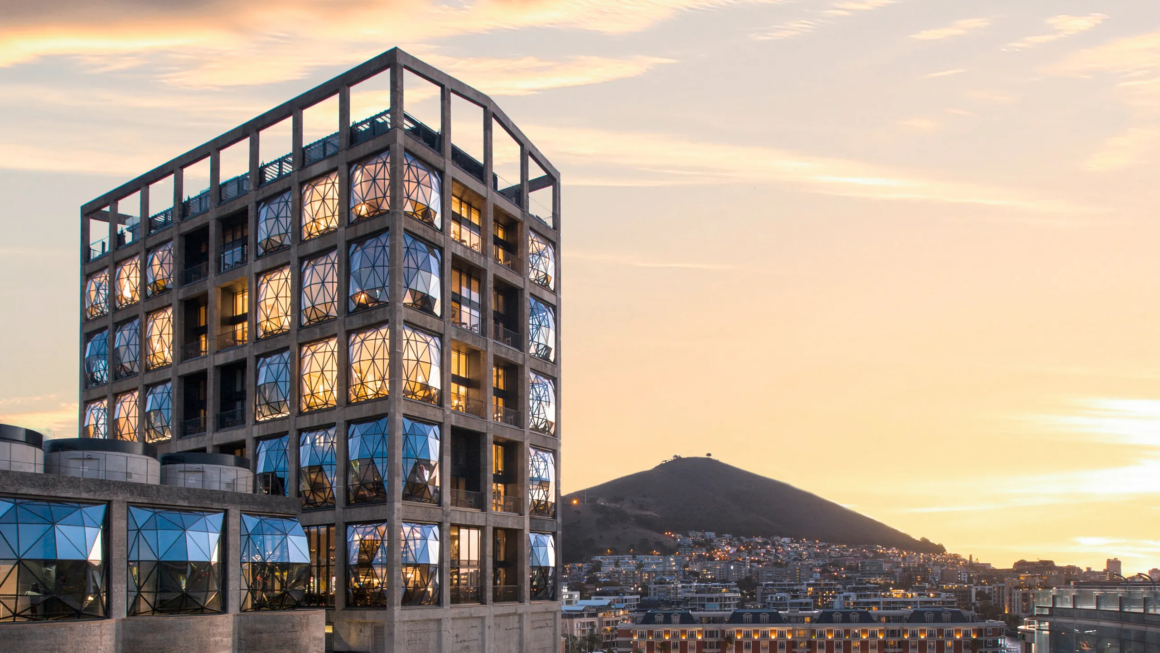
3. Museum of Black Civilizations, Dakar, Senegal
Opened in 2018, the Museum of Black Civilizations in Dakar is a groundbreaking institution that celebrates the contributions of African civilizations to world history and culture. The museum’s vast collection includes ancient artifacts, contemporary art, and exhibits on the African diaspora. Its mission is to reclaim and preserve Africa’s cultural heritage, making it a powerful symbol of Pan-Africanism and pride.
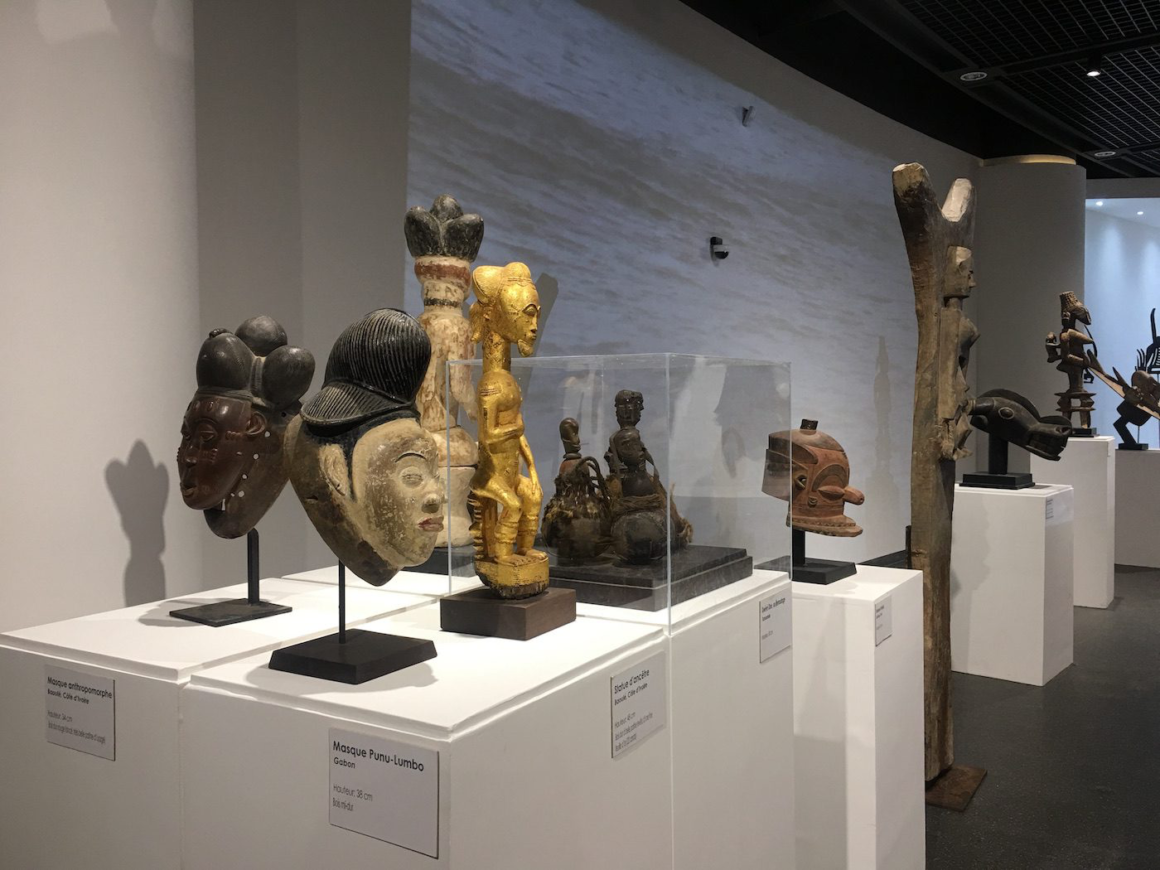
4.Ethnological Museum, Addis Ababa, Ethiopia
Located within the Institute of Ethiopian Studies at Addis Ababa University, the Ethnological Museum offers a deep dive into Ethiopia’s diverse cultures and traditions. The museum is housed in the former palace of Emperor Haile Selassie and features exhibits on Ethiopian religion, art, and daily life. Its collection of religious artifacts, traditional clothing, and handicrafts is particularly noteworthy.

5.Ghana National Museum, Accra, Ghana
The Ghana National Museum is one of the oldest museums in West Africa, established in 1957. It features a diverse collection of artifacts, including traditional Ghanaian art, ceremonial objects, and archaeological finds. The museum also highlights Ghana’s role in the transatlantic slave trade and its journey to independence, making it a vital institution for understanding the country’s history and culture.
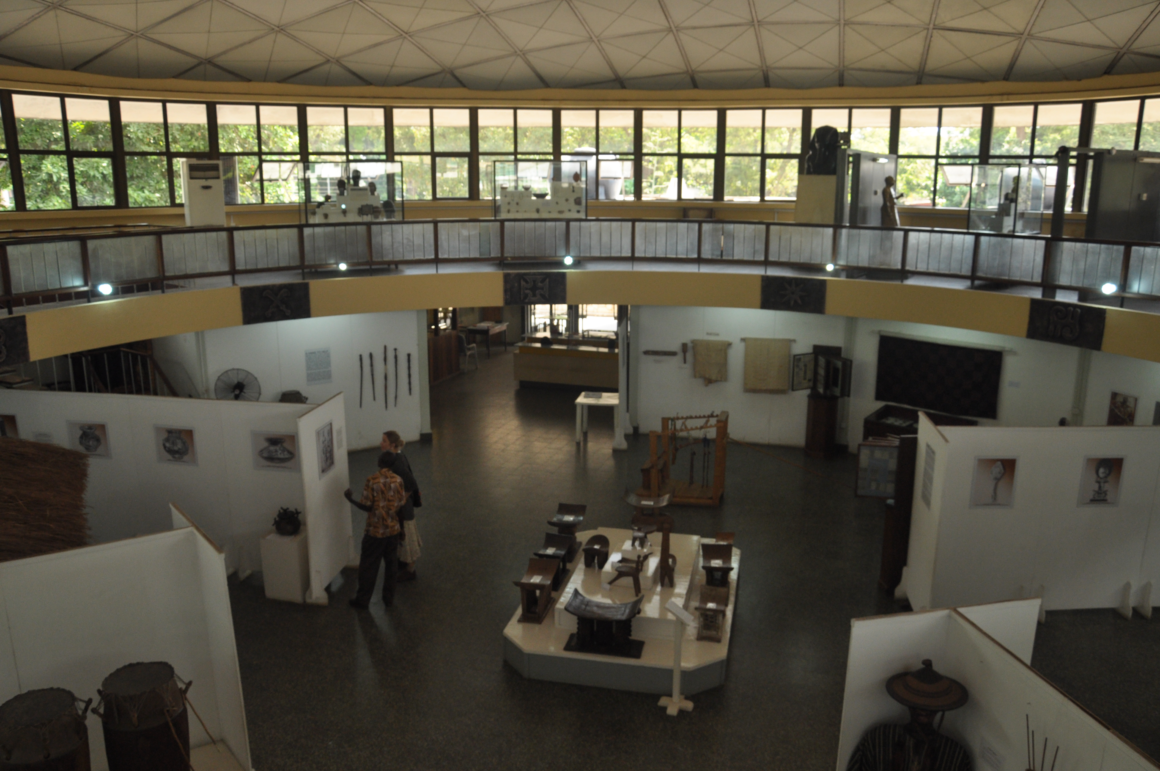

Foreign Affairs Minister Samuel Okudzeto Ablakwa has called on staff at the passport office to prepare for extended working hours, including day, night, and dawn shifts, as part of the government’s push toward a 24-hour economy.
During a visit to the passport headquarters in Accra, Ablakwa stressed the importance of reducing processing times, stating that applicants should receive their passports within one week of applying—a central objective of the ongoing reforms.
He also unveiled plans to introduce chip-embedded passports and integrate passport data with the National Identification Authority system to simplify the verification process for applicants.
Reiterating his commitment to modernizing the Foreign Affairs Ministry, Ablakwa announced plans to revise passport fees, aiming to lower costs for standard applicants while increasing fees for premium services.
“You have heard about the major reforms we are pursuing. Our goal is to transform the Passport Administration into a 24-hour operation,” he said.
“This year [2025], you must be ready and prepared. We will operate three shifts to significantly reduce passport waiting times. We believe that within a week, every Ghanaian should be able to obtain a passport after applying. The 24-hour economy initiative will make this possible,” he added.
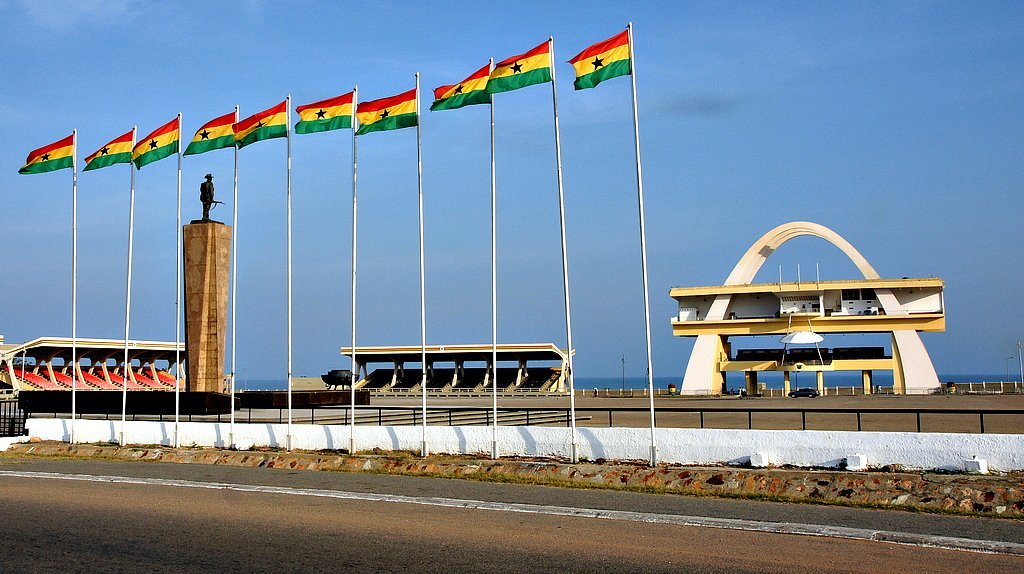
The resilient people of Ghana have witnessed yet another democratic milestone as the provisional results of the 2024 general elections pour in with John Mahama of the National Democratic Congress (NDC) leading with a significant margin, securing 58.56% of the votes and dominating 128 out of the 173 constituencies counted so far. This overwhelming result is not just a win for the NDC but a powerful statement from Ghanaians, echoing our frustrations, our hopes, and desire to change the notion of tribalistic voting in Ghana. We have proven that we see things for what they are and this just isn’t it!
For years, we as Ghanaians have faced mounting economic hardships, with inflation, unemployment, and a weakening cedi creating a heavy burden for everyday citizens. The New Patriotic Party (NPP), led by Mahamudu Bawumia, has struggled to convince the electorate, with their 39.57% vote share reflecting a significant drop in public confidence. We deem the NPP governance absolutely detached from the pressing realities of the everyday Ghanaian, marred by scandals, nonchalance and a lack of urgency in addressing core issues.
As the election approached, the general sentiment was clear: Ghanaians were desperate for a government that prioritized their well-being, tackled corruption, and charted a path toward economic recovery- WE ARE TIRED! For many, the election was less about endorsing one party and more about rejecting the other—a rejection of complacency, broken promises, and missed opportunities.
What Ghanaians Want: A New Direction
This election underscores a pivotal moment in Ghana's political landscape. While the NDC's victory signals a shift, it is also a reminder of the weight of expectations they carry. We did not just vote for a change in leadership but for tangible solutions to our problems. Citizens are calling for:
Economic Stability, Youth Empowerment, Transparency and Accountability, Community Engagement, and just someone who cares!
The Road Ahead: Challenges and Opportunities
For the NDC, this landslide victory comes with immense responsibility. While their win reflects dissatisfaction with the incumbent government, it is also a call to action. Mahama and his team must move beyond political rhetoric and deliver results that resonate with the daily lives of Ghanaians.
However, the path to recovery will not be easy. The nation faces a polarized political environment, economic challenges that require bold reforms, and a populace that is increasingly impatient for change. The NDC's ability to meet these challenges will define their legacy and shape Ghana's future.
A New Chapter for Ghana
As the celebrations unfold in NDC strongholds, the message from the streets is clear: Ghanaians are ready for a government that serves the people. This election is not just about victory; it is about renewal—a chance to restore hope, rebuild trust, and set Ghana on a course toward prosperity.
As Ghanaians, we have spoken with our votes. It’s time for our leaders to speak with their actions. Ghana deserves better, and we’re ready to see it happen. The 2024 elections mark the beginning of a new chapter, one filled with challenges, opportunities, and the undeniable resilience of a nation that never stops striving for better. For now, Ghanaians wait with bated breath, hopeful that this new light will bring the change we have long yearned

In the archetypal realm described in “Women Who Run with the Wolves”, Clarissa Pinkola Estés, describes the wild woman as representing an untamed, intuitive force that exists within all women, guiding them to uncover their strength, creativity, and resilience.
Chimamanda Ngozi Adichie, has consistently championed the idea of reimagining what society deems possible for women. I am very excited about the young Ghanaian girl having to witness the historic rise and incoming leadership of Ghana’s first female Vice President, Professor Jane Naana Opoku-Agyemang, —a tangible manifestation of the wild woman and feminist dream.
This moment is a reclamation of space and a signal to women everywhere that leadership is not a favor granted but a right earned through competence and vision. Professor Opoku-Agyemang’s ascension echoes Estés’ words: “To be strong does not mean to sprout muscles and flex. It means meeting one’s own numinosity without flinching.” For decades, women in Ghana and across the African continent have been preparing for this moment, carving out spaces in politics, education, and social justice movements despite cultural barriers and systemic opposition.
Like Adichie’s declaration in “We Should All Be Feminists”, this victory affirms that gender does not limit leadership potential. It pushes back against centuries of patriarchal structures that once relegated women to the margins. Professor Opoku-Agyemang, as a Vice President, represents the culmination of many quiet revolutions fought by women—mothers, farmers, educators, activists, and dreamers—who have always carried the potential to lead but were denied the platform.
In celebrating this moment, one cannot help but reflect on its implications for Ghana’s future. Professor Opoku-Agyemang stands not only as a capable leader but also as a role model for the next generation of girls. It’s a reminder of Adichie’s belief that “culture does not make people; people make culture.” By placing a woman in the second-highest office in the land, Ghana signals a willingness to rewrite the narrative, setting a precedent for what is possible for women in the highest echelons of power.
But is Ghana ready to take it further? In 2023, Tanzania made history with Samia Suluhu Hassan as its President, a reminder that women are not just capable of being second-in-command—they are equally qualified to lead. If Professor Opoku-Agyemang has shattered the vice-presidential glass ceiling, could Ghana soon break the ultimate barrier with its first female President?
As we celebrate this victory, I wonder if the nation, Ghana has begun to embrace the wild, untamed feminine power within its political landscape, prepare itself for a female presidency? Can the girl child now start dreaming bigger?
The answer lies in the hearts of everyday Ghanaians, whose aspirations and hopes will shape the path forward.
Power to the Girl Child! We see you Now!

Over the years, I have become very disinterested in Ghanaian politics as it perpetuates this very reality of not caring for its citizens at all, especially as we have seen with this current government. Not to claim them the only villains, especially when there’s a track record of this trend within the governance experienced by Ghanaians.
This would be the 4th time I would read the book “Why Nations Fail,” and this time around, very intentionally because I seek to understand why the trend is so. The book makes one thing clear: the success or failure of nations isn't because of geography or culture—it’s all about the systems we build. And when those systems work, are inclusive and give everyone a fair shot; there’s a likelihood of a better nation. However, when these systems fail to function effectively, they tend to exploit the majority in order to enrich a small minority.
This idea of *inclusive institutions* hits home for me. It’s not just some academic concept. It’s about creating spaces where people—regardless of where they come from, what they look like, or their gender—can thrive. That’s something we should all be passionate about. The belief in the power of inclusion, in building systems that uplift everyone, not just those with access to power or wealth. An inclusive Ghanaian system will fuel progress, growth, and equality.
Then, there are extractive institutions. These are the ones that, by design, take from the many to benefit a select few. It’s the same systems that allow people to amass wealth and power at the expense of others. That frustrates me because you can see how this has played out in real life in “our” Ghana. Whether it’s inequality in access to basic needs or the way voices are silenced, extractive systems keep people trapped. And the effects of these systems are felt everywhere, all over the country. Ghanaians are tired!
My hands tremble as I go closer to home, The *galamsey* issue in Ghana. Illegal mining isn’t just an environmental disaster—it’s a human one. The land of the people is being destroyed by the people with the higher ups because they’re desperate. The systems in place aren’t working for them. Instead of inclusive policies that provide economic opportunities, we’re left with extractive practices that hurt everyone in the long run. The water is polluted, forests are gone, and livelihoods are destroyed. It’s a perfect example of what happens when systems fail, and it’s heartbreaking because it doesn’t have to be this way. This is in no way to absolve the participants in this practice, but a hungry dog will always bark until it’s fed and, in this case, it’s whatever.
Reading *Why Nations Fail* makes us reflect on leadership and legacy. Real change doesn’t come from quick fixes or temporary solutions. It comes from creating systems that last, ones that allow people to rise and to thrive. This is the kind of impact we should desire to have—whether it’s through advocacy, policy, or simply how we individually choose to engage with the world. Leadership isn’t just about holding power; it’s about making sure that the systems you leave behind are fair and just, giving others the chance to succeed.
This piece seeks not to ridicule our leaders; there’s enough people doing that already. This is to us who still have the chance to change the narrative. It’s not just about the Ghana we see now; it’s about her people, the lives we lead, and the systems that either support or stifle us. It’s about how we can build a future where inclusion isn’t a luxury but a norm. And it’s a reminder that we all have a role to play in making that future a reality. I hope we are all able to evoke some hope in ourselves to make a better system soon. Even I, a novice knows this much.

The Neighbourhood Gong! Your favorite lifestyle magazine is here to bring you the stories, culture, and vibes you’ve missed. Stay tuned for all the buzz. We’re just getting started!
NeighbourhoodGong

Written by: Israel A. Norshie
When I first embarked on my career in Public Relations (PR) after completing my degree in marketing, I was captivated by the perceived prestige and glamour of the field. My initial experience left me envisioning a life filled with TV and radio interviews, writing press releases, sharp attire, attending elite functions with endless photo opportunities.
However, seven years into this journey, I’ve come to realize that PR is far more complex and demanding than I initially imagined. Today, I am a PR Specialist at Karpowership Ghana, a role I thank God for daily due to the opportunity it offers me to learn and grow.
I have learned that PR is a strategic, multifaceted profession that requires substantial groundwork before any glamour surfaces. It demands strategic thinking, thorough research, emotional intelligence, and exceptional people skills to truly excel.
I owe my progress to hard work and, more importantly, to the mentorship and guidance I’ve received. I am deeply grateful to my boss and mentor, Sandra Amarquaye – communications manager at Karpowership Ghana, for her invaluable teaching and nurturing.
Throughout my career, I have taken some memorable photos, attended elite events, and engaged in significant behind-the-scenes work. In this write-up, I aim to share some valuable lessons I’ve learned on this journey, spanning diverse industries, including consulting for top brands and institutions, education, and the energy sector - specifically Karpowership Ghana, an independent power-producing company whose operations impact both the macro and micro economy of our country.
Lesson 1: Be a Good Communicator
Mastery in both written and verbal communication is an essential lesson I have picked up along the way. I have learned to craft clear, engaging, and persuasive messages, and effectively identify suitable channels and deliver them to various audiences. As John Powell puts it, "Communication works for those who work at it." I have learned to work on improving my communication, and it's working for me.
My baptism of fire was when a major event we were to host almost got cancelled due to a lack of clear communication regarding venue bookings. I erred by not connecting and communicating with all stakeholders together. But through clear communication and proactiveness, our team resolved the issue and we proceeded to have a beautiful event. I have since learned to communicate using the right channels, connecting stakeholders while doing so.
In PR, this skill is indispensable, as it involves not only crafting messages but also listening, connecting and responding appropriately to stakeholders.
Lesson 2: Building and Managing Relationships
Building and maintaining strong relationships with all stakeholders matters most - the community, opinion leaders, journalists and influencers. This involves understanding their needs, listening to them, pitching relevant stories, and securing positive media coverage for my company.
Overtime, media persons have been one of our trusted sources of information on upcoming happenings as well as the people who give us positive publicity. Their timely tip-offs on steaming stories before it hits mainstream media have helped us better prepare to engage and respond.
I remember how a call to one community leader ended our team's stress and efforts to get about 100 stakeholders under one roof for a crucial engagement. More importantly our stakeholders have given my company the social license to operate in the community and be profitable due to the win-win relationship we have cultivated through continuous community and stakeholder engagements.
Lesson 3: Strategic Thinking
Strategic thinking has been instrumental in our positioning and in crafting PR initiatives that effectively address specific needs and challenges. Through brainstorming and creative thinking, we have gained a deep understanding of our organization's goals, identified key stakeholders for partnership, and addressed stakeholder concerns with initiatives. This process has allowed us to develop initiatives that align with broader business objectives and deliver impactful solutions over time.
Our organization has established strategic partnerships and collaborations with reputable organizations and government agencies to execute meaningful and significant projects. One such example is our Girl Power Initiative which mentors and supports girls in engineering while encouraging high school students to pursue engineering courses. Along with scholarship programs and other projects, our initiatives are strategically aligned with SDG goals 4 and 5 which are significantly benefiting our stakeholders. The overwhelmingly positive feedback highlights the success of our strategic approach and the valuable partnerships we have cultivated.
Lesson 4: Agility
In a fast-paced work world, one needs to understand and be ahead of trends, ready to adjust and incorporate them into thinking and decision-making. Flexibility with our events and plans has saved us a great deal, as a little tweak in plans has yielded tremendous results to our benefit. Being ahead of the trends also placed us in a well-informed position to better advice management on trends and happenings.
Public Relations is constantly evolving, as is our audience. To excel and stay relevant, continuous learning is essential. Staying updated with industry trends and best practices keeps us ahead of the curve and enhances our ability to connect with our audience. Prioritizing ongoing education ensures our strategies remain innovative and impactful, giving us a competitive edge in the dynamic PR landscape.
The introduction of AI has shifted a lot of things, and as an organization, we have embraced it and are using the invention to augment our work. We believe that AI can't take our jobs but will help us do our jobs best if we learn how to use it.
Lesson 5: Be Good at Research and Analysis
Conducting thorough research and analysing data to understand industry trends, audience behaviour, and the effectiveness of PR initiatives is important. Research has been the backbone of our initiatives at Karpowership Ghana, as our community assessments have pointed the organization to well-meaning projects like school renovations, timely donations and community support and empowerment programs for community dwellers.
Analysing data and feedback to make meaning has helped in communicating the impact of our projects, crafting our reports and identifying well-performing initiatives which have saved us time and resources. In Neil Armstrong's words, "Research is creating new knowledge." This new knowledge has helped us in making informed decisions backed by data overtime.
I have grown not only as a PR professional but as an individual. As I continue to navigate this dynamic field, I remain committed to excellence, ethical conduct, and the relentless pursuit of knowledge.
In the words of my mentor, Sandra Amarquaye, "Success in PR is not just about being seen; it's about making impact and being remembered for the right reasons."
By sharing these insights, I hope I have shed light on some of the things a PR career entails and inspired the next generation of PR professionals to strive for excellence beyond the surface.
The writer is a PR specialist with Karpowership Ghana, a member of IPR Ghana and a Chartered member - CIM-UK.

Therapy is a means to manage our mental health, and it can be quite beneficial in specific situations. We see doctors and dentists, and some of us even pay for personal trainers, so why not do the same for our mental health? There is still some stigma linked to therapy, and while more people recognize the value of mental health, many have yet to give it a try.
Why People Refuse to Go to Therapy
In a world where mental health is increasingly recognized as crucial to overall well-being, many still hesitate to seek therapy. Here are some common reasons people refuse to go to therapy:
Despite progress, the stigma surrounding mental health issues persists. Many fear being labeled as "weak" or "crazy" if they admit to needing help, leading them to avoid therapy altogether. This societal pressure can make it difficult for individuals to seek the support they need.
Therapy can be expensive, especially without insurance coverage. The financial burden of regular sessions deters many from seeking help, as they prioritize other expenses over their mental health.
Therapy requires openness and honesty about one’s deepest thoughts and feelings, which can be intimidating. Many fear being judged or misunderstood, leading them to avoid the process entirely.
Some people believe that therapy is only for those with severe mental illnesses or that it involves lying on a couch while a therapist silently takes notes. These misconceptions can discourage individuals from seeking help, as they don't see therapy as relevant to their situation.
Cultural and religious backgrounds can significantly influence attitudes toward therapy. In some cultures, seeking outside help for personal issues is frowned upon, with individuals encouraged to rely on family or spiritual guidance instead.
A past negative experience with therapy can leave a lasting impression, making someone hesitant to try again. If a person felt that a therapist was unhelpful or didn’t understand their needs, they might believe all therapy will be the same.
Many people believe they should be able to handle their problems on their own. This belief in self-reliance can prevent them from reaching out for the support that could help them navigate their challenges more effectively.
Life is busy, and finding the time for regular therapy sessions can seem impossible. Between work, family, and other commitments, therapy may feel like an unmanageable addition to an already packed schedule.
Some individuals may not recognize that they have an issue that could benefit from therapy. Denial is a powerful barrier, as it prevents people from acknowledging their struggles and seeking the help they need.
Therapy often involves confronting uncomfortable truths and making changes, which can be daunting. The fear of the unknown and the discomfort of change can keep people from starting therapy, even if they know it could help them in the long run.
Understanding these barriers is essential in encouraging more people to seek the mental health support they need. By addressing these concerns, we can help break down the barriers to therapy and promote a healthier, more open society.

Choosing Your Market & Timing the Investment Wisely
Successful real estate investment hinges on understanding your local market more than just the national trends. The factors influencing your specific area will play a crucial role in the success of your investment. It's wise to avoid overly hot markets where property prices are soaring, as you risk buying at a peak and potentially losing money.
Real estate markets move in cycles due to the pursuit of economic gains, and each market is at a different stage in its housing cycle. Look for markets in the expansion phase, where sales and prices are increasing, affordability remains good, construction is low, and capital investment is on the rise. The specific market you're in should guide your investment approach, particularly since peak construction often happens after peak housing demand, leading to oversupply and lower prices for a period, typically lasting 1-3 years until a price floor is established.
To thrive in real estate investment, focus on properties in neighborhoods with high population density, ongoing development, and essential amenities nearby. High-demand neighborhoods typically share these characteristics:
These factors contribute to high housing demand. When supply matches this demand, investors should seize the opportunity while entry prices are still reasonable. Avoid areas that rely on a single economic driver, like the tourism or auto industry, as these can lead to significant declines in property values if the local economy falters, as seen in Detroit when the auto industry declined.
Buy Low
Investing in real estate is similar to investing in dividend-paying stocks—the return on investment depends largely on how cheaply you acquire the property. However, you must also consider the potential return. A low-cost house in a risky neighborhood may be inexpensive, but it won’t generate much income either.
Tap into the Hidden Market
The best deals come from buying properties from distressed sellers, often well below market value. Instead of looking at foreclosure auctions, which can yield properties in poor condition, target sellers who need to sell quickly but haven't listed the property yet. Situations like divorces or families selling a deceased relative's home often present opportunities to buy well-maintained properties at a discount.
Understand Your Costs Upfront
If you're new to real estate investment, it's crucial to understand all the costs involved. These go beyond just the purchase price and realtor commissions. You'll need to account for repairs, which many beginners underestimate. Costs to fix structural issues, electrical problems, or pest infestations can quickly add up. DIY repairs often reduce the property’s value, especially if they don't meet code requirements. Don’t forget to budget for closing costs, insurance, and utilities, or you might end up losing money on the deal.
Understand the Market
A thorough understanding of your local real estate market helps you evaluate the true value of investment properties. Know the average price per square foot and potential rental income in the area. Renovate properties to appeal to likely buyers; for instance, avoid reducing bedroom counts in family-oriented neighborhoods or sacrificing closet space for features that won't be appreciated by the target market. Focus on real estate markets with strong growth, like metro Atlanta, where demand has led to substantial increases in home values in recent years.
Manage Your Risks in Real Estate Investment
Risk management is key to successful real estate investment. Avoid taking on too much debt; aim to put at least 10% down on an investment property, with 20% being ideal to eliminate private mortgage insurance and secure a lower interest rate. Maintain a substantial cash reserve to avoid the need to sell a property quickly at a loss and to cover unexpected repairs. Don’t be afraid to pass on a deal if the numbers don’t add up, and never fall in love with an investment property—remember, you’re not the one living there.
Go for "Best in Class" – Not "The Best"
A common mistake in real estate investment is trying to make a property the best in the area, which can lead to overbuilding and losing money. Instead, aim for "best in class" touches, such as fixing what's broken and adding small but impactful upgrades. Avoid expensive renovations that won’t yield a good return in the given market.
Maximize the Value of Real Estate
Look for ways to increase the value of your investment property, such as renting out underutilized space or offering value-added services like trash pickup or security in apartment complexes. Another approach is to create turnkey rental properties by renovating and leasing the property before selling it to another investor.
Know the Rules and Regulations of Real Estate Investment
Always be aware of local regulations before making changes to a property, such as adding rental units, converting spaces for commercial use, or making significant renovations. Understanding what’s allowed can save you from costly mistakes.
Consider Non-Traditional Real Estate Investments
Real estate investment isn’t limited to single-family homes or apartment buildings. You can also invest in office buildings, storage units, industrial spaces, and warehouses, all of which can generate rental income. In some cases, a triple-net lease can reduce costs by having the tenant cover insurance, property taxes, and maintenance, providing a steady cash flow with minimal out-of-pocket expenses.
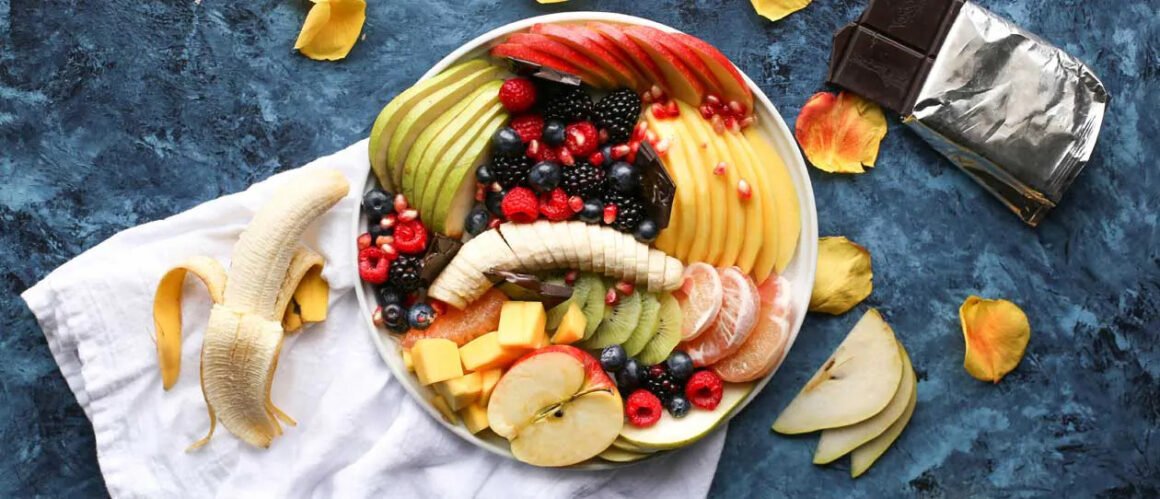
An essential and frequently disregarded component of a nutritious and well-balanced diet is fiber. In addition to being necessary for a healthy digestive tract, fiber can help shield you against cancer and heart disease. Moreover, it can raise blood sugar levels and reduce cholesterol.
Adequate dietary intake of 25-30 grams of fiber is crucial. To increase your consumption of fiber in a straightforward and healthful way, consider some of the suggestions provided in the picture. Naturally, don't implement all of them at once; instead, make tiny adjustments gradually and strive to stick to the suggested daily allowance.
1.Apples
Apart from the well-known health advantages of eating a diet high in fruits and vegetables, apples are a good source of soluble fiber called pectin.
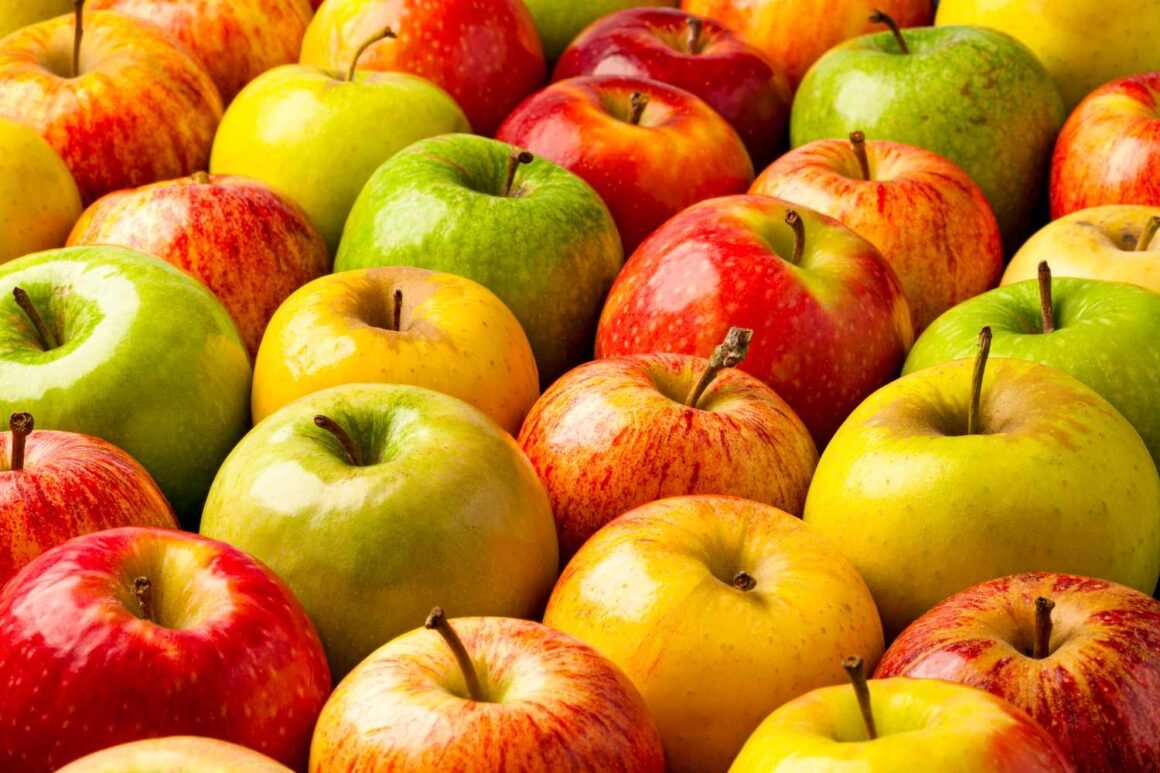
2.Yogurt
A good approach to increase your intake of fiber is to top your cereal with yoghurt, fruit, nuts, and seeds.

3.Salad
Beans, a fantastic source of fiber and protein, may give a salad body and taste. Try chickpeas, cannellini beans, white beans, or black beans.

5.Beans
Experts in health and the environment stress the need to reduce meat intake, and beans provide a great alternative. Why not try replacing the beans in your favorite dish with meat instead? Meat is full of fiber and protein.
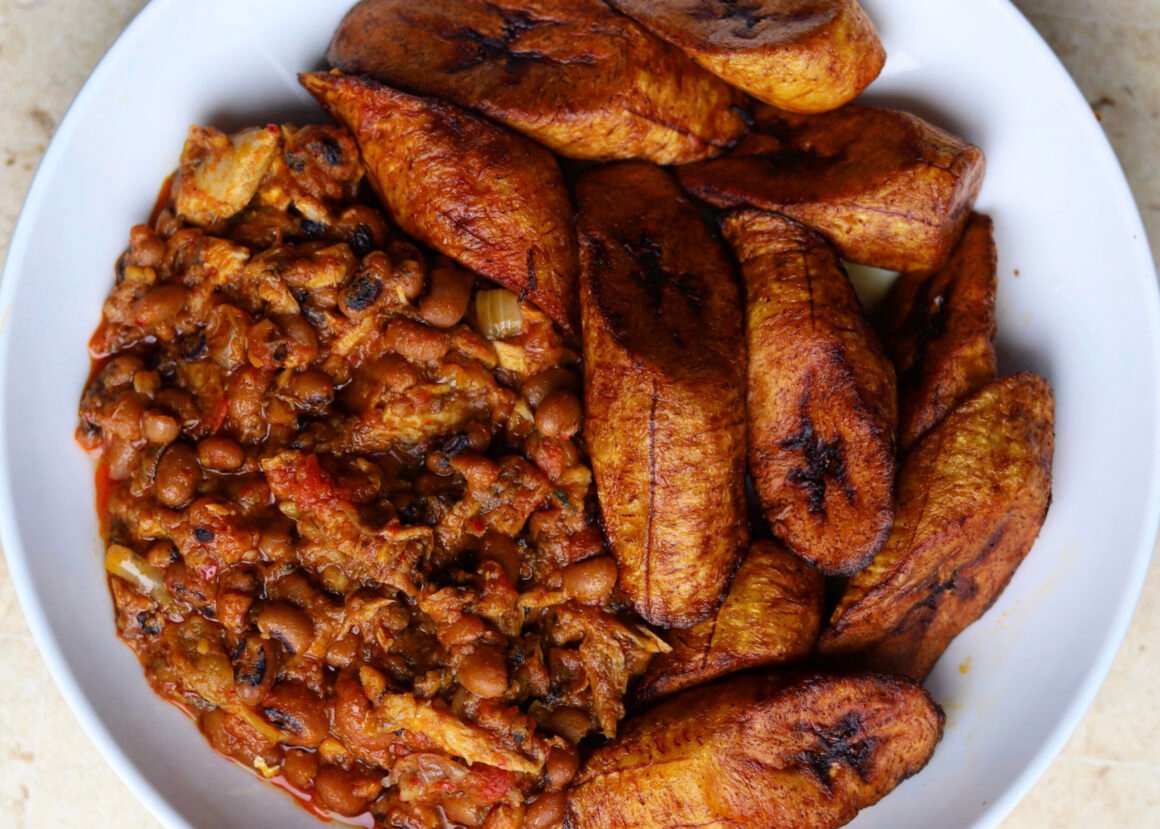

It's kind of weird, when you think about it, living at work. For the most part of our life, many of us are surrounded by people that we might never hang out with if we weren't employed by the same organization. While things don't always go as planned, they don't always. It should come as no surprise that we don't always agree because we all have distinct personalities, goals, and drives.
Fortunately, there are things we can do to ease the situation when conflict does emerge at work. See this gallery for suggestions on how to defuse tense situations at work.
1.Try striking up a casual discussion.
Try bringing up the subject in casual conversation first if you know that a specific thought or situation would probably make someone angry.
2.Ensure they are informed
If someone receives regular and insightful status updates, they will frequently feel better and be more adaptable to change, even if they are a control freak.
3.Be patient with others.
Understanding a colleague's motivation might help you better comprehend their behavior that is producing stress, just like in any human interaction.
4.Challenging limits
Setting up personal boundaries and enforcing them when the other person breaches them can be incredibly beneficial when dealing with toxic behavior.
5.Have trust in the process
Trusting the HR process is not a sign of weakness; in many situations, it's the best course of action. If someone's behavior is creating an excessive amount of stress, don't be afraid to discuss it with HR.

A new survey builds on previous research, showing that student engagement isn't just key to ensuring they attend class, behave well, and stay on track academically—it’s also crucial for helping them maintain a positive outlook on their future.
The downside: Many students don’t find their schoolwork interesting, challenging, or aligned with their interests and talents. This is especially true for those who don’t plan to attend college, according to the survey conducted by the Walton Family Foundation and Gallup.
This survey, conducted between April 26 and May 9, included 4,157 Generation Z respondents (ages 12-27), with 2,317 of them currently enrolled in K-12 schools. It’s the second edition of the survey, with the first released in 2023.

The findings come as school districts prepare for a new academic year and continue to address ongoing challenges like chronic absenteeism, which has worsened since pandemic-related school closures, and the persistent academic struggles that followed historic declines. All of these issues are connected to how engaged students feel in their classes and with their peers.
The Walton and Gallup survey suggests a strong link between student engagement and their optimism about the future. Less than 2 in 10 students “strongly agree” that what they’re learning in class is important or relevant. However, those who rate their engagement highly are more than twice as likely to feel they are thriving in life. Engaged students are also over four times as likely to “strongly agree” that they have a bright future ahead, according to the survey.
Generation Z is generally optimistic about the future, with 79 percent of respondents believing they have a bright future. But only about half feel prepared for it.
Students not planning to attend college (68 percent) are less likely to have a positive outlook on their future compared to those aiming for an associate (81 percent) or bachelor’s degree (86 percent). Non-college-bound students also feel less prepared for their future (40 percent) than those planning to pursue an associate degree (45 percent) or bachelor’s degree (54 percent), according to the survey.
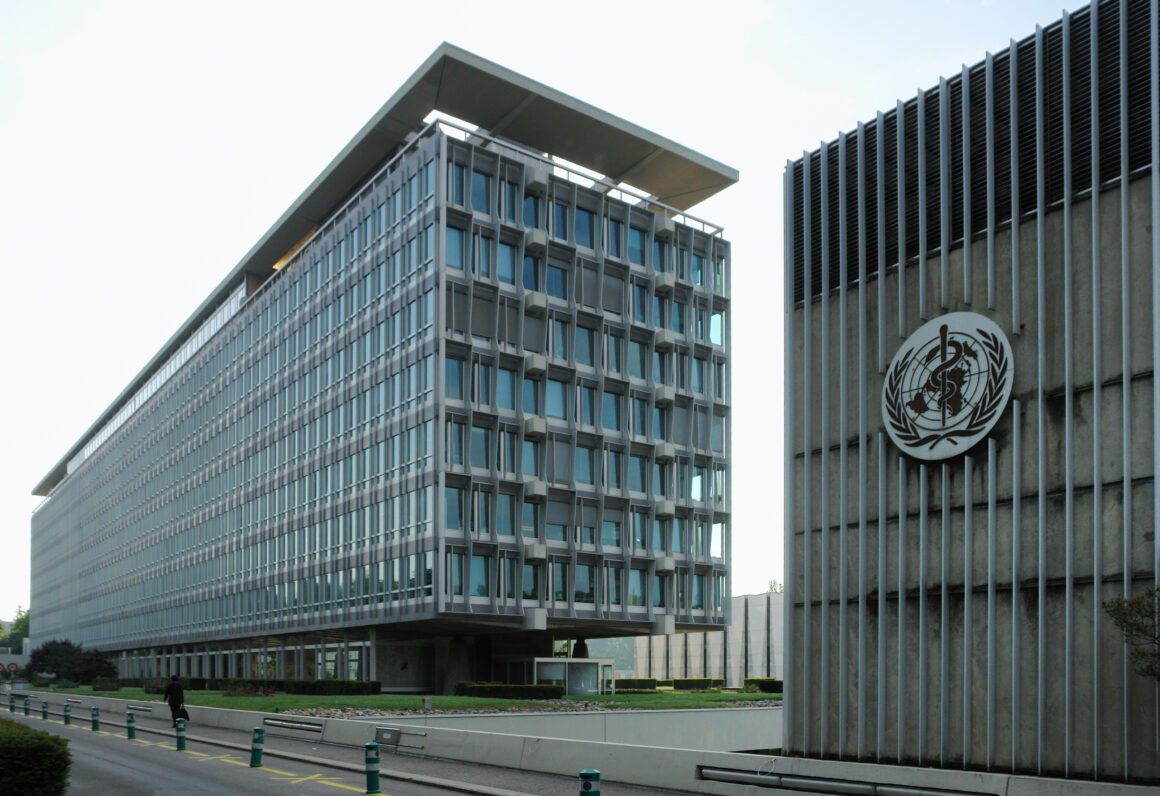
Since the start of 2024, the African region has been experiencing a significant surge in mpox cases, with more countries that previously had no cases now reporting infections. The World Health Organization (WHO) has elevated its response to the highest level, requiring a full-scale effort across the organization. WHO Director-General, Dr. Tedros Adhanom Ghebreyesus, has also called for an emergency meeting of experts to determine if this outbreak should be declared a Public Health Emergency of International Concern.
Currently, 15 African countries are facing a mpox outbreak, with a total of 2,030 confirmed cases and 13 deaths so far this year. This is a sharp increase compared to 1,145 cases and seven deaths in the entire year of 2023. Four countries – Burundi, Kenya, Rwanda, and Uganda – which had not reported mpox cases before, have seen infections since mid-July 2024. In the Democratic Republic of the Congo, which accounts for over 90% of the cases, a new variant of the virus, first identified in September 2023, is spreading in the eastern region. Rwanda and Uganda have also reported cases of this new variant, with Kenya confirming cases as well. Burundi is still investigating to determine if their cases are linked to this variant.
Dr. Matshidiso Moeti, WHO's Regional Director for Africa, emphasized the urgent need to stop the virus from spreading. WHO is working closely with partners to support countries in strengthening their outbreak control efforts and ensuring that communities play a central role in these efforts.
The spread of mpox varies across the region. In the eastern Democratic Republic of the Congo, the new variant, known as clade 1b, is spreading mainly through sexual contact and due to high population movement. In South Africa, most cases are reported among men who have sex with men. In West and Central Africa, the transmission is linked to the global outbreak of 2022. WHO is conducting further analysis to better understand these transmission patterns and improve the response to the outbreak.
WHO is working on multiple levels, from global to local, collaborating with partners like the Africa Centres for Disease Control and Prevention. They are supporting national authorities to strengthen critical response areas such as disease surveillance, testing, clinical care, and infection prevention. Efforts are also being made to improve access to treatments, decentralize laboratory services, and increase community awareness about the risks of the disease.
In affected and at-risk countries, field investigations and active case finding are being intensified. WHO is also enhancing contact tracing efforts, using knowledge from previous outbreaks to ensure that interventions meet the needs of key populations. Additionally, WHO is mobilizing financial resources to help countries effectively respond to the outbreak.

To accelerate the availability of vaccines, treatments, and diagnostics, WHO is advancing the Emergency Use Listing Procedure. The organization is working with countries to develop vaccination strategies and plans, aiming to roll out vaccines as soon as they become available. While vaccines are an important tool, they are just one part of the broader public health strategy to control mpox.
Mpox spreads from animals to humans, often in areas close to tropical rainforests where the virus-carrying animals live. It can also spread between humans through contact with bodily fluids, skin lesions, respiratory droplets, and contaminated objects.
Treatment for mpox is mainly supportive, focusing on relieving symptoms. Various treatments are being developed and tested. Prevention and control efforts rely on raising community awareness and educating health workers to prevent infection and stop the virus from spreading.unities and educating health workers to prevent infection and stop transmission.
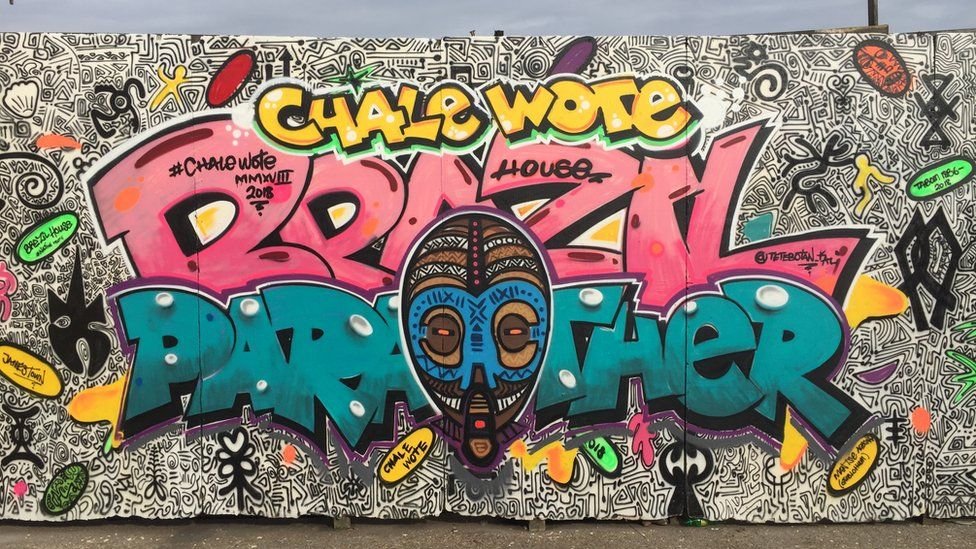
Ghana's biggest annual street art festival, Chale Wote, is just around the corner, with the main event set for August 2024. Preparations are already in full swing, and the organizers, ACCRA [dot] ALT, along with Redd Kat Pictures and the Chale Wote Street Art Projekt, have opened up applications for artists who want to join the celebration this year.
This thirteenth edition of the festival is themed “And Now An End To The Empire Of Horrors,” taking inspiration from Africa's rich history, particularly the tales rooted in the Gulf of Guinea. Chale Wote 2024 will focus on these fascinating stories of gods and mortals, which serve as powerful allegories of the social conditions shaped by brutal colonialism.
The festival will dive deep into the history of the Gulf of Guinea, exploring its origins, its decline, and the current revival of long-forgotten sacred practices. Through art and entertainment, Chale Wote will showcase a variety of narratives about this rebirth in the most spectacular ways.
If you're an artist with at least two years of professional experience and a strong commitment to your craft, you're welcome to apply. You don't need formal art education—self-taught artists with consistent experience are encouraged to apply as well.
Artists can propose works in any medium, with no restrictions on form or content. The organizers are looking for innovative pieces that demonstrate a deep understanding of contemporary art, craft, or design. Importantly, all proposals should be site-specific, tailored for the Osu metropolitan area during Chale Wote 2024.
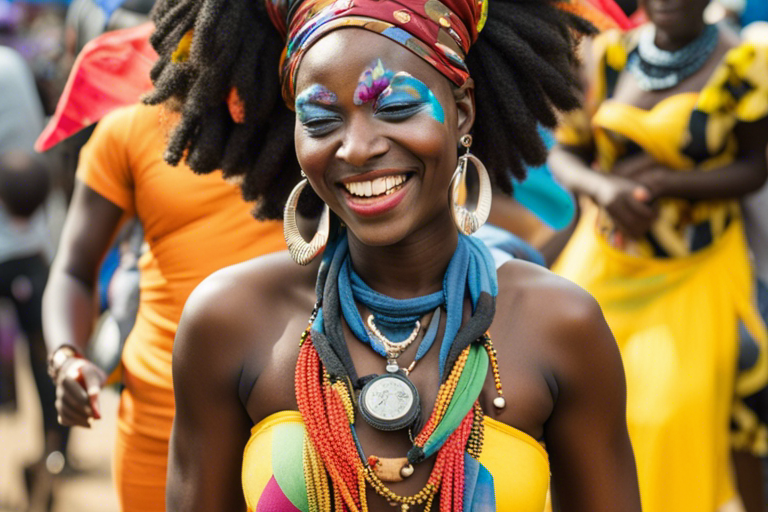
Your concept could be anything from an intervention, live performance, installation, video, photography, painting, sculpture, performance art, theatre, dance, or even a new form you've imagined. The key is that the work should be suitable for public spaces and engage both intentional and incidental audiences.
In line with their passion for art education, the organizers are also interested in works that can be adapted into workshops or knowledge-sharing sessions for children and youth during the festival.

The one-week festival will run from Monday, August 19, to Sunday, August 25, 2024. Selected artists will need to have their works ready between August 10 and 18, so everything is set for display from the start of the festival right through to its grand finale.

Ghana, located on the west coast of Africa, is known for its diverse and breathtaking natural landscapes. One of the country's most captivating features is its numerous waterfalls. From cascading streams to powerful torrents, Ghana's waterfalls offer visitors a chance to witness the raw beauty of nature. In this article, we will explore some of Ghana's most notable waterfalls.
1. Wli Waterfall
Located in the Volta Region of Ghana, Wli Waterfall is the highest waterfall in the country and one of the most popular tourist attractions. The waterfall is nestled within the lush greenery of the Agumatsa Wildlife Sanctuary, creating a picturesque setting. With a height of about 80 meters (262 feet), Wli Waterfall is an impressive sight to behold. Visitors can take a hike through the forest to reach the waterfall, enjoying the rich biodiversity along the way. The area surrounding Wli Waterfall is also home to various bird species, making it a paradise for birdwatchers.
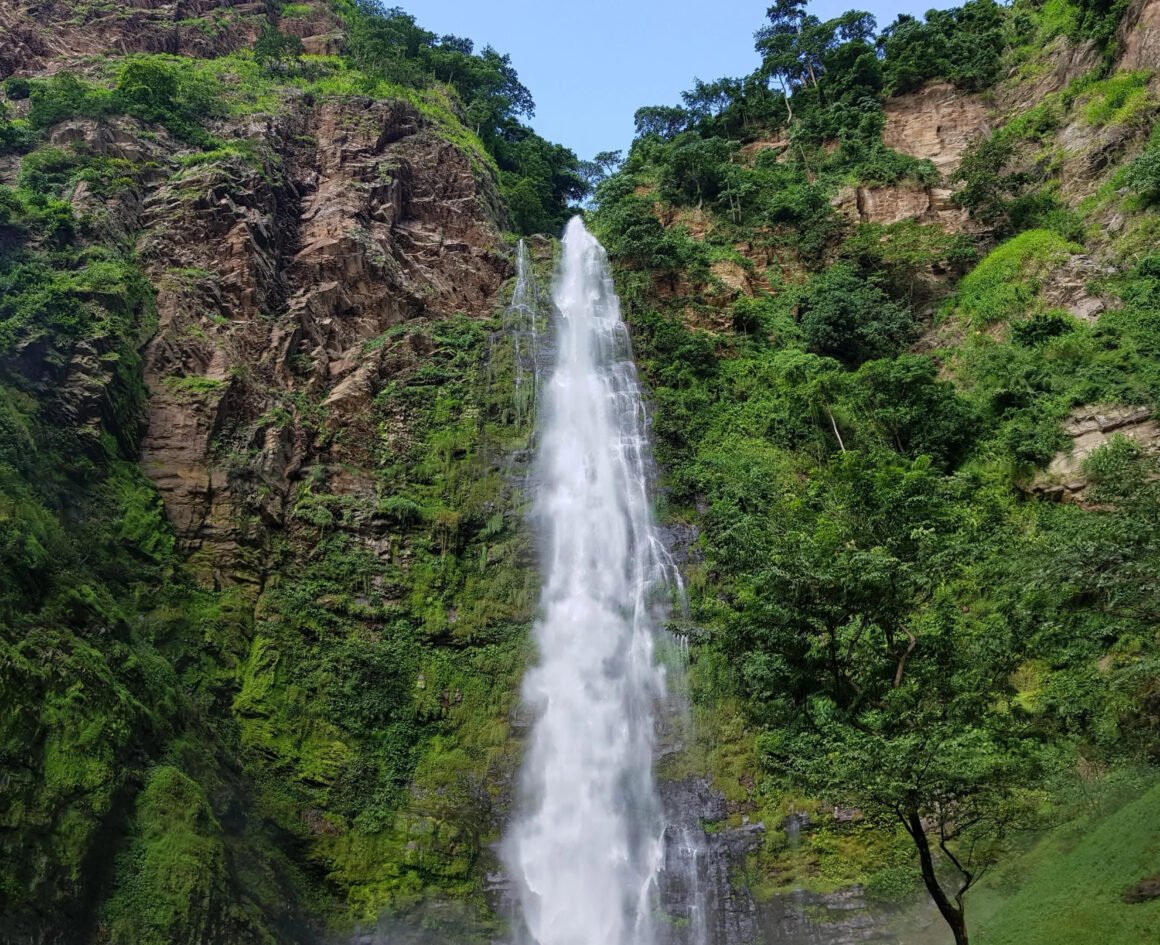
2. Boti Falls
Situated in the Eastern Region of Ghana, Boti Falls is another must-visit waterfall in the country. This twin waterfall consists of two streams that flow side by side before plunging into a pool below. The falls are surrounded by dense vegetation and offer a serene and tranquil atmosphere. Boti Falls holds cultural significance for the local people, as they believe it is inhabited by ancestral spirits. Visitors can take a refreshing dip in the pool or explore the nearby umbrella rock formation, which resembles an open umbrella.

3. Kintampo Waterfalls
Located in the Brong-Ahafo Region, Kintampo Waterfalls is a magnificent sight that attracts both locals and tourists alike. The waterfall stretches over 70 meters (230 feet) wide and cascades down from a height of about 25 meters (82 feet). The surrounding area is adorned with lush greenery, creating a soothing ambiance. Visitors can swim in the pool at the base of the falls or take a leisurely stroll along the well-maintained trails. Kintampo Waterfalls is also known for its unique rock formations, which add to its natural charm.

4.Fuller Falls
Situated in the Ashanti Region of Ghana, Fuller Falls is a hidden gem that offers a tranquil escape from the bustling city life. This waterfall is named after Thomas Fuller, an African American missionary who settled in the area in the 19th century. The falls cascade down a series of rocky steps, creating a mesmerizing sight. The surrounding landscape is adorned with lush vegetation, providing a serene and peaceful atmosphere. Visitors can enjoy picnicking near the falls or take a refreshing dip in the pool below.
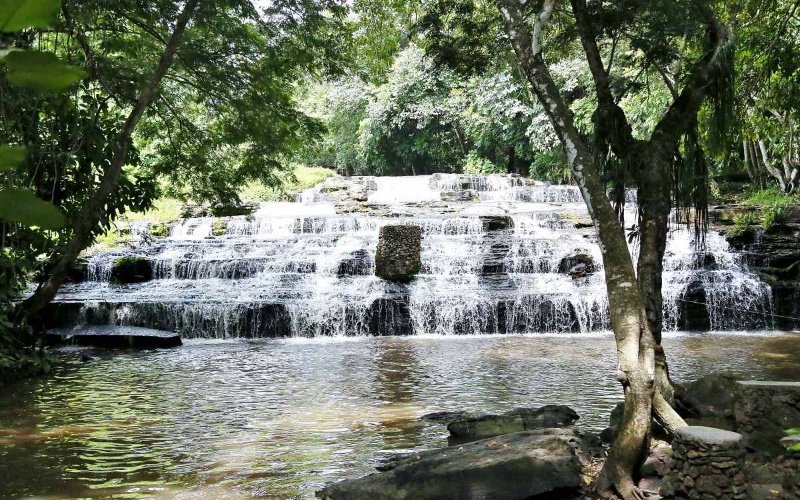
5.Akaa Falls
Located in the Eastern Region of Ghana, Akaa Falls is a lesser-known waterfall that offers a secluded and peaceful experience. The falls are surrounded by dense forest and can be reached by taking a short hike through the wilderness. Akaa Falls cascades down from a height of about 20 meters (66 feet) into a crystal-clear pool below. The serene atmosphere and untouched beauty make it an ideal spot for nature lovers and photographers.
Located in the Eastern Region of Ghana, Akaa Falls is a lesser-known waterfall that offers a secluded and peaceful experience. The falls are surrounded by dense forest and can be reached by taking a short hike through the wilderness. Akaa Falls cascades down from a height of about 20 meters (66 feet) into a crystal-clear pool below. The serene atmosphere and untouched beauty make it an ideal spot for nature lovers and photographers.
Ghana's waterfalls not only provide breathtaking views but also offer opportunities for adventure and relaxation. Whether you are seeking an adrenaline rush from hiking to Wli Waterfall or looking for a peaceful retreat at Boti Falls, Ghana's waterfalls have something to offer everyone.
In conclusion, Ghana's waterfalls are natural wonders that showcase the country's rich biodiversity and stunning landscapes. From the towering heights of Wli Waterfall to the cultural significance of Boti Falls, each waterfall has its own unique charm. Whether you are an adventure seeker or simply looking for a serene escape, exploring these waterfalls will undoubtedly leave you in awe of Ghana's natural beauty.


Mobius Motors, a Kenyan automaker, has closed. The company was established in 2010. Playfair Capital-backed Mobius Motors, a Kenyan automaker, has decided to liquidate the business following a year of unsuccessful attempts to preserve it. The company has recently struggled to pay staff members as well as pay suppliers and creditors, which has resulted in a mound of debt.

By Christabell Eyram Ocran
Pilates is taking the fitness world by storm, offering women a perfect blend of strength, flexibility, and mindfulness. This low-impact workout, once exclusive to athletes and dancers, now appeals to women of all ages and fitness levels.
Why the buzz? Pilates works wonders for both body and mind. With its focus on controlled movements and deep breathing, it's a total package for physical and mental well-being.
From Reformer to Mat Pilates, there's a style for everyone. The perks? A stronger core, better flexibility, and improved posture – hello, graceful movements!
But wait, there's more! Pilates sharpens mental clarity and reduces stress. It's not just a workout; it's a lifestyle that boosts confidence and contentment.
So, ladies, ready to join the Pilates party? Roll out that mat and discover why this trend is here to stay. Your body and mind will thank you!

By Prince Tony Anaman
1. Start Your Day with a Stretch Begin each morning with a gentle stretch to wake up your muscles and get your blood flowing. It helps improve flexibility, reduces tension, and sets a positive tone for the day. Even just 5-10 minutes of stretching can boost your mood and energy levels.

2. Incorporate Daily Walks Make it a habit to go for a 20-30 minute walk every day. Walking not only strengthens your heart and muscles but also gives you time to clear your mind. Try to walk in nature if possible, as it’s proven to reduce stress and improve mental clarity.

3. Practice Mindful Breathing Take a few minutes each day to focus on your breathing. Deep, mindful breaths help calm your nervous system and can be a quick way to reduce stress. It’s a simple practice you can do anywhere—whether you’re at work, home, or even in the car.
4. Stay Hydrated Drink plenty of water throughout the day to keep your body hydrated. Proper hydration supports physical performance and aids in maintaining a clear mind. Carry a water bottle with you as a reminder to sip regularly.

5. Prioritize Sleep Aim for 7-8 hours of quality sleep each night. A good night’s sleep is essential for muscle recovery, cognitive function, and emotional well-being. Create a calming bedtime routine to help your body wind down and prepare for rest.
6. Eat Balanced Meals Focus on eating a variety of fruits, vegetables, lean proteins, and whole grains. A balanced diet fuels your body with the necessary nutrients to perform physically and mentally. Try to eat at regular intervals to keep your energy levels steady throughout the day.

7. Engage in Regular Exercise Find a physical activity you enjoy and make it a regular part of your routine, whether it’s yoga, swimming, or weightlifting. Consistent exercise boosts your physical fitness, releases endorphins, and improves your mood. Start small and gradually increase the intensity as you become more comfortable.
8. Practice Gratitude Take a moment each day to reflect on what you’re grateful for. This simple practice can shift your mindset, making you more positive and resilient. Writing down a few things you’re thankful for can also help improve your overall mental well-being.
9. Connect with Others Build and maintain relationships by spending time with family, friends, or even joining a community group. Social connections are key to emotional health and can provide support when you need it. Make an effort to reach out and engage with others regularly.
10. Take Time for Yourself Dedicate some time each day for activities you enjoy, whether it’s reading, gardening, or listening to music. Personal time helps recharge your mind and body, reducing stress and improving overall well-being. Remember, it’s okay to prioritize your needs and make self-care a daily habit.
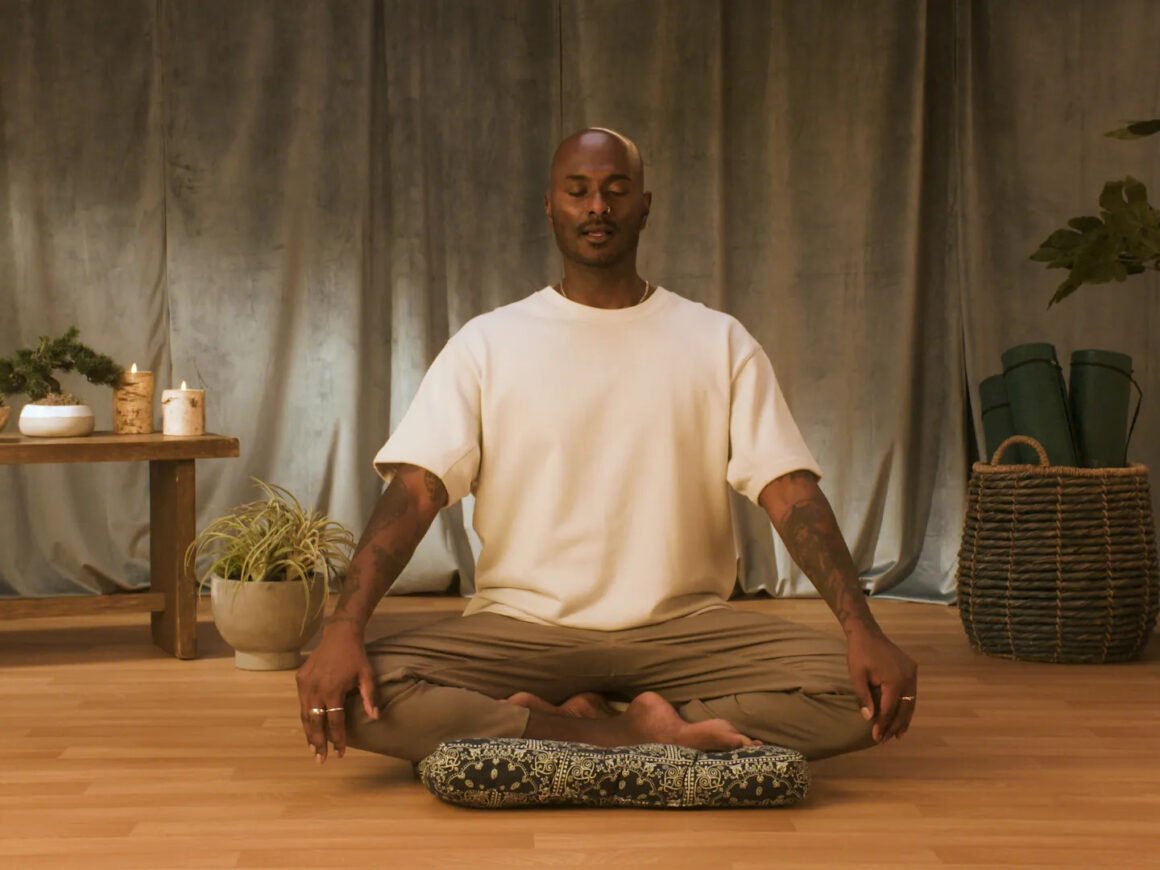
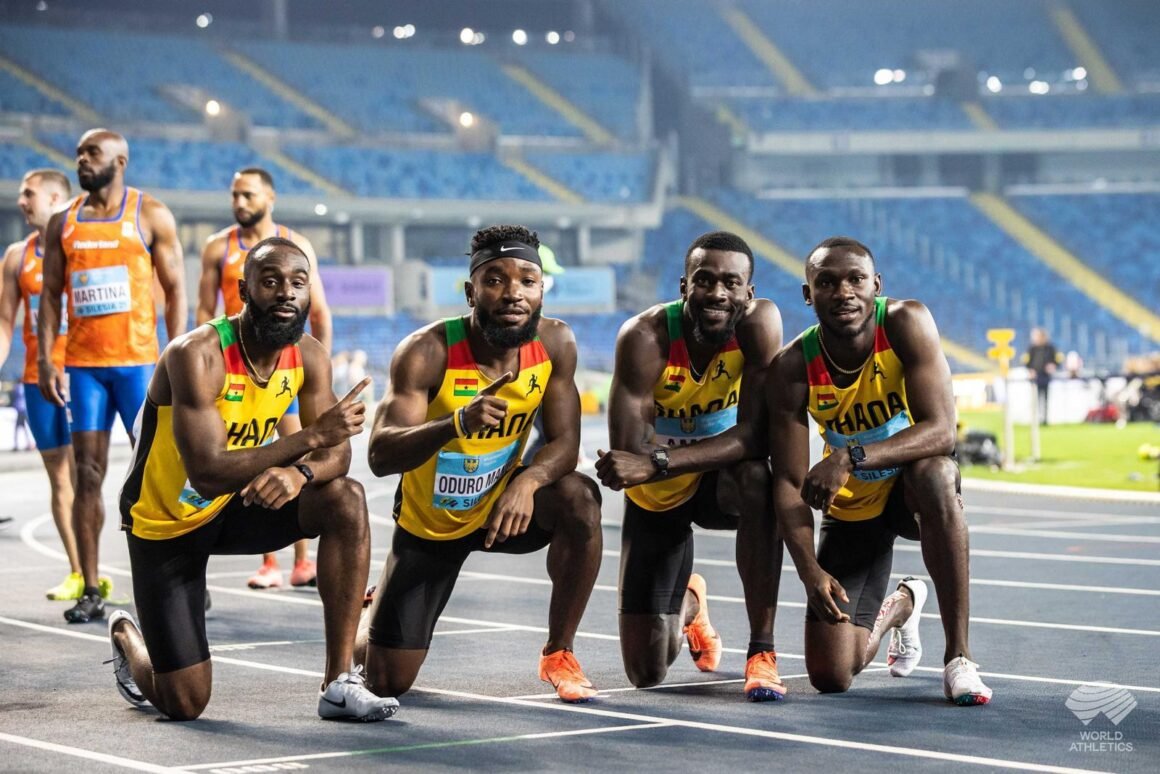
Abdul Rasheed Saminu, a key member of Ghana's 4x100 men's relay team, predicts a fierce competition on Thursday. The relay is scheduled to take place on Thursday, August 8, 2024, at the Stade France during the ongoing Paris 2024 Olympics.
Ghana's team, led by Benjamin Azamati and supported by Joseph Paul Amoah, Saminu Abdul Rasheed, Fuseini Ibrahim, and Botsio Isaac, will seek to go to the finals.
With Ghana's hopes of having a substantial impact at the Games fading, Olympic Games men's 200m semi-finalist Abdul Rasheed Saminu is aiming for a medal.
"The current focus is on the 4x100 relay on Thursday." Me and Azamati have gotten a feel for the course, and I know the other guys are practicing well for the relay."
We are going to give it our all to ensure that Ghana is in at least the top three."
Benjamin Azamati and Abdul Rasheed Saminu finished their respective races in the semi-finals of the men's 100 metres.
In Heat 2 Lane 3, Ghana will compete against China, Liberia, Brazil, Jamaica, Germany, and host France for a position in the finals.
The relay is Ghana's final event in the ongoing competition, and the quartet has guaranteed to conclude the country's campaign.
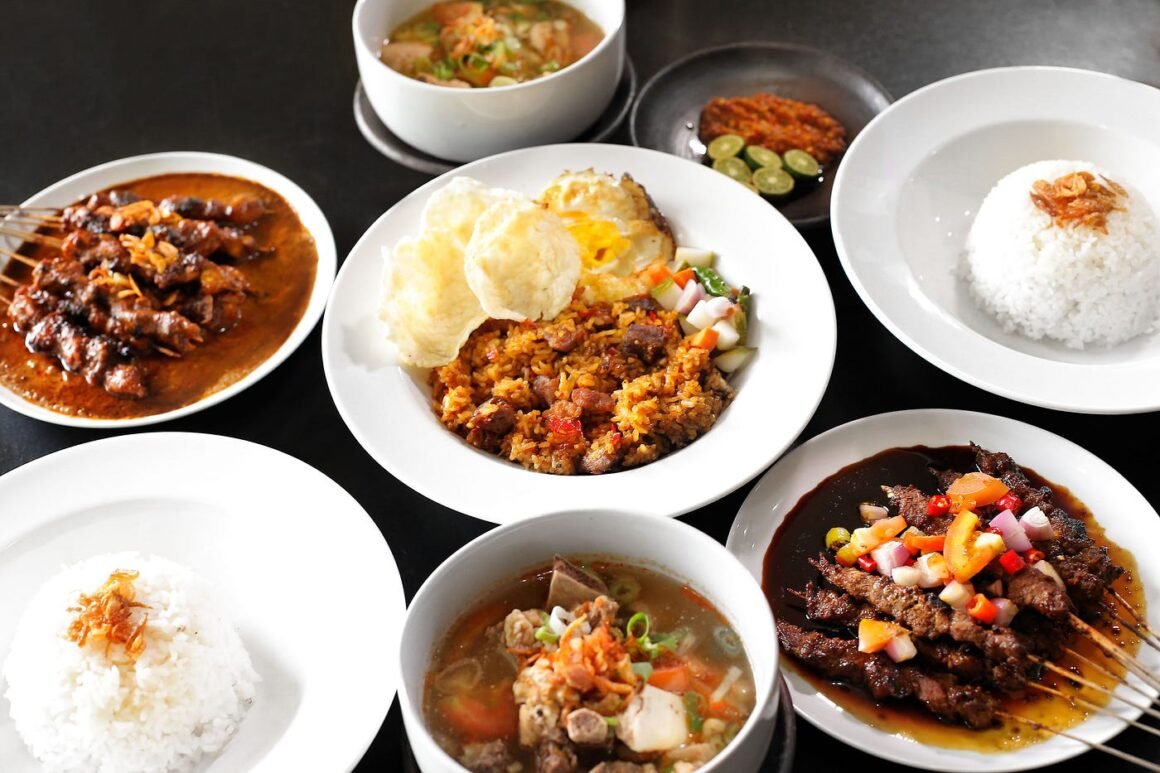
The distribution of food crops is a feature of traditional Ghanaian cuisine. Most ethnic groups consume exquisite recipes made from tropical crops including corn, beans, millet, plantains, and cassava. The foods described below will give you an idea of the diversity of Ghanaian cuisine.
1.Tuo Zaafi.
Grain, herbs, and meat are essential elements in northern Ghanaian cuisine because they are the region's principal agricultural products. Tuo Zaafi is made by boiling maize dough and adding a small amount of cassava. It resembles banku, but is softer and less sticky. The unusual and healthful herbs used to produce the accompanying soup, such as dawadawa and ayoyo leaves, distinguish Tuo Zaafi and contribute to its national popularity.
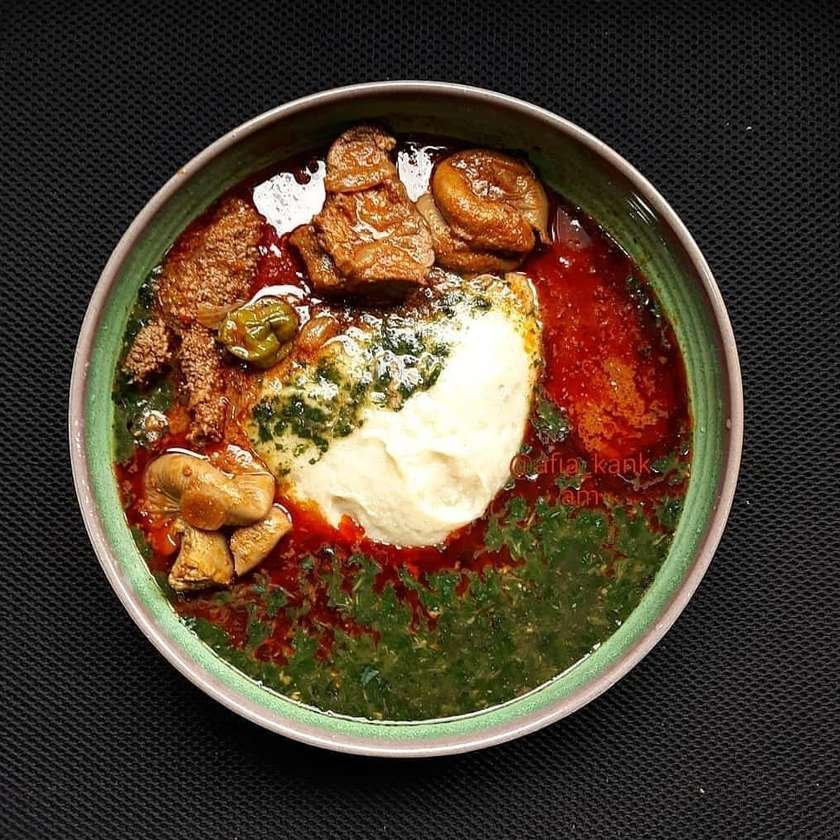
2. Fufu and goat light soup.
Fufu and goat light soup, a distinctive Akan dish, is a dinner that is sure to be popular in Ghana's eastern and Ashanti regions. In Ghana, fufu is made by pounding boiling cassava and plantains into a soft, sticky paste that is then combined with tasty, hot tomato soup. Fufu is a staple food in West Africa. Fufu is also consumed in Northern Ghana, albeit it is made using yam. Despite slight changes to the fundamental recipe, this weekend delicacy is popular across the country.
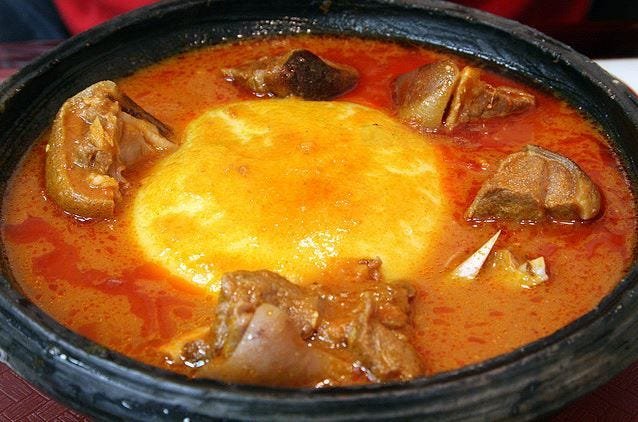
3. Banku
Kenkey and Banku are similar. The distinction is that this meal is made by combining maize dough with cassava dough. Furthermore, it is not encased in a cornhusk. Tilapia seasoned in spices is frequently the type of fish being cooked on the streets. It goes well with Banku, which is eaten with chopped tomatoes, onions, and extremely hot peppers also used as a garnish. One of the staple foods of the residents of coastal Ghana is Banku.

4. Waakye
Waakye is another dish that exemplifies Ghanaians' inventive usage of rice. The recipe, which combines beans and rice, was originally a Northern dish, but it can now be found anywhere on Accra's streets. Waakye will introduce you to a range of Ghanaian tastes and flavors because it is generally served with several sides such as spaghetti, avocado, fried plantains, and Garri (grated cassava).
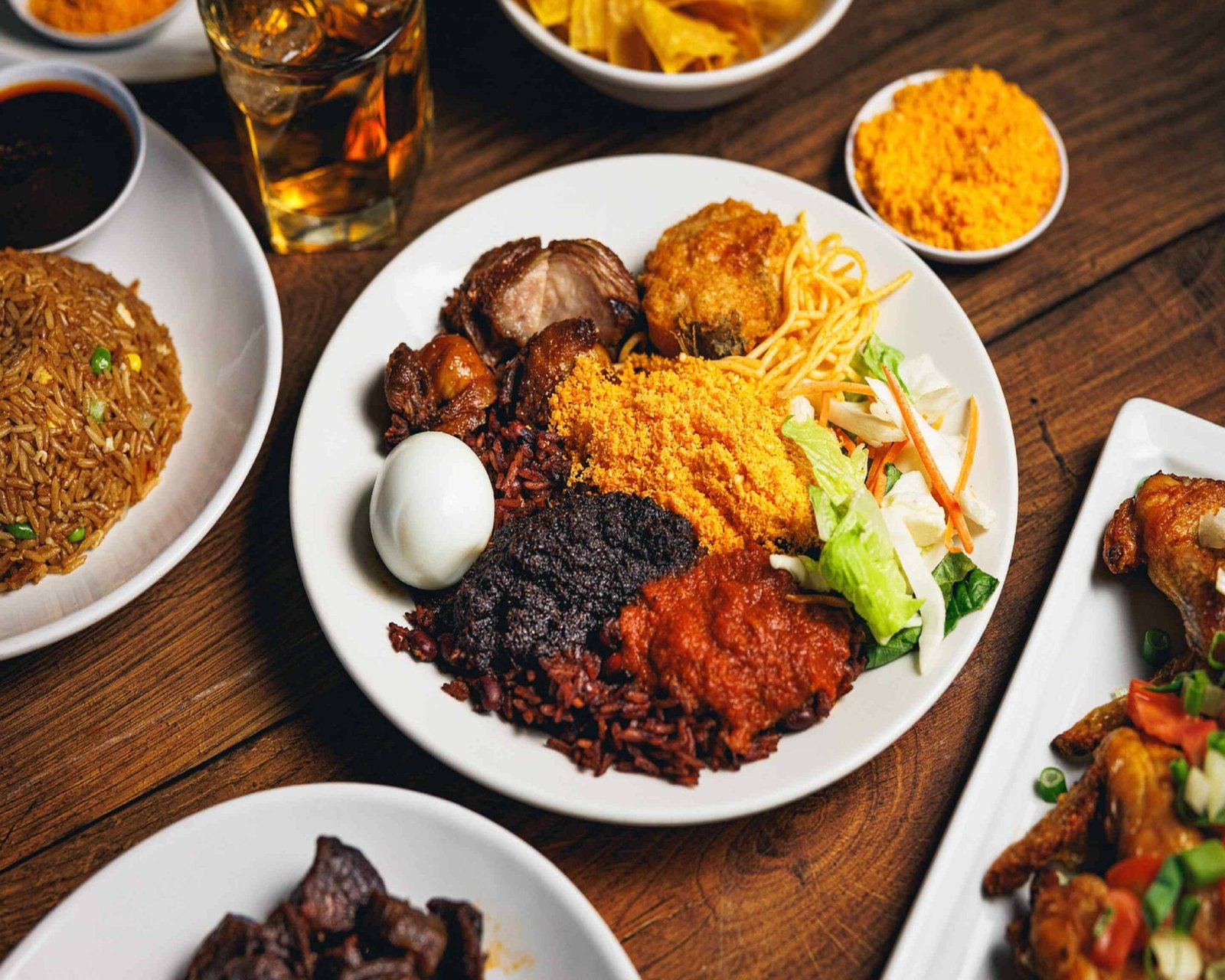
5.Gob3
Gob3 is a Ghanaian food made of Gari and beans, and therefore the name gob3 is a combination on Gari and beans. This Ghanaian food which is considered very nutritious is trending on some social media platforms.
Gob3 is quickly becoming a popular choice among many people; it is difficult to say if this is due to MP pronouncements or the economy, as gob3 is thought to be more economical and filling than waakye or kenkey.
People are reporting on social media that the queues for purchasing gob3 are growing.
Some Ghanaian celebrities have also used social media to express their appreciation for Gob3.
It is evident that gob3 is rapidly gaining popularity, so I am curious: is gob3 part of your meal plan for today?

6.Ampesi aka Plantain and Kotombire Stew
A variety of leaf vegetables, as well as local herbs and spices, are common ingredients in indigenous Ghanaian cuisine. The extremely nutritious Kontomire stew is made with salted fish, boiled eggs, and soft cocoyam leaves, and it goes well with boiling yams, plantains, and avocado.

7.Jollof
This rice dish is Senegalese in origin and is often made with a protein of choice such as meat or fish, part of the main ingredients for this delectable meal is tomato sauce. This dish is often accompanied by your favorite salad and delicious baked or fried plantains You may find online arguments abound about which West-African nation provides the best Jollof. This is a popular meal served by street vendors and sometimes prepared over a wood fire or coal adding a smokey salivating experience for the taste buds. Since this is one of the most popular dishes in Ghana you will find it at a reasonable cost at most restaurants on the destination.
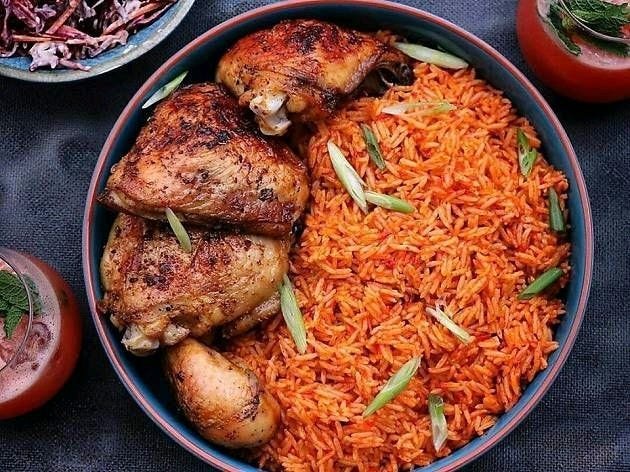
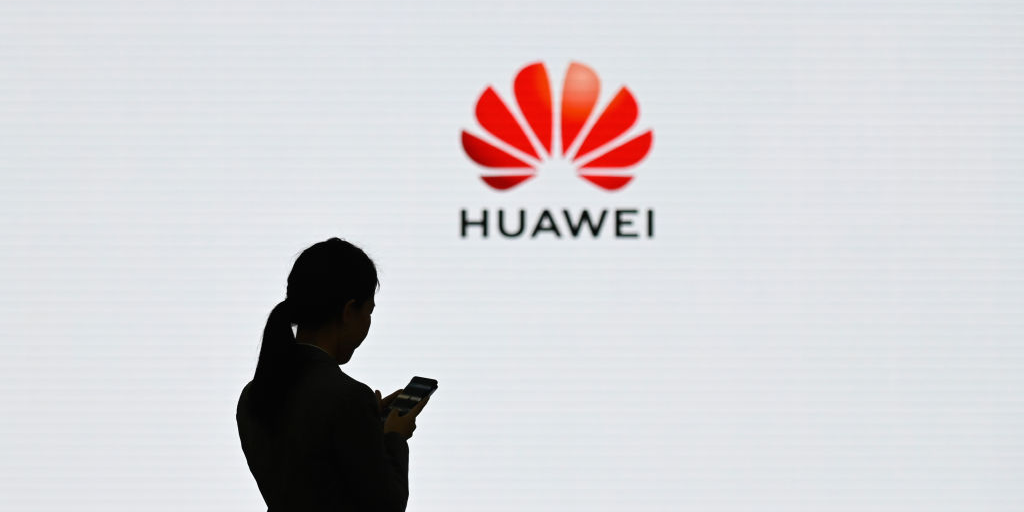
Earlier this month, Johannesburg hosted the successful Huawei Africa Connect 2024. The event brought together industry experts, key opinion leaders, and ecosystem partners from Southern Africa to discuss the construction of data infrastructure in the era of artificial intelligence.
During the event, Huawei shared best practices and insights on trending topics such as data protection, ransomware protection, and the evolution of data centers. The primary goal of the event was to facilitate the digital and intelligent transformation of enterprises in the sub-Saharan African region.
Peter Zhou, Vice President of Huawei and President of Huawei’s Data Storage product line, delivered a keynote speech highlighting the disruptive impact of AI on traditional data storage. He emphasized that AI will not only enhance performance, reliability, and data paradigms but also scalability, sustainability, and the data Huawei is at the forefront of redefining data storage by pioneering innovation across these six dimensions. Recently, Huawei introduced the OceanStor A800 high-performance storage, 128TB solid-state drives, and the Omni-Dataverse global file system. These advancements will enable customers to build cutting-edge AI-ready data infrastructure and fully leverage the value of their data.
On July 3rd, the Huawei Innovative Data Infrastructure (IDI) Forum 2024 took place in Johannesburg. Mad Chen, the vice president of Huawei sub-Saharan Africa, delivered a welcome speech, sharing his insights on the rapid advancement towards an intelligent world.
According to Chen, intelligence will unlock new opportunities for Africa over the next decade. Huawei is advocating an “All Intelligence” strategy, leveraging its extensive expertise and experience in the ICT industry to collaborate with customers and partners across Africa.
Huawei Data Storage provides innovative products and solutions designed to help customers across various industries in Africa unlock infinite data value.
In the AI era, efficient data management and utilization are essential for enterprises to maintain a competitive edge. Diego Xiao, vice president of Huawei’s Data Storage product line, recently delivered a keynote speech where he discussed Huawei’s “1+3+X” reference architecture for AI-ready data infrastructure.
This innovative architecture encompasses one data lake, three data pools, and multiple data services. It integrates OceanStor Dorado all-flash storage, OceanStor A800 high-performance storage, OceanStor Pacific scale-out storage, the OceanProtect appliance, and the Omni-Dataverse global file system housed within the DME. Additionally, it includes the DataMaster O&M model. This architecture is specifically designed to help enterprises maximize the value of their data and support the intelligent advancement of the digital economy in Southern Africa.
Hu Hui, Vice President of Huawei’s Scale-Out Storage Domain, delivered a keynote speech highlighting that data, computing power, and algorithms are the core components of large AI models. He emphasized that the amount of high-quality data is crucial in determining the level of AI.
Data storage, being a key carrier of data, plays a vital role in supporting large AI models. As these models advance, data centres are required to handle more data, which raises the demands on data storage regarding capacity, performance, and energy consumption.
https://googleads.g.doubleclick.net/pagead/ads?client=ca-pub-8168456490754028&output=html&h=280&slotname=3397324427&adk=3592186601&adf=107139881&pi=t.ma~as.3397324427&w=758&abgtt=3&fwrn=4&fwrnh=100&lmt=1722956972&rafmt=1&format=758x280&url=https%3A%2F%2Fwww.techinafrica.com%2Fhuawei-africa-connect-2024-highlights-and-innovations-unveiled%2F&fwr=0&rpe=1&resp_fmts=3&wgl=1&uach=WyJtYWNPUyIsIjEwLjE1LjciLCJ4ODYiLCIiLCIxMjcuMC4yNjUxLjg2IixudWxsLDAsbnVsbCwiNjQiLFtbIk5vdClBO0JyYW5kIiwiOTkuMC4wLjAiXSxbIk1pY3Jvc29mdCBFZGdlIiwiMTI3LjAuMjY1MS44NiJdLFsiQ2hyb21pdW0iLCIxMjcuMC42NTMzLjg5Il1dLDBd&dt=1722956972233&bpp=1&bdt=119&idt=265&shv=r20240801&mjsv=m202407300101&ptt=9&saldr=aa&abxe=1&cookie=ID%3Ded41d8cfef2e82f7%3AT%3D1722956893%3ART%3D1722956893%3AS%3DALNI_Maga8aCR8LexlJ_JLUN_yY81nwoWw&gpic=UID%3D00000ebbc83482f6%3AT%3D1722956893%3ART%3D1722956893%3AS%3DALNI_MZcuwB2nVXjz_pbhZAMk2eAvBJ05g&eo_id_str=ID%3D236aaaa59388e7f6%3AT%3D1722956893%3ART%3D1722956893%3AS%3DAA-Afjblx3OvFVXNDs6pM5vUBDun&prev_fmts=1152x280%2C334x250%2C758x280&correlator=2551570041601&frm=20&pv=1&u_tz=0&u_his=9&u_h=1080&u_w=1920&u_ah=993&u_aw=1920&u_cd=24&u_sd=1&dmc=8&adx=357&ady=3437&biw=1865&bih=910&scr_x=0&scr_y=0&eid=44759876%2C44759927%2C44759837%2C44798934%2C95334526%2C95334829%2C95337870%2C31084187%2C95339229%2C95336266%2C21065725%2C31078663%2C31078668%2C31078670&oid=2&pvsid=3396653682706790&tmod=858668283&uas=0&nvt=1&ref=https%3A%2F%2Fwww.techinafrica.com%2Fpage%2F2%2F&fc=640&brdim=0%2C23%2C0%2C23%2C1920%2C23%2C1920%2C993%2C1865%2C910&vis=1&rsz=%7C%7CeEbr%7C&abl=CS&pfx=0&fu=128&bc=31&bz=1.03&psd=W251bGwsbnVsbCxudWxsLDNd&nt=1&ifi=3&uci=a!3&btvi=3&fsb=1&dtd=271
Huawei’s all-flash scale-out storage is designed to activate mass unstructured data and drive the development of new applications in the AI era. This storage solution can flexibly manage any workload, enhance energy efficiency at any scale, and maintain reliability at every access point.
Jon Tullett, the Associate Research Director at International Data Corp, discussed the major trends in IT infrastructure development for the digital intelligence era. He also offered suggestions for enterprises to stay ahead in this evolving landscape.
Tullett emphasized that an increasing number of enterprises are leveraging AI technologies to enhance their competitive edge. However, the performance and reliability of their current data infrastructure often fall short, impeding further AI advancements.
He concluded that adopting all-flash storage and implementing innovative storage systems can enable enterprises to build a robust data infrastructure, thereby establishing a strong foundation for accelerated digital transformation.
Pandelani Munyai, the Chief Information Officer of Transnet Group, Lucas John Omollo, the Health, Safety, and Compliance Manager of ICT & Smart City Solutions at Konza Technopolis, and Zano Bright Nyati, the Senior Manager of Openserve, delivered keynote speeches on various topics. Munyai focused on digital transformation in the electric power industry, Omollo addressed smart city construction in Kenya, and Nyati discussed data protection practices in the carrier industry.
The forum featured four interactive sessions focused on data centre infrastructure, data protection, commercial markets, and the IdeaHub CXO Roundtable. Customers interested in the latest trends in data centre development and the newest solutions for data protection and ransomware protection were encouraged to actively participate in discussions and share their ideas during these sessions.
During the commercial markets session, Huawei officially launched the Huawei eKitStor Xtreme 300P, an ultra-high-performance disk designed for data centres. This product boasts a throughput bandwidth of 14.8GB/s and a data processing capability of 3.45 million IOPS, meeting large-scale data access requirements.
The eKitStor Xtreme 300P ensures service continuity and data resilience with an MTBF of 2.5 million hours and four levels of data protection capabilities. Its versatility makes it suitable for most enterprises, as it can be used in a wide range of scenarios and is compatible with multiple devices. Through the Flash Forward project, it can help SMEs unleash the potential of data centres.
Additionally, the Huawei IDI Forum included a 260m2 exhibition area where Huawei’s data storage products and solutions were showcased through more than 20 scenario-specific interactive exhibits. The forum received positive feedback from attendees and fostered active communication and idea sharing among customers. The event was highly regarded and drew many customers, enhancing their engagement and collaboration.

Access to the old visa service provider’s website and services will cease on August 16, 2024.
Applicants will not be able to make a new visa appointment, cancel or reschedule an existing appointment, or access customer service, between August 16 and August 26, 2024.
Elliot Fertik, Consul General, U.S. Embassy in Ghana, addressing the press, said, “All current nonimmigrant visa interview appointments remain valid.”
“That means if you currently have a visa interview scheduled with the U.S. Embassy, it is still valid and you should plan on attending the interview on the day of the appointment,” he explained.
He said on August 16, the old appointment system and website would no longer be accessible for changes.
“What that means is that starting on the morning of August 16, you will no longer be able to schedule new appointments, will not be able to make visa fee payments, and customer service will not be accessible,” he further explained.
In addition, he said, if an applicant had requested an emergency or expedited appointment and had not received a response by August 16, they would need to resubmit their request in the new scheduling system on or after August 26.
Mr Fertik clarified that “during the period between August 16 and August 26, you will not be able to make new visa appointments, and you will not be able to cancel or reschedule any existing appointments.
But if you have an appointment already scheduled during that time, it is still valid. We will still interview you, and you should still come to the embassy for your appointment.”
The Consul General stated that on August 26, the Embassy would launch the new scheduling system and that the link to the new appointment scheduling website would be on the Embassy’s website: gh.usembassy.gov and social media platforms.
“If your interview is scheduled between August 16 and August 26, again, your visa interview will still happen on those days. But you will not be able to access your ustraveldocs.com account, which is the current visa appointment system, on or after August 16,” he continued.
Mr Fertik advised that applicants should print out their appointment confirmation letters before
August 16 if they had appointments during that period and that they should bring that with them to the appointment on their visa interview day.
“If you have an interview between August 16 and the 26, and you don’t attend it or you’re not able to make it, check on the US Embassy’s website on or after August 26 for information on how to proceed.
If your interview is scheduled for August 26 or afterwards, no further action. The visa appointment is still valid, but you will need to log on to the US Embassy’s website on August 26 for information on the new appointment system. And then you will need to go in there and make a new appointment,” he said.
Mr Fertik further explained that, if an applicant had paid the visa application fee but had not been scheduled for an interview, they should immediately make a visa appointment before August 16.
He said the new visa services provider would not come with an extra cost to applicants as the cost of visas would remain the same, albeit with new service enhancement.
Speaking on what drove the backlog in visa demand, the Consul General observed that the number of people who paid for visa application fees in Ghana from 2019 before the COVID-19 pandemic, compared to those who did in 2023, had tripled.
“So while certainly, we think this new system will provide some additional enhancements and will be more efficient, what is going to drive down the backlog is our efforts to try to just, again, do more interviews. And again, we’ve been doing a lot more, processing a lot more applications,” he said.
Mr Fertik noted that with student visas, the Embassy had processed more visa applications for students than it did in the corresponding time.
“…we are doing everything we can to reduce the wait time as much as we can,” he assured applicants.
The Consul General urged applicants to continue to monitor the Embassy’s website and social media platforms for updates and seek clarity if need be.
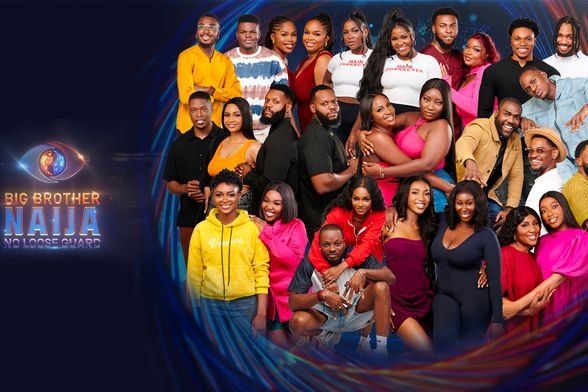













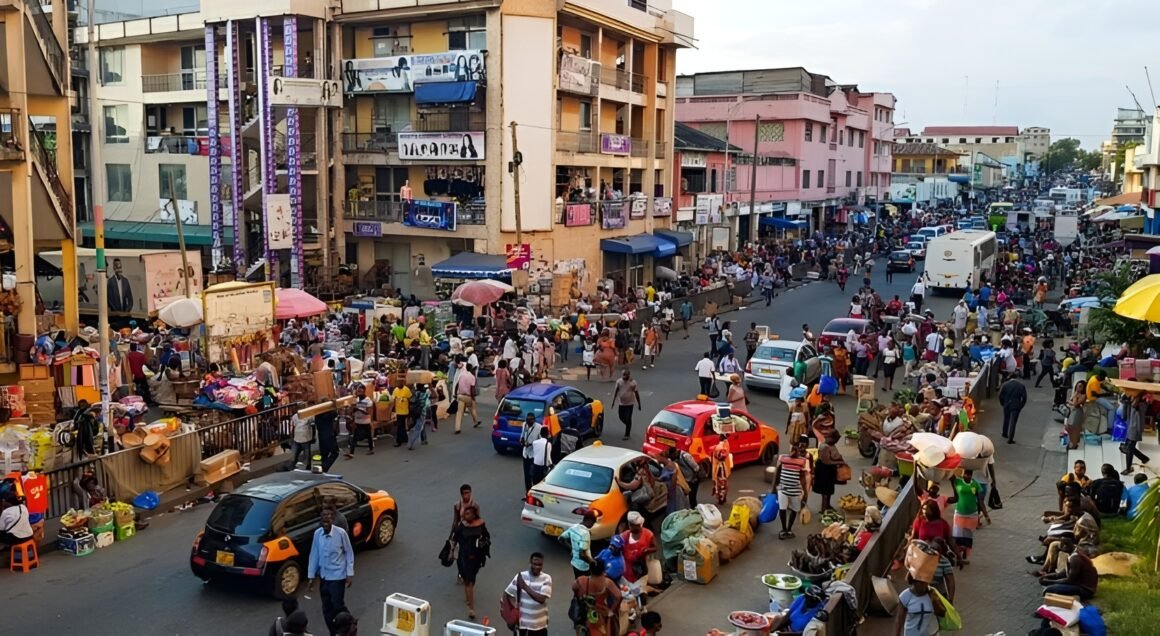
1. Sudan: $5
Sudan tops the list with the lowest average salary of just $5. The economic crisis in the country has been exacerbated by years of political instability, conflict, and sanctions. Inflation has skyrocketed, eroding the purchasing power of the Sudanese people.
Despite recent efforts to stabilize the economy, the average citizen still faces immense financial hardship.
2. Burundi: $17
Burundi follows with an average salary of $17. This small East African nation has been grappling with severe poverty and underdevelopment. The majority of the population relies on subsistence agriculture, with limited opportunities for higher-paying jobs.
The ongoing political turmoil has also hindered economic progress, leaving many Burundians struggling to survive on meagre incomes.
3. The Gambia: $23
The Gambia, known for its tourism industry, has an average salary of $23. While tourism provides some economic relief, it is seasonal and insufficient to support the entire economy. Many Gambians work in low-wage jobs in agriculture and informal sectors, where wages remain stagnant and inadequate to meet the cost of living.
In Eritrea, the average salary stands at $24. The country’s strict government control over the economy, coupled with limited opportunities for private enterprise, has stunted economic growth. Many Eritreans depend on remittances from relatives abroad to supplement their incomes, highlighting the dire economic conditions within the country.
5. Ghana: $38
Ghana, often lauded for its relative political stability and economic growth, still faces challenges with wage disparities. The average salary in Ghana is $38, with many workers employed in low-paying agricultural and informal sector jobs. Despite progress in some areas, a significant portion of the population remains economically vulnerable.
6. Sierra Leone: $38.15
Sierra Leone’s average salary of $38.15 reflects the ongoing recovery from a devastating civil war and the Ebola outbreak. The country has made strides in rebuilding its economy, but widespread poverty and unemployment continue to suppress wages. Many Sierra Leoneans work in precarious conditions with minimal financial security.
7. Nigeria: $43
Nigeria, Africa’s most populous country, has an average salary of $43. Despite being rich in natural resources, especially oil, the wealth distribution is highly uneven.
The majority of Nigerians work in low-paying jobs, particularly in the informal sector, where wages are not regulated and often insufficient to cover basic needs.
The economic challenges faced by these seven African countries highlight the urgent need for policies that promote job creation, fair salaries, and economic stability.
Addressing these issues is crucial for improving the living standards of millions of Africans who currently struggle to make ends meet.
Sustainable development, investment in education and skills training, and political stability are key factors that can help lift these nations out of poverty and create a more equitable future.

As young adults embark on the path to financial independence, the decision whether to invest in a home becomes increasingly pivotal. A significant majority of first-time homebuyers, approximately 70% to 71%, fall within the age bracket of 35 years and younger, highlighting a growing trend towards property ownership among this demographic (Lightstone information solutions*).
Owning a home offers not just a place to settle down and build roots, but also a sense of stability and security, particularly when envisioning a future with a partner or raising a family. The allure of personalizing your living space and gaining greater control over your lifestyle can be especially appealing after years of renting from landlords. Moreover, homeownership represents a substantial investment opportunity, contingent upon the property's potential appreciation over time.
However, before taking the plunge into homeownership, it's crucial to comprehend the long-term financial commitments and responsibilities involved. The necessity of evaluating the benefits of homeownership against competing financial priorities according Sarah Nicholson of Just Money.
"Securing a stable income to save for a deposit and meet monthly repayments, as well as maintaining a solid credit score for favourable interest rates, are essential prerequisites," advises Nicholson. "Understanding ongoing obligations like insurance and maintenance costs is equally vital in making an informed decision about homeownership."
Financial readiness is paramount. Some lenders may impose age-related restrictions on home loan approvals for individuals under 35, underscoring the importance of meticulous financial planning. Saving diligently for a deposit not only enhances your chances of securing a home loan but also positions you favourably in a competitive market.
Practical advice for young adults striving to accumulate a deposit:
• Establish a detailed budget and savings plan.
• Set achievable savings goals and track progress through milestones.
• Automate savings transfers to a dedicated account.
• Trim unnecessary expenses and explore additional income avenues.
• Strategically invest windfalls, such as tax refunds or bonuses.
• Investigate government incentives and financial support programs.
• Maintain and improve your credit score to qualify for advantageous home loan terms.
• Consider low-risk investment opportunities for potentially higher returns than traditional savings accounts.
Navigating the complexities of property transactions demands informed decision-making and expert guidance. Tools like home loan calculators, consultations with reputable bond originators, and financial advisors can provide invaluable support throughout the process.
Beyond financial considerations, lifestyle preferences play a pivotal role in property decisions. Prioritising location, amenities, future growth needs, and community factors can significantly enhance your long-term satisfaction with a property investment.
Market dynamics also warrant scrutiny. While housing prices have fluctuated in recent years, decreased property values may present a strategic entry point into the market. Lower prices translate to reduced bond repayments and potential savings on property taxes, while positioning buyers to benefit from future market rebounds.
Nonetheless, declining property values may indicate broader economic challenges and infrastructure issues within specific areas, affecting long-term investment viability. Understanding local market trends and resale potential is essential for making informed investment decisions that align with your financial objectives.
Ultimately, whether renting or owning, the decision hinges on weighing personal aspirations against financial realities, ensuring a sustainable and rewarding path towards achieving homeownership and financial independence.
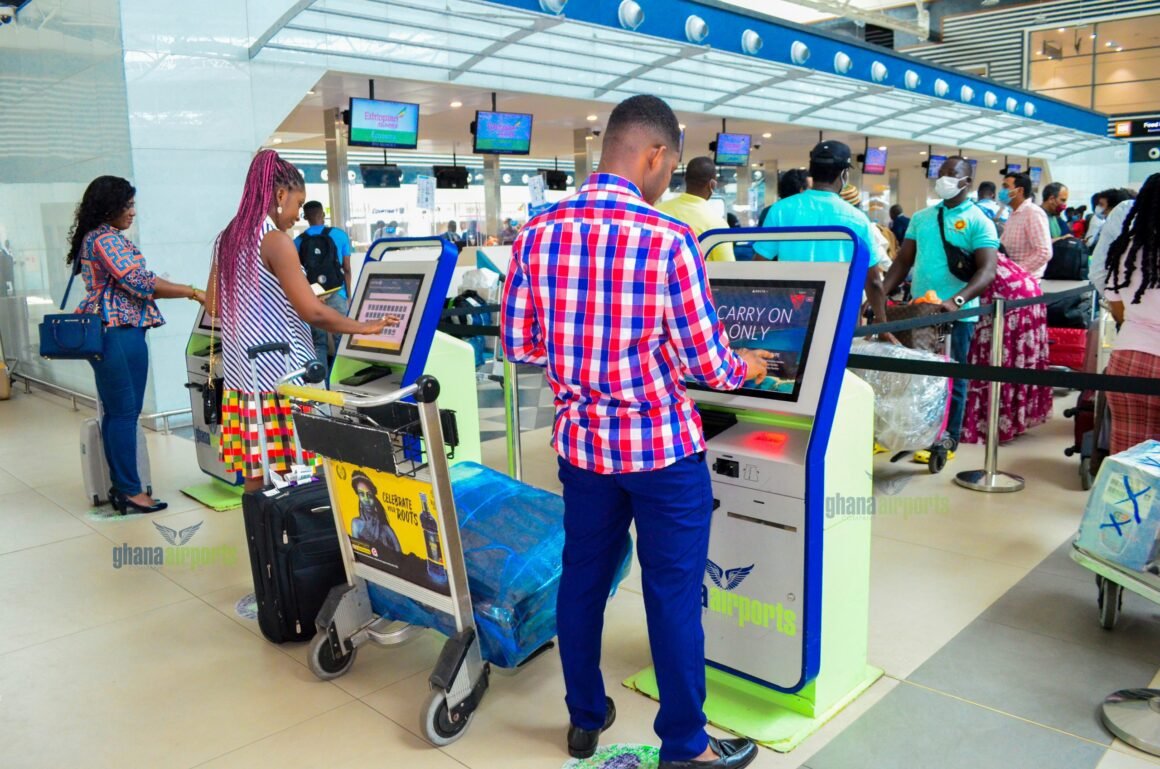
A global technology outage grounded flights, knocked banks offline and media outlets off air after a faulty software update disrupted companies and services around the world and highlighted their dependence on just a handful of providers
RANKFURT, Germany -- A global technology outage caused by a faulty software update grounded flights, knocked banks and media outlets offline, and disrupted hospitals, small businesses and other services on Friday, highlighting the fragility of a digitized world dependent on just a handful of providers.
The trouble with the update issued by cybersecurity firm CrowdStrike and affecting computers running Microsoft Windows was not a hacking incident or cyberattack, according to CrowdStrike, which apologized and said a fix was on the way.
But hours later, the disruptions continued — and escalated.
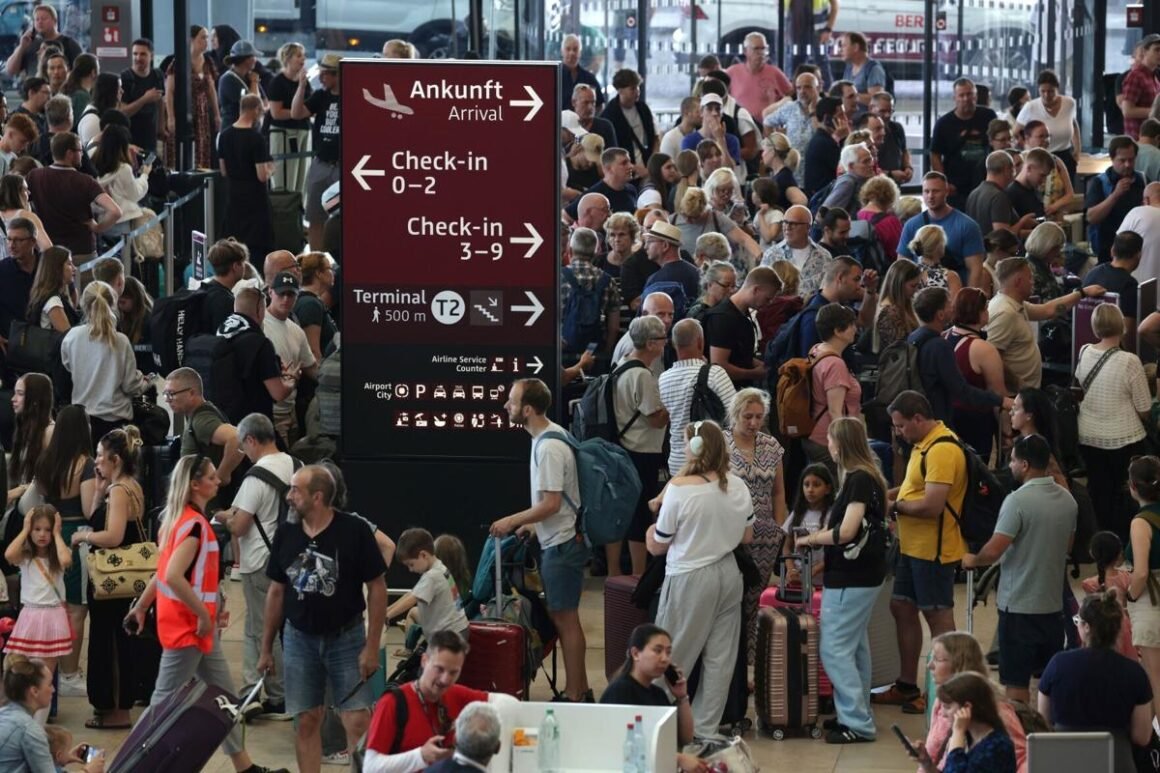
Long lines formed at airports in the U.S., Europe and Asia as airlines lost access to check-in and booking services at a time when many travelers are heading away on summer vacations. Hospitals and doctors' offices had problems with their appointment systems, and cancelled non-urgent surgeries. Several TV stations in the U.S. were also prevented from airing local news early Friday.
Saskia Oettinghaus, a member of the German Olympic diving team, was among those stuck at the Berlin Airport.
“We are on our way to Paris for the Olympic Games and now we are at a standstill here for the time being,” Oettinghaus said.
Other athletes and spectators traveling to Paris were delayed, as were their uniforms and accreditations, but Games organizers said disruptions were limited and didn't affect ticketing or the torch relay.
“This is a very, very uncomfortable illustration of the fragility of the world’s core internet infrastructure,” said Ciaran Martin, a professor at Oxford University’s Blavatnik School of Government and former Head of Britain’s National Cyber Security Centre.
Cyber expert James Bore said real harm would be caused by the outage because systems people have come to rely on at critical times are not going to be available. Hospitals, for example, will struggle to sort out appointments and those who need care may not get it — and it will lead to deaths, he said.
“All of these systems are running the same software," Bore said. "We’ve made all of these tools so widespread that when things inevitably go wrong — and they will, as we’ve seen — they go wrong at a huge scale."
The head of Germany’s IT security agency, Claudia Plattner, said that “the problems will last some time — we can’t expect a very quick solution.” A forecast for when exactly all systems will be up and running is difficult, but “it won’t be hours,” she added.
Microsoft spokesperson Frank X. Shaw confirmed in an emailed statement that “a CrowdStrike update was responsible for bringing down a number of Windows systems globally." Earlier, the company had posted on the social media platform X that it was working to “alleviate impact” and that they were “observing a positive trend in service availability.”
During an interview on NBC’s “Today Show” Friday, CrowdStrike CEO George Kurtz apologized for the outage, saying the company was “deeply sorry for the impact that we’ve caused to customers, to travelers, to anyone affected by this, including our companies.”
“We know what the issue is” and are working to remediate it, Kurtz said.
“It was only the Microsoft operating system” that was affected, though it didn’t happen on every Microsoft Windows system, he said.
The Austin, Texas-based company's shares were down nearly 10% in early trading Friday.
A recording playing on its customer service line said, “CrowdStrike is aware of the reports of crashes on Microsoft ports related to the Falcon sensor,” referring to one of its products used to block online attacks.
Meanwhile, governments and companies across the world scrambled to respond.
The White House said President Joe Biden was briefed on the outage and his team has been touch with the company and other impacted entities.
New Zealand's acting prime minister, David Seymour, said on X that officials in the country were “moving at pace to understand the potential impacts,” adding that he had no information indicating it was a cybersecurity threat.
The issue was causing “inconvenience" for the public and businesses, he added.
On the Milan stock exchange, the FTSE MIB index of blue-chip Italian stocks could not be compiled for an hour, though trading continued.
Major delays reported at airports grew on Friday morning, with most attributing the problems in booking systems of individual airlines.
In the U.S., airlines United, American and Delta said that at least some flights were resuming after severe disruptions, though delays would persist.
Airlines and railways in the U.K. were also affected, with longer than usual waiting times.
In Germany, Berlin-Brandenburg Airport halted flights for several hours due to difficulties in checking in passengers, while landings at Zurich airport were suspended and flights in Hungary, Italy and Turkey disrupted.
The Dutch carrier KLM said it had been “forced to suspend most” of its operations.
Amsterdam’s Schiphol Airport warned that the outage was having a “major impact on flights” to and from the busy European hub. The chaotic morning coincided with one of the busiest days of the year for Schiphol.
Widespread problems were reported at Australian airports, where lines grew and some passengers were stranded as online check-in services and self-service booths were disabled — although flights were still operating. Meanwhile, passengers stood in long lines at Rome’s Leonardo Da Vinci airport after flights were cancelled following a global power outage.
In New England, the outage led to delays at airports and for some hospitals to cancel appointments.
At Mass General Brigham, the largest health care system in Massachusetts, all scheduled non-urgent surgeries, procedures, and medical visits were cancelled Friday because of the outage, according to a spokesperson. Emergency departments remain open and care for patients in the hospital has not been impacted.
While the outages were being experienced worldwide, Australia appeared to be severely affected by the issue. Disruption reported on the site DownDetector included the banks NAB, Commonwealth and Bendigo, and the airlines Virgin Australia and Qantas, as well as internet and phone providers such as Telstra.
National news outlets — including public broadcaster ABC and Sky News Australia — were unable to broadcast on their TV and radio channels for hours. Some news anchors went on air online from dark offices, in front of computers showing “blue screens of death.”
Hospitals in several countries also reported problems.
Britain’s National Health Service said the outage caused problems at most doctors’ offices across England. NHS England said in a statement said the glitch was affecting the appointment and patient record system used across the public health system.
Some hospitals in northern Germany canceled all elective surgery scheduled for Friday, but emergency care was unaffected.
Shipping was disrupted too: A major container hub in the Baltic port of Gdansk, Poland, the Baltic Hub, said it was battling problems resulting from the global system outage.
Kurtenbach reported from Bangkok and Graham-McLay from Wellington, New Zealand. Associated Press journalists around the world contribute
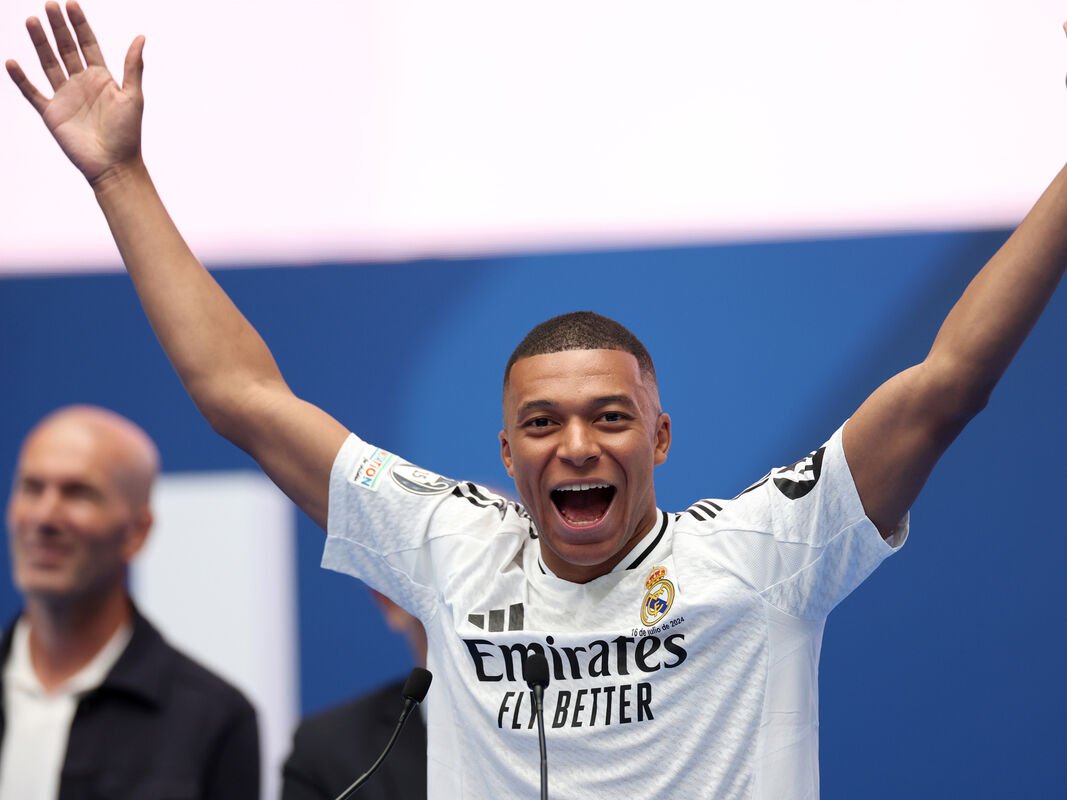
Real Madrid has officially announced the signing of World Cup-winner Kylian Mbappe on a five-year contract. The French striker will join the 15-time European champions on July 1, following the expiration of his contract with Paris St Germain.
Earlier this year, Mbappe, 25, confirmed his intention to leave PSG this summer.
A statement from Real Madrid reads: "Real Madrid and Kylian Mbappe have reached an agreement for him to be a Real Madrid player for the next five seasons."
This announcement confirms what has been widely speculated for months, with Mbappe heavily linked to a move to the Bernabeu. Currently, Mbappe is with the France national team preparing for Euro 2024 and will officially join Real Madrid after the tournament concludes.
Real Madrid is on a high, having recently won their record 15th European title by defeating Borussia Dortmund in the Champions League final, and securing the LaLiga title last month.
Mbappe wrote on X: “A dream made reality. Very happy and proud to form part of the club of my dreams, Real Madrid.
“It is impossible to explain how happy and emotional I feel in this moment.”
The free transfer comes six years after Mbappe joined PSG from Monaco on a permanent deal for a reported £165.7million fee. He had already spent a season on loan at the Parc des Princes.
He won six Ligue 1 titles with PSG and scored 256 goals in 308 appearances for the club.
He also won the French Cup four times, but Champions League glory eluded him. PSG reached the final in 2020 but finished runners-up to Bayern Munich and they lost at the last-four stage this year to Dortmund.

Fashion was refreshingly redefined at the just ended Ghana Fashion and Design week 2015 held at the plush Kempiski, Gold Coast City Hotel in Accra.
The three- day spectacular show which began on Friday, 23'" and climaxed on Sunday, 25" October 2015 brought together celebrated fashion designers and fashionistas from the UK, US, SA and Ghana.

Day one of the event witnessed runway collections from Ghanaian designers like Owusu Kofi Michael (m) GH, Julia Shika Odamtenn (w) GH, Radiant Jackson (m) GH, Hazza (mw) GH, Mifani (ft) UK, Totally Ethnik (w) GH and Quarte (w)
US.

The runway dazzled on the second day with designs from TUTUWAA by Efua Biney, Zarth- South Africa, Native Belle-UK, Afre Anko-Ghana,Mzukizi-Mbane-SA, Other designers were Bello Edo-Ghana, LFJ Style-SA, 1981-Italy/GH, Amanda May-SA and Korlekie-UK GFDW 2015 gave equal opportunity to top fashion designers and also emerging designers to showcase their designs, network and also increase their passion for fashion.

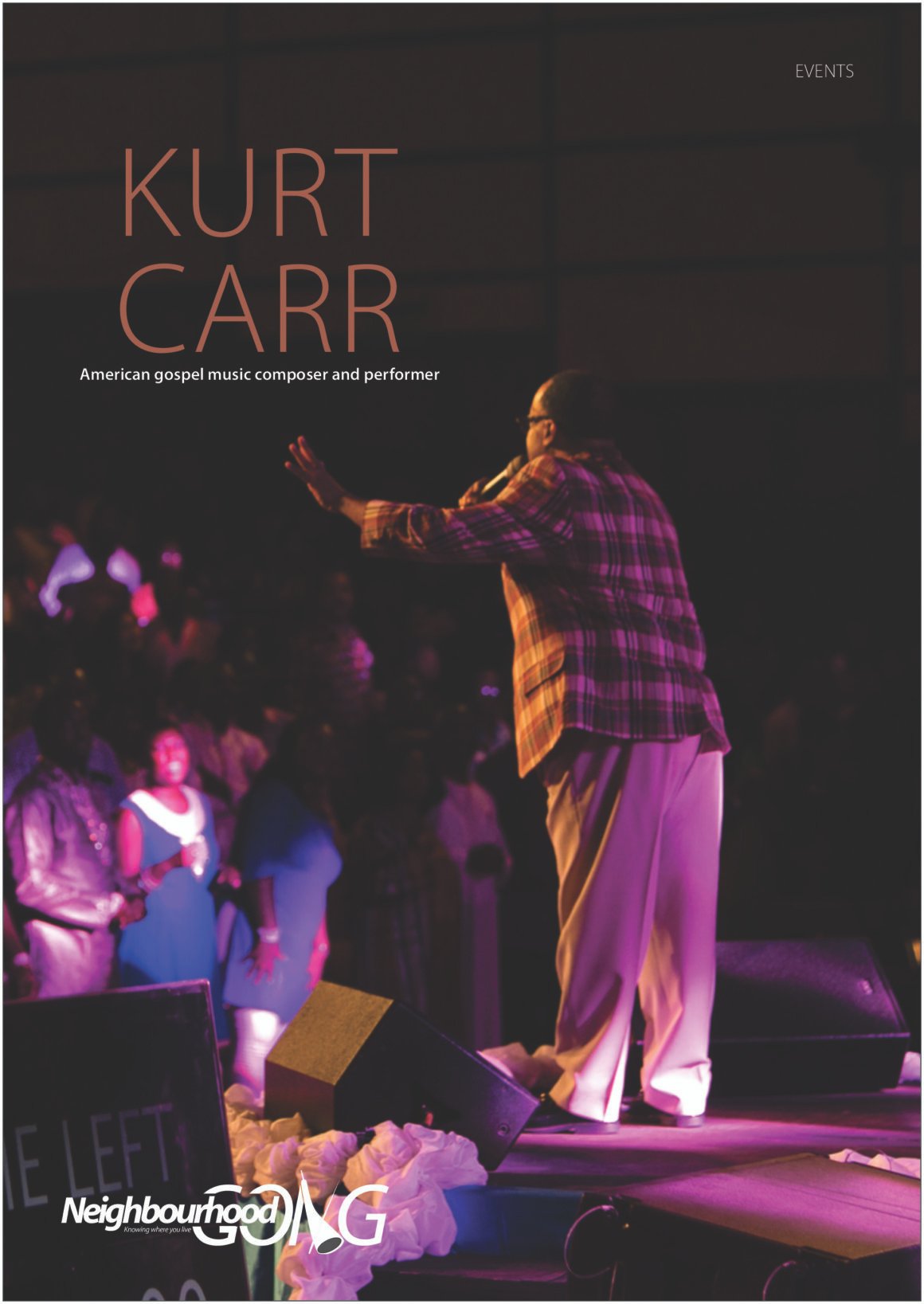
Ghana experienced yet another electrifying music concert on Easter Friday, 3rd April 2015, as Nigerian gospel music sensations Nathaniel Bassey and Uche Agu thrilled the audience with a wild praise and worship marathon on the Harvest Praise 2015 stage at the Accra International Conference Center.
Their Ghanaian counterparts who performed included Accra's most celebrated urbane praise group - Harvest Gospel Choir, Winneba Youth Choir, and the emerging gospel music diva Kakra Nartey, all delivering performances aimed to live up to the historic show.
With its huge following, Harvest Praise ran a double show - an afternoon session at 1:30pm and an evening session at 6pm - to accommodate its loyal followers.
Harvest Praise, which was then in its 17th year, was Ghana's pioneering brand organizing church community in an interdenominational setting through a feast of the best local and international music, drama, and other entertaining genres.
The program had blazed the trail for what has today become a cocktail of gospel music concerts splashed across the country.
Gospel music lovers had trusted the Harvest Praise brand for the exhilarating experience it offered patrons - a total family experience for the family conscious.
A big attraction was their children's version of the program, HP Kids, which was introduced the previous year and promised a mega package with kid's talent shows, quizzes, giveaways, all based on solid biblical teachings. However, it was only available during the evening session.
Tickets had been sold at various points including Citi FM, Sweet Melodies, Sunny FM, and others.
The Harvest Praise experience was the brainchild of Harvest International Ministries, used as a contemporary evangelical tool to extend the reach of the gospel, the love, and healing grace of God, shared abroad and to spiritually refresh the body of Christ.
Harvest Praise had also been an ambitious platform for many talented artists locally and internationally. The best of Ghana's gospel musicians had been discovered and nurtured by Harvest Praise, including Daughters of Glorious Jesus, Diana Hamilton, Phillipa Berfi, Quessi Oteng, Danny Nettey, Cynthia Maccauley, Yaw Antwi Dadzie, and Christiana Love, among others.
American gospel music maestro, the late Andrew Couch, South Africa's worship heartthrob Benjamin Dube, Darwin Hobbs, Bob Fitts, and recently Kurt Carr had all graced the Harvest Praise stage at one time or another.
The Harvest Praise Planning Committee had been highly optimistic that year's package held too much value than promised.
Their commitment to draw in people living with disabilities to share in the HP experience had remained intact and likely saw bigger representation of this group. Daniel Adjei, chairman of the Committee, had held a lot of more interesting attractions for the Good Friday show close to his chest.
The spotless organization of Harvest Praise, its acclaimed hallmark, had been tested once again with the athletic performance of the Nigerian team.
Looking within the subregion for collaboration had been welcomed news - a smart move to tap into the strong social bonds between Ghana and Nigeria, creating great expectations for the Easter Friday, 3rd April 2015 show at the Accra International Conference Center!
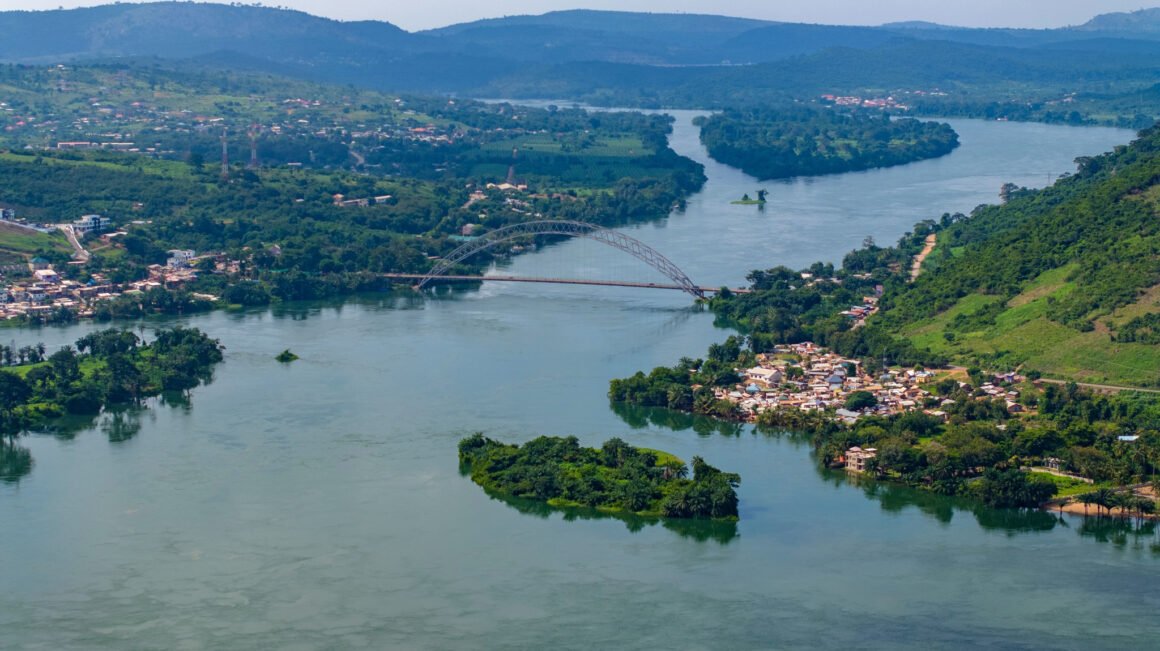
By Gabriel Obodal Torgbor-Asho, Pictures: Ebenezer Kwelkuma Qua
Small London is a small community that easily comes into sight from below, right after crossing the Adome Bridge from Alimpoku in the Eastern region. The village is sandwiched between the Volta River and the Akwamu Hills. One can have a pleasant feel of nature here, with cozy weather, uninhabited islands, and hills covered with vegetation, along with fishing expeditions among other activities.
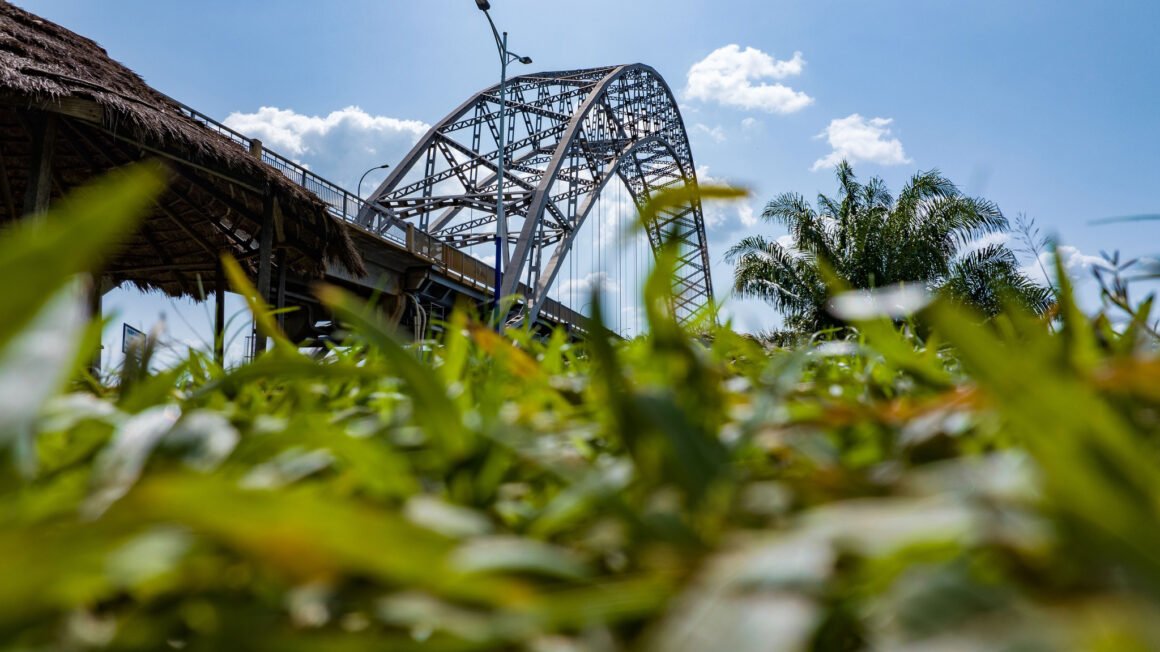
Settlers of this community, about one thousand, are mostly not Ewes. They immigrated from Bakoa near Adidome in the Volta region in the 1950s. Buildings in the community are mostly made from mud, and due to the lack of a proper layout system, structures are randomly situated close to each other, which is typical of many Ghanaian villages.
Small London forms part of an area called Adome, with neighboring communities like "Mame-Water," "Zion City," and "Quarters." The name is said to have been coined by the headman of the village, John Kofi Ahatse. According to Ahatse, the name came spontaneously, and he could not readily provide what might have prompted it. However, a tour through the community gives a few pointers that perhaps the name must have been inspired by London City in the United Kingdom.
London (UK) has the River Thames, the London Bridge, and other sceneries that attract numerous tourists from diverse backgrounds. Interestingly, Small London also boasts the Volta River and the Adome Bridge as corresponding resources holding virtually the same significance as those in London (UK). It is common to find travelers cruising on the Volta River when in the community, just as one would find in London City (UK).
The land on which the current settlers live was once an ancient iron-working site for people of pre-colonial Ghana. An excavation on the site by researchers from the University of Ghana's Archaeology Department revealed special artifacts such as iron slag, pieces of iron, tuyere fragments, pottery, and lithics produced by the precursor people of Small London.
The area largely remained fallow during colonial times until the 1950s when the Ahatse family first arrived and settled. Others later joined to create what has now become known as Small London. Today, just a little digging on the land could reveal some of the centuries-old artifacts. Small London, indeed, holds in stock rich historical antecedents of Ghana, just as London City does in the affairs of the UK.
The source of livelihood in Small London largely depends on the Volta River. Men in the community mostly engage in fishing and farming. When not in the field, the fishermen take time to mend


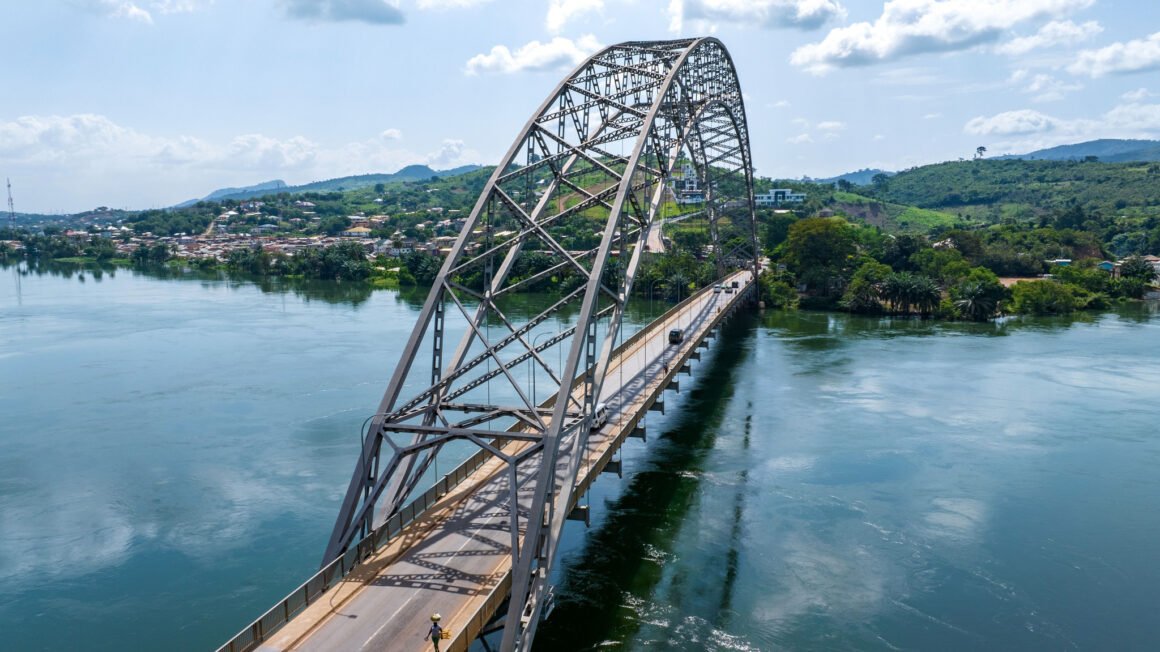
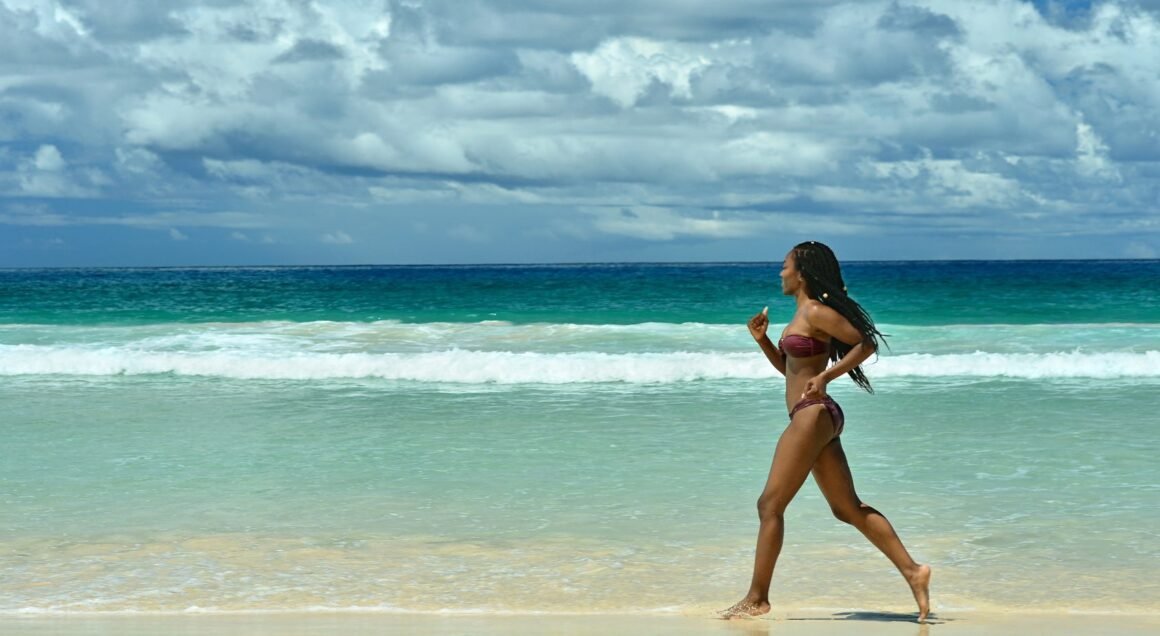
From luxury coastal retreats to nearby small towns, enjoy a perfect 48-hour recharge from our staycation guide.
Discover new heights of relaxation at the white sand hotel located in the heart of the Central Region at Gomoa Fetteh, less than an hour's drive from the city of Accra. Enjoy panoramic ocean views from 10 well-appointed individually designed suites & chalets situated amidst 60 hectares of tropical garden with exotic plants & trees brought from 9 different countries with its private beach, clubhouse, restaurants & bars, tennis court, and helipad. Don't worry much about the cost if you are going on a vacation with the whole family because they have a family accommodation with three bedrooms, a villa, and a dining hall area. With beautiful natural scenes, tropical flowers, and canopied pathways you are assured of an exciting and peaceful vacation.
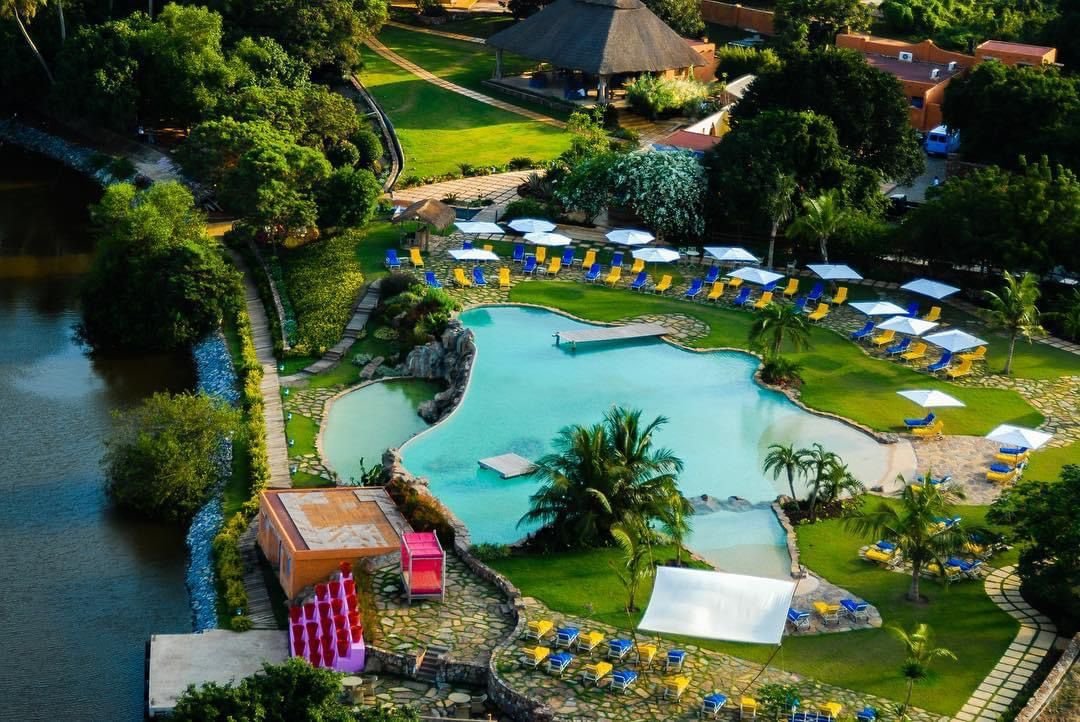
Afrikiko Riverfront Resort is located about an hour and a half drive from the capital city of Ghana, Accra on the banks of the River Volta. The Resort has a 3-Wing setup. It has chalets with individual balconies facing the river, the courtyard rooms, and the pool-side rooms built in an exotic tropical garden. Other available facilities include conference rooms for retreats and rooms for holding events such as BBQ and a host of other social events. You can visit the Hydro dam by boat, drive to the Wili waterfalls, the Tafi-Atome monkey sanctuary, and the Beads factory among others. You can also enjoy river cruising and even choose to have Breakfast or Lunch on board.

The recently refurbished Akosombo Continental Hotel is located in a safe and quiet suburb of the Volta River Site near Dome Bridge. The place is delightfully landscaped over spacious grounds with an extensive tropical garden taking you closer to nature. With a stay at Akosombo Continental Hotel; you will be on a river and minutes from Adome Bridge. This hotel is within the vicinity of Akosombo Dam and it's sure to provide you with a great expected experience from a staycation.
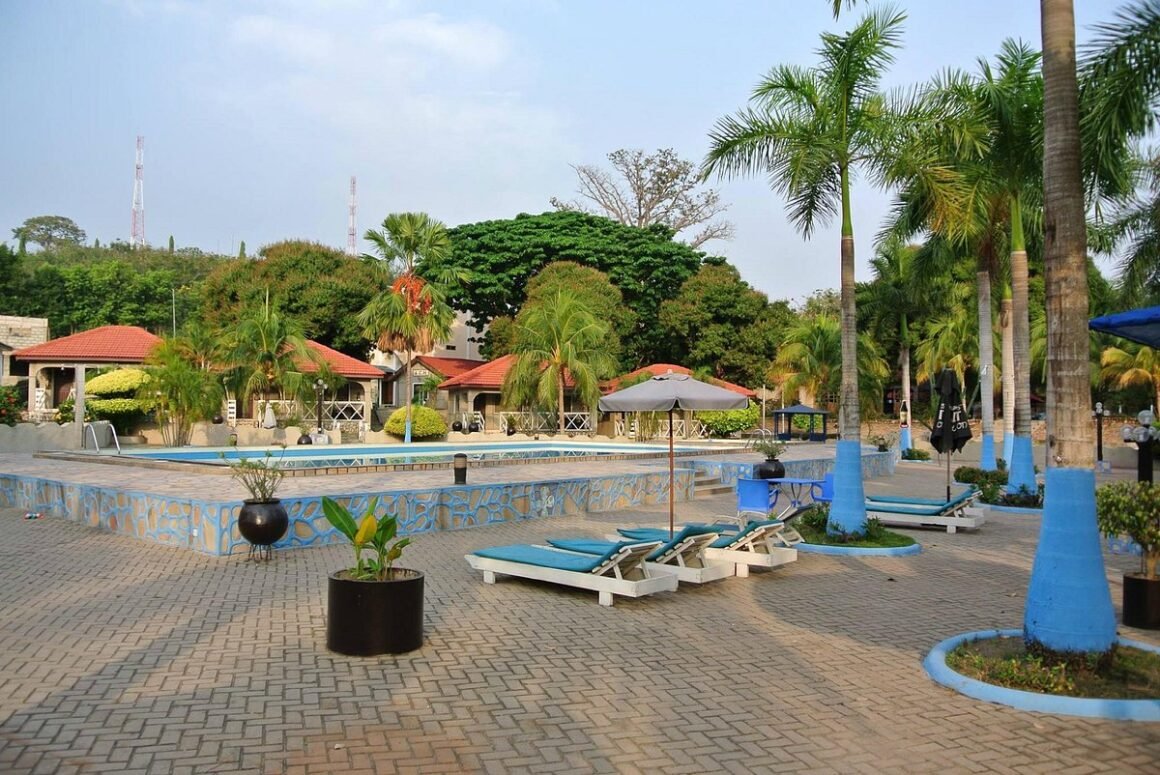
The natural beauty and serenity of this location provides the needed ambiance for the relaxation you have always desired. Escape from the noise and pollution of the city and come and experience hospitality at its best. The views from our 59 elegant rooms, 4 suites, and a private villa will leave you breathless on any day. Strategically located on a hilltop, overlooking the Akosombo hydroelectric dam and the second-largest man-made lake in the world.
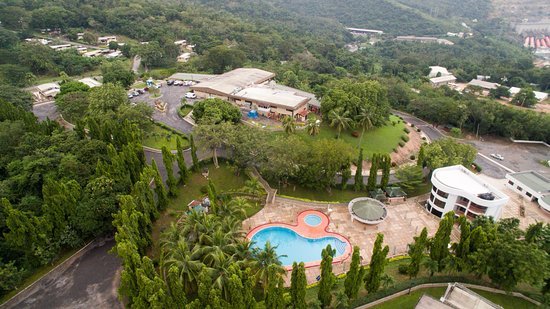
It is very rare in Ghana to find somewhere in such total harmony with its surroundings and yet sublimely comfortable as well. Aqua Safari Resort is one of the most stunning locations to visit with your family and friends. It provides the perfect spot to recharge your batteries. Aqua Safari Resort is designed to offer you the most prestigious Luxury Villa in Ghana. A perfect green scenery with wild trees, plants, and nice gardens. The resort provides the opportunity to get away from it all and relax in a peaceful atmosphere. Aqua Safari allows ultimate relaxation for guests in a true tropical environment. Their water park services which include Jet Ski, 7 and 14-seater speed boats, and pedal boats are always ready to add more fun to your stay.
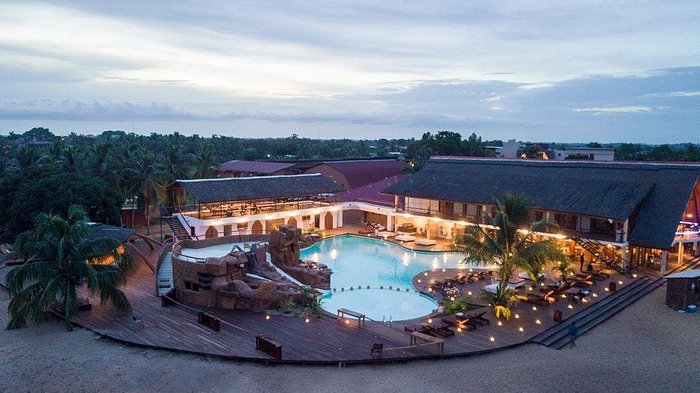
The Royal Senchi is a four-star resort set in the historic kingdom of Akwamu. It is situated on the west bank of the Volta River overlooking the eco-island known locally as Denkyenyam. The resort is committed to transforming the experience of guests from roughing in a harsh environment to amazing comfort and excellent friendly services in a fun and exciting environment.
Located in Atimpoku, 500 meters from the Adomi Bridge, the Aylos Bay Garden Restaurant & Lodge offers tranquil, comfortable, and serene waterfront accommodations and a spacious, delightful Garden Restaurant as well as campsites. The owners, Mr. and Mrs. Ayim, take pride in seeing to the comfort of their visitors and are continuing to improve and expand the facilities it offers guests.
With excellent service, cozy rooms, great food, and a gorgeous view of Volta Lake, Adi Lake Resort is worth every penny. You can swim in the clear water, kayak, or go in a speed boat at reasonable prices if you're not taking in the beautiful landscape. It's a place you will love to visit again and again. No regrets whatsoever.
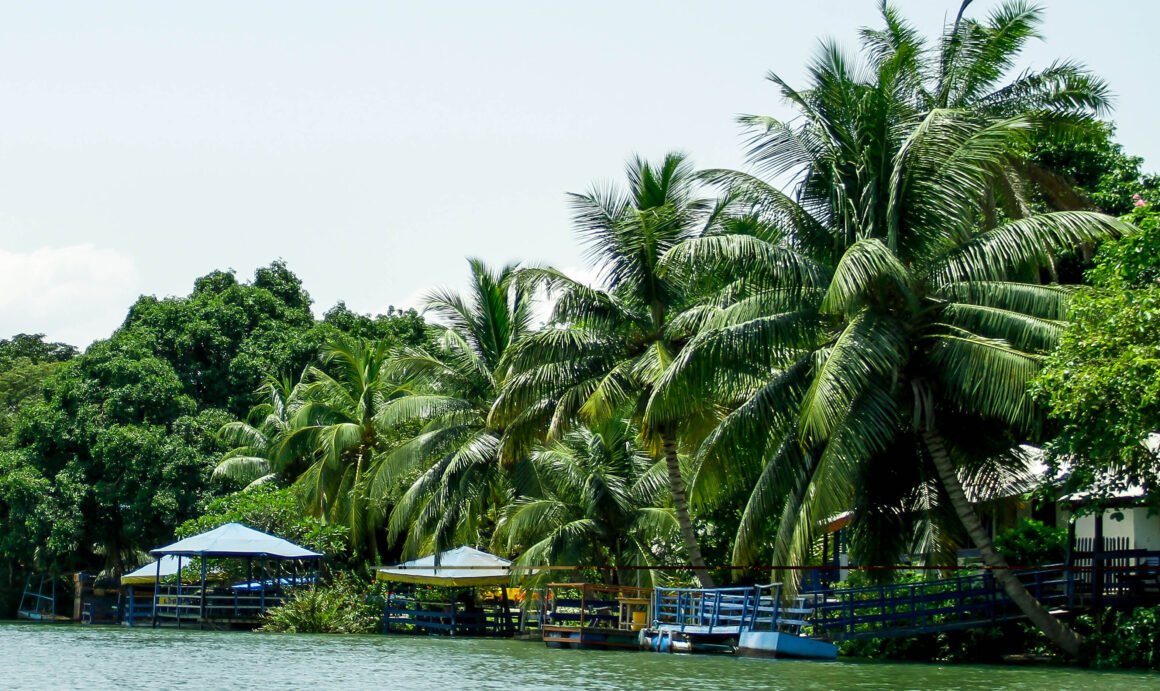
Beige Village Golf Resort is Located At New Abirem In The Eastern Region of Ghana about 25 minutes away From Nkawkaw, beside the well-maintained and elegant 9-hole golf course. The Resort has a combination of accommodation and classy recreational options for an out-of-town relaxation rendezvous. In Addition, the Resort Offers a golf school, practice range, spa and salon services, tennis court, bird observatory, restaurant, pub, outdoor games, amphi theatre, kids center, and much more.
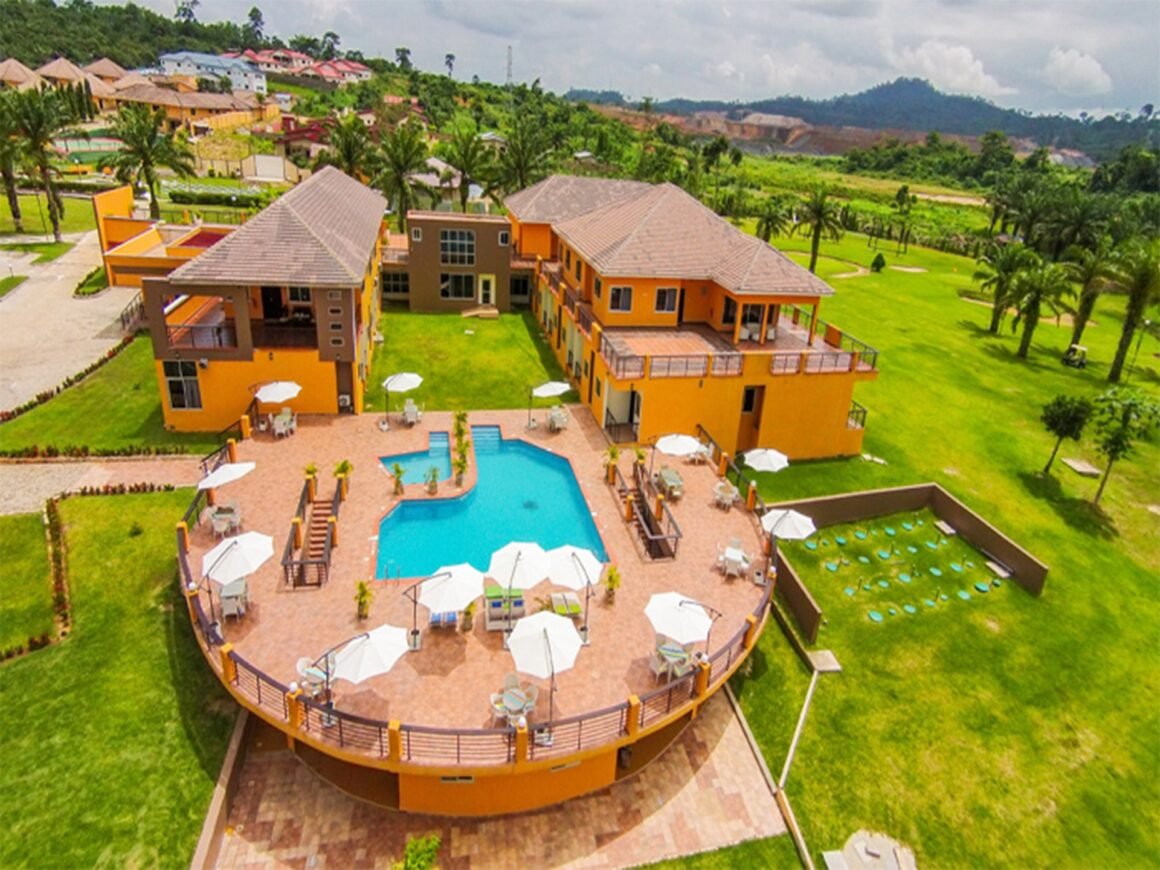
For a relaxing getaway, just one and a half hours from Accra, Holy Trinity Spa, and Health Centre in Sogakope is your ideal location The facility was designed with a primary focus on scientific relaxation, rejuvenation health promotion. There is a wide range of programs for exercise, wellness of body, spirit & soul, diet, hydrotherapy, and sauna treatments. If you need time to relax &revitalize, Holy Trinity Spa is ready to welcome you.

Busua Beach Resort is a peaceful serene destination for" staycationsers" located in Busua Beach, Ghana. Enjoy the beautiful, coastal view of the Atlantic Ocean while relaxing on your very own private terrace. These spacious beach fronting rooms offer complimentary WIFI, satellite TV, and complimentary buffet breakfast. While on vacation, enjoy a multitude of activities such as jet skiing, kayaking, and tennis. Soak up the rays on the sandy white beaches or cool down in either of the two outdoor swimming pools. With a tour guide, take a short 3 km hike to Butre by walking along the beach and climbing a steep hill that offers an excellent view over the beaches of Busua before treating your taste buds to great food at Busua's beachfront Ghanaian Village Restaurant.
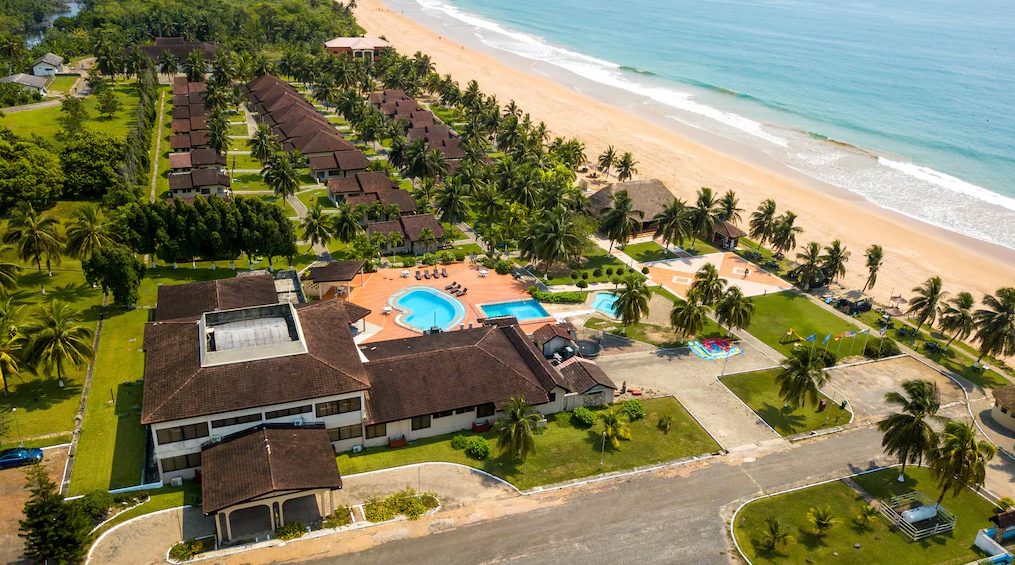
Located directly opposite the historic world heritage Elmina Castle which was built in 1482 by the Portuguese for trade, the Bridge House is more than a perfect location for a weekend getaway. Families can explore the picturesque fishing bay of the Benya Lagoon and other natural historical settings while having a great relaxation stay.
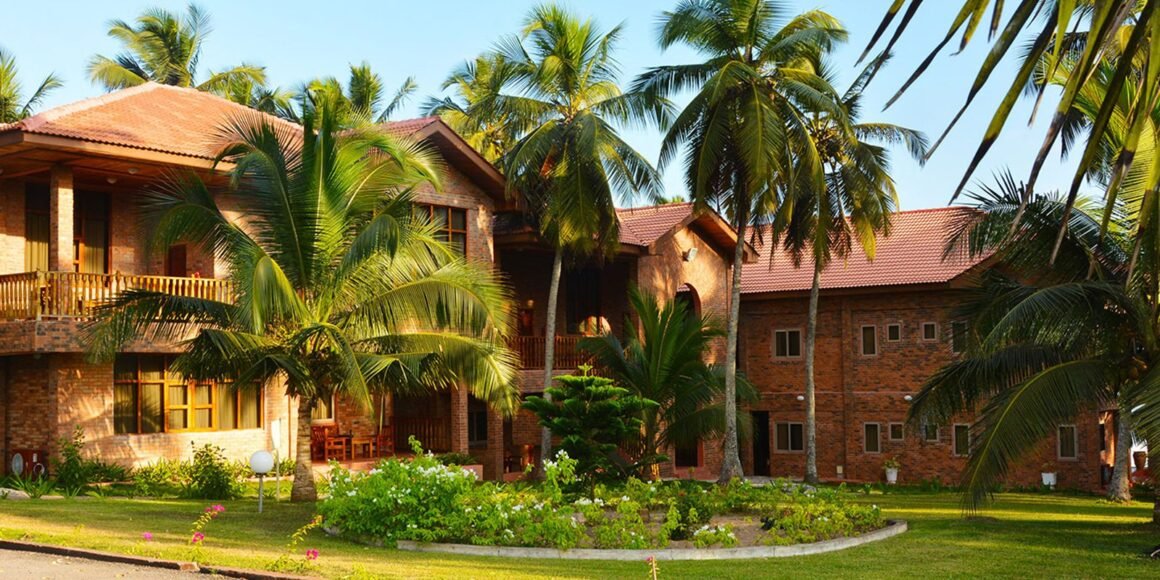
Escape to Best Western Plus Atlantic Atlantic Hotel, one of the newest hotels in the "Oil City" for an unforgettable staycation experience. Designed with you in mind and located at the capital of the Western Region of Ghana, this spot provides you with an all-in-one enjoyable experience from restaurants, shopping at your doorsteps, pool, cocktail lounge, night club, and a serene environment, gym, doctor on call casino, salon and many more. With all these facilities and services your staycation just got better!
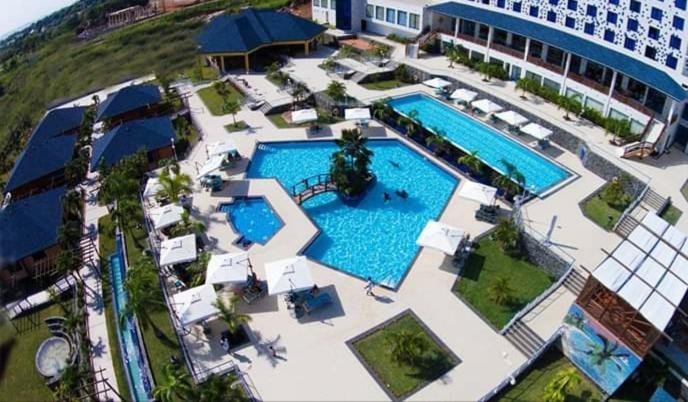
If you love nature or you are a green person then Axim Beach Hotel is the place you are searching for a vacation. With a focus on the sustainable tourism industry for Ghana, Axim Beach Eco Resort has adopted some environmentally friendly practices such as solar hot water and the use of bore water for facilities and recycled materials. It is located by the seafront in Axim with spacious feng shui rooms available for your relaxation.

Take a break from the everyday world and experience new heights of relaxation and total comfort at Hillburi Resort. Majestically positioned in the spectacular Akuapim mountain range in the Eastern Region of Ghana. The resort is 45 minutes drive from the capital, Accra. Hillburi affords breathtaking views over the evergreen valley and plains of the surrounding mountains. It is the perfect place to escape from your daily routine to recharge your body and have a good time relaxing. With the H-bar, pavilion, swimming pool, and children's playground, your staycation will be just as complete as the number seven.

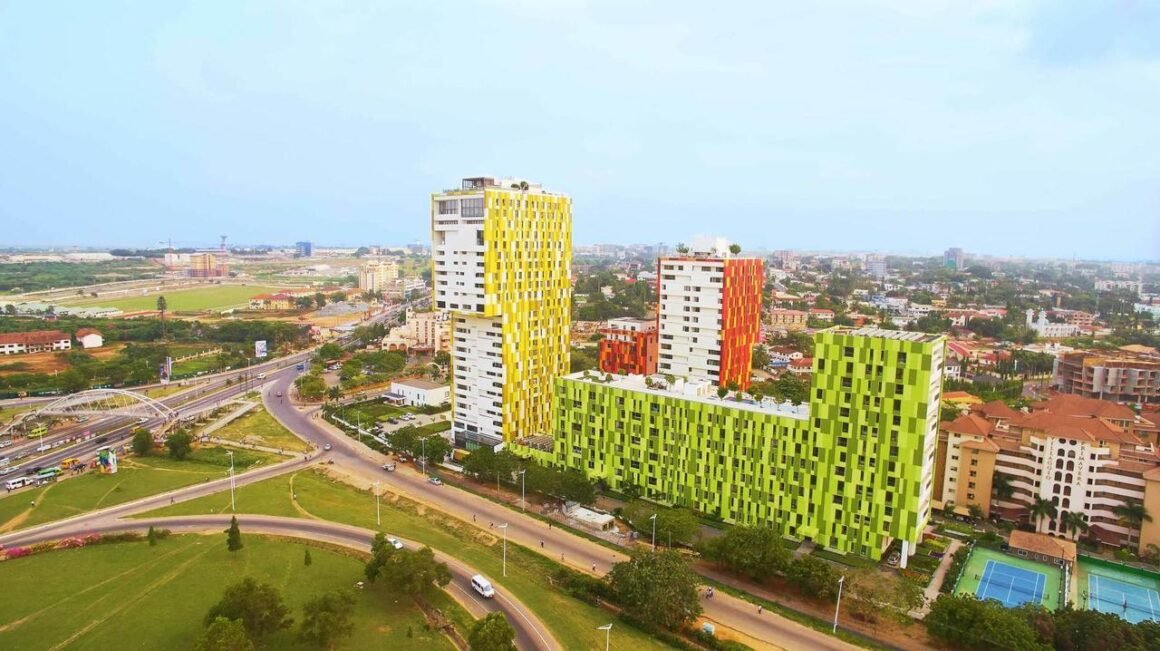
Have you ever wondered what it takes to live in one of Villagio's luxurious apartments? Do you sometimes think about the kind of people who are able to afford these apartments? Before I get you out of the mental mystery, let me break this down for you.
Villagio Vista is said to have one of the tallest residential buildings in Ghana, with 27 floors. It's no doubt that the building has made Accra's skyline very beautiful with its classy, colorful painting and luxurious look. The three magnificent towers located at Tetteh Quashie Interchange that make up Villagio Vista are named Azure, Aqua, and Alto.
The residential apartment complex has a pool and garden at the rooftop, and the project was inspired by traditional Kente fabric, hence its colorful Kente painting.
Now here's the real deal: if you are renting a two-bedroom apartment for a month, you have to pay $3,500. If it's a three-bedroom apartment you need, then be ready to cough up $4,500 a month, and all these come with the available facilities. According to a source close to the facility, the minimum duration of rent is a year. So, imagine if you want to rent a two-bedroom apartment for a year, you will have to pay $42,000. Should you opt for a three-bedroom apartment, then you are looking at paying $54,000.
Now that's what you need to live in such a luxurious, iconic, and contemporary apartment in the heart of Accra.

One of Africa's potential inline skating stars. Starting off on the patchy streets of Newtown, a suburb of Milo on the Roan, Paul Korankye will incur injuries that will leave him bruised with scars to remind him of his beginnings. Little did the young passionate skater know that this was the roadmap and blueprint to his greatness. Born to parents who are into pork business and would do all it takes to make a mark on the world stage when all other avenues fail to give him the necessary platform and attention.
Paul started like a toddler learning to skate, starting with the quad roller skates, which are the most common and basic roller skates used by virtually everyone. The young skater participated in his first race in Togo in 2009 and later competed in an international championship in India in 2013. He won the three stages of the race in the 1,000 meters, 2,000 meters, and hauled in 3 gold medals and a trophy for his cabinet. He made an incredible mark in the world of skating.

Despite setbacks, Paul remained determined to succeed. He aimed for the 42-kilometer inline speed skating race world championship to be staged in Berlin, Germany, that September. Paul had been bracing himself feverishly for the competition. "I'm really training hard here," he said. "I did 1-hour 10 minutes of bike training, heavy weights from 110 kilograms to 130 kilograms every day, and various training programs. We will make it with God's help."
However, Paul faced obstacles along the way. In an interview, he revealed how his Colombian coach hindered his progress by preventing him from obtaining a visa to compete in Argentina. Despite the challenges, Paul remained determined to break the world record with the right support.
Rolling on the streets of Accra with hope, Paul's journey from local streets to the world stage sets a tone for his quest to make himself and his nation proud. Though faced with setbacks, Paul's determination remains unwavering as he strives for greatness.

By: Pamela Ofori-Boateng
In today's busy world, time is a precious commodity as we strive to balance our numerous responsibilities. Maintaining a normal-sized garden can consume 2 to 3 hours of your week, which is where artificial lawn emerges as a superior choice.
Artificial or synthetic grass requires minimal maintenance, with no need for watering to thrive. It not only saves time but also helps conserve water. If you're contemplating growing grass at home but are concerned about the time, cost, and energy involved, consider opting for artificial grass.
In Ghana, there are three reputable companies that supply synthetic grass - Evergreen Arti Lawn, Blag Ghana, and Brixlandscape. You can reach out to them for guidance in selecting the perfect synthetic grass to enhance the beauty of your home.
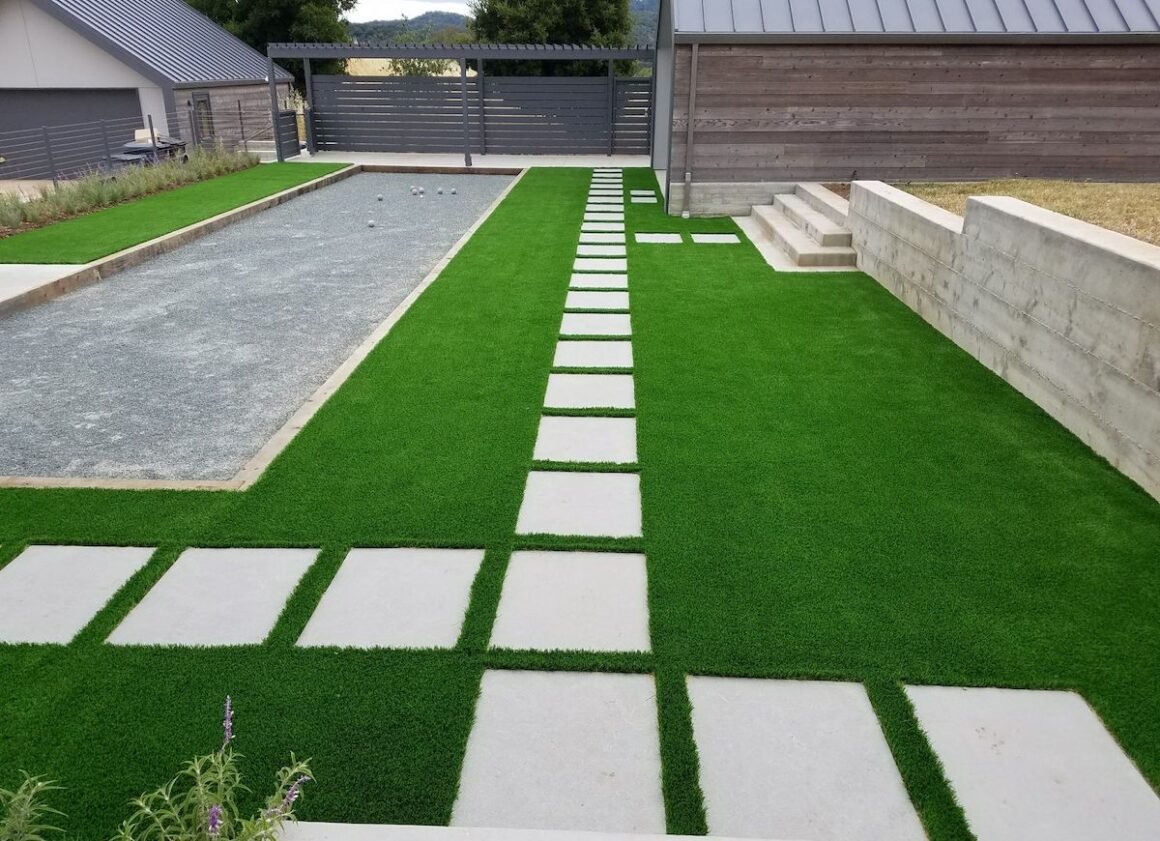
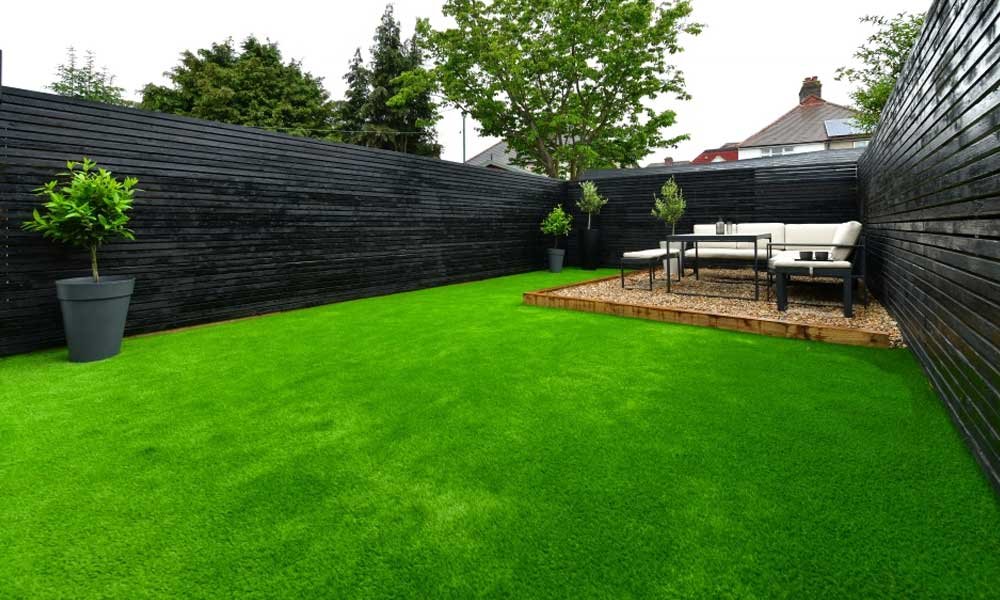

- A bundle of cocoyam leaves (NKONTOMIRE)
- 1 large onion
- 3 fresh tomatoes
- 1 medium smoked fish
- Sizeable WELE' (cowhide) and salted fish (KOBI)
- 3 tablespoons palm oil
- Salt and pepper
- 1/2-pint water
1. Wash and boil cocoyam leaves until soft, then mash or shred the leaves.
2. Wash and slice the onion and tomatoes, then grind them with pepper.
3. Heat palm oil in a pot, add onions, and stir for a few minutes. Then add the ground pepper and tomato mixture. Leave to simmer.
4. Wash and break the fish into small pieces, then add to the stew. Simmer for some time.
5. Add 'wele' and salted fish (Koobi), and cook for 3 minutes.
6. Add shredded or mashed cocoyam leaves and season to taste. Allow to simmer for five minutes until cooked.
7. Serve with boiled plantain, yam, or rice.
Nkontomire, or cocoyam leaves, are not only sumptuous but also high in nutrients, making them good for the body. Their richness in vitamin F and magnesium makes them beneficial for controlling high blood pressure and protecting the heart. They are also a fine source of dietary fiber.
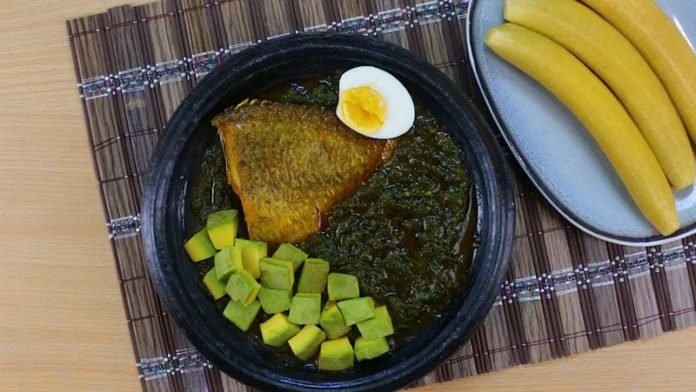
- Onions
- Peppers
- Mushrooms
- Carrots
- Garlic
- Vegetable stock cubes
- Oregano
- Black pepper
- Tomato puree
- Cheese
- Courgette (zucchini)
- Oil
- White sauce
- Lasagne sheets
1. Dice all vegetables, such as courgette, onions, peppers, mushrooms, and carrots.
2. Heat a pan with a little oil, fry onions and garlic until soft.
3. Add the vegetables and stir-fry with vegetable stock cubes, oregano, and black pepper.
4. Cook for 5 minutes, then add chopped tomatoes and tomato puree. Simmer for 10 minutes and set aside.
5. Make white sauce and cook the lasagne sheets halfway.
6. On a baking sheet, lay one lasagne sheet and top it with white sauce, followed by the vegetable sauce.
7. Repeat for 3 or 4 layers, then top with cheddar cheese or any cheese of your choice.
8. Bake in the oven for 30 minutes and serve hot. Enjoy your vegetable lasagne!


"Kelewele" is a popular street snack from Ghana, made from ripened plantains mixed with spices. It is readily available on most street corners, especially in the evening.
- 35g fresh ginger
- 1 small clove of garlic
- 1 medium-sized shallot or white onion
- 1 jalapeño pepper or half a habanero chili
- Juniper berries (optional)
- 4 pineapple sage leaves (optional)
- 10g fresh thyme (optional)

1. Place all ingredients in a blender.
2. Add a little water if required.
3. Blend until smooth and set aside.
- 1/2 teaspoon red chili powder
- 1/2 teaspoon mixed spices
- Salt to taste
- 2 large ripened plantains, cut into cubes
- 600 ml sunflower oil
1. Place the cubed plantains in a bowl.
2. Add the chili powder and mixed spices.
3. Add 2 tablespoons of the ginger mix.
4. Salt to taste and mix until well combined.
5. Pour oil into a saucepan and heat on medium for 3 minutes.
6. Add the spiced plantain cubes and fry for about 7 to 8 minutes, stirring to ensure even cooking.
7. Using a slotted spoon, remove the golden-colored plantain nuggets into a colander covered with kitchen blotting paper to absorb any excess oil.
You can serve Kelewele with roasted peanuts or fruit juice. Enjoy!
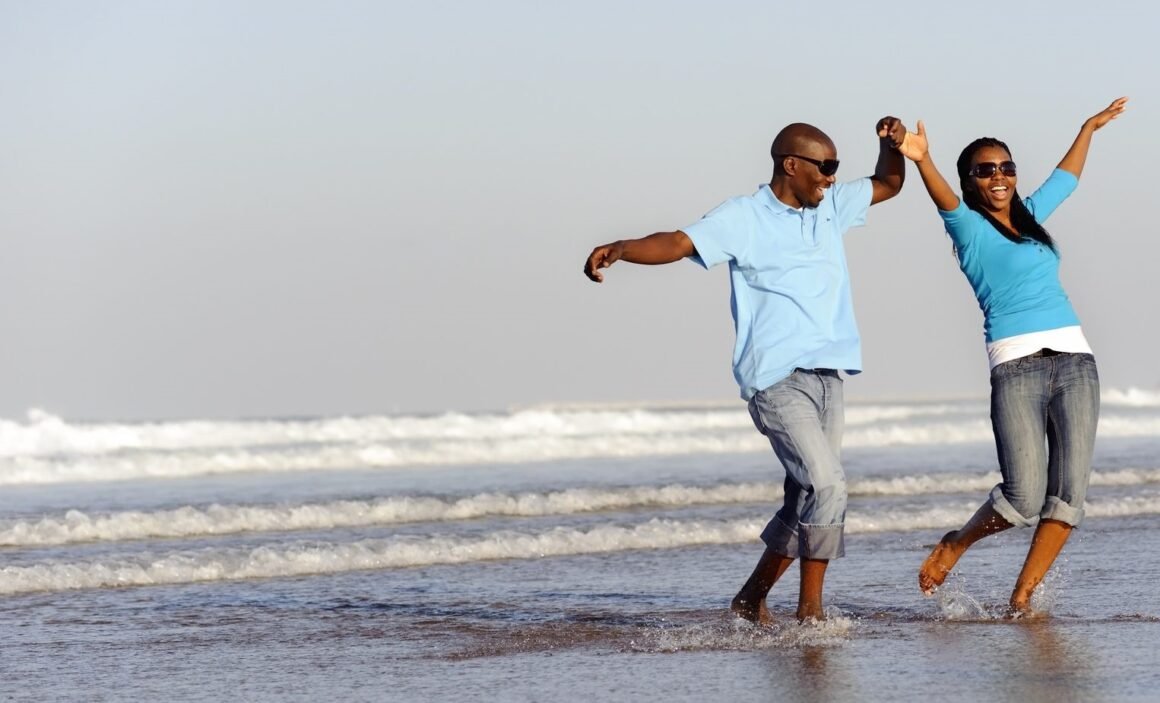
There is nothing wrong with you taking a little break to relax and de-stress. However, while having fun and enjoying yourself on a vacation. it's easier to forget your fitness routine and we don't want all your hard work to plummet or to experience a setback so here are some easy fitness tips to ensure your vacation is fun and fit.
Simple fitness idea like walking is good for you.
Research suggests it can lead to reductions in heart diseases, blood pressure level and improve body composition and bone density.
So, taking a walk a bit faster along the beach side on vacation can lead to improved body composition and bone density.
Most hotels and vacation places nave fitness centers with treadmills, try to jump on the treadmills every any for a few miles and that should be enough to keep your fit.
Whatever the chosen destination for weekends away or a relaxing holiday, you can still remain fit by jogging around early in the morning, jogging in the morning is a good idea because it won't interfere with your relaxation or sight-seeing.
If you have been doing all of the above fitness routine, schedule a sports massage during your vacation. It can serve as a reward for your hard work and also loosen up some tight muscles,
On a vacation, you may be engaging in activities that are not part of your normal exercise routine like hiking. biking and swimming. One of those activities (Cross training activities) can be a substitute for your run.
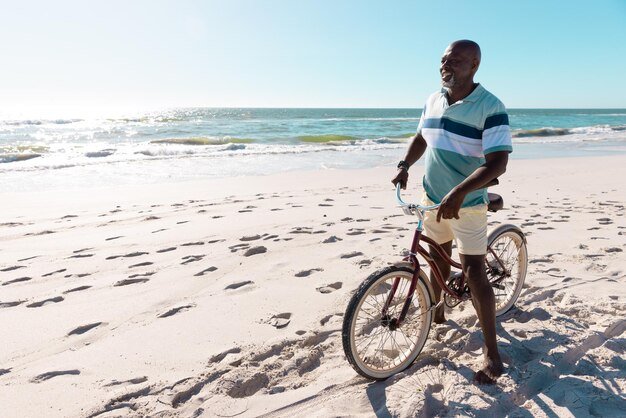



By: Pamela Ofori-Boateng
The right positioning of a mirror in a room can transform a dark, stuffy space into a gorgeous one by offering the illusion of an additional window. Mirrors can add style and elegance to a room, no matter the size and style. Using a mirror as a decorative piece in your home doubles the impact of other pieces as well as the architecture used in decoration. Mirrors can also be a statement of art on their own. Find a mirror with a distinct texture and style. You can bring life into an old mirror with a coat of paint and pair it with a console table to create a gorgeous center of attraction in your living room. These images of simple decoration ideas will help you create a relaxing and beautiful home.



For too many of us, life has become a juggle of yo-yo diets and emotional roller coasters, which reflect on the scale. But it doesn't have to be this way forever! Stressors are reflected through our decisions to adopt unhealthy habits such as emotional eating, snacking, drinking excessively, and sluggish behaviors. The old saying "you win some, you lose some" could easily be rephrased when it comes to dieting: "You lose some, you gain some or more."
In some cases, we choose to take on a challenge of dieting that we cannot win. We move from one weight loss regimen to the next, constantly trying out the latest diet fad and praying to shed a few pounds for the wrong reasons. Instead of feeling confident after we decide on a lifestyle change, we hold on to memories, clothes, and pictures that remind us of how far we have come and deep down we doubt that we can maintain such a healthy weight loss long term. There is a solution to all this healthy living chaos! Here are three rules that I abide by in my current journey of healthy living that I wish to share with my readers. These rules are simple to follow and can create a solid foundation in your healthy living journey ahead: Change Mindset, Focus on Proper Nutrition, Stay Active.
Behind everything you do—even your unhealthy habits—is a thought that keeps you from getting healthy. Making a decision to change bad habits into positive ones always comes with a challenge of doubt. Oftentimes, we second-guess our decisions and make excuses as to why we might not be able to achieve them...self-doubt is our own worst enemy.
It is essential to know the main reason why you want to change your current diet or lifestyle. Ask questions like: Am I dieting for just a season? Is this decision to lose weight associated with a medical scare? Do I want to live a long fulfilling life with my family? For example, you can decide to lose weight for the following health reasons: lower cholesterol levels, decrease chances of pre-diabetes, obesity, heart failure, or stroke.
A parent can decide to get healthy for the sake of his or her children or a child’s decision to shed the pounds to increase speed in a sport. Whatever the reason is, you must start with a shift in mindset. Most diets do not work because we often set unrealistic goals that make us frustrated when we attempt to achieve them.
Developing a solid reason for the weight loss gives the brain a reason to stay focused. By casually deciding to lose weight, we sometimes reverse our success because we were never fully committed mentally to make a change. Without carefully analyzing the reasons for change in any area of our life, we do not build confidence, self-motivation, and consistency to want to maintain the change after we start the diet. Preparing your mind with constant affirmation, research, and motivation about why you have chosen to shed a few pounds helps lessen the burden that comes with the process. Instead of beating yourself up every day about losing weight, you can start by making small changes such as journaling reasons for the change daily, substituting one unhealthy habit for a healthier choice each day or week, or practicing positive thinking and envisioning your change in your present time. Set aside a period of time and practice visualizations of the success each day that leads to your start date; start with small changes and remain constant in order to achieve your goal.
Every time we reduce our calorie intake during a diet, our metabolism slows down, leaving us feeling sluggish and frustrated. Even worse, once we reach our weight goals and eat regularly again, we regain all the weight back in no time. In an effort to lose the regained weight, we start yet another diet…and another, each of them wreaking new havoc on our body and metabolism, making it harder to lose weight and sustain the results with every new try. There is hope in proper nutrition and consistency!
Nutrition is by far the most important step in a healthy lifestyle change or diet. Most people do not have proper nutrition because they do not know what it is. It is very common for the average person to understand what is good for them and what is not. Knowing what is best for you can be extremely difficult and our choices reflect on our outer being. Your body needs the right fuel for your hectic, stress-filled schedule. The best way to get what you need is to enjoy a wide variety of nutrient-rich foods that are packed with energy, protein, vitamins, and minerals. Our daily intake should consist mostly of fruits and vegetables (rainbow colors), whole grains, low-fat dairy, and lean proteins from meat, fish, or poultry.
High-fat, high-sugar foods and drinks, such as snack foods, candies, and sugary drinks, pose the biggest nutrition challenge for many. Eating smarter does not mean you have to immediately go sugar-free and fat-free. You can make a big difference in your calorie intake by just eating and drinking smaller portions and by making empty calorie choices less often. The key is to moderate, not eliminate. Watching portion sizes is an easy way to cut back without cutting out. If you want to cut back on sugar, drink water instead of sugary drinks and eat desserts less often. Focus on developing a conscious habit to choose foods packed with nutrients to nourish your body, maintain blood sugar levels, and rich in fiber to keep you full longer. By perfecting your nutrition, you can increase your chances of achieving weight loss goals and sustaining the pounds shed automatically.
Physical activity plays an essential role in ensuring health and well-being. Physical activity benefits many parts of the body—the heart, lungs, bones, kidneys, blood, digestive system, and immune system. By staying active, we improve our body's ability to function properly and reduce risk factors such as decreasing blood pressure, heart disease, diabetes, improving posture and balance, lowering body mass index and body fat, improving mental health, and decreasing stress. Despite our hectic day-to-day schedules, we must find time to exercise or maintain constant motion for better health.
Examples of physical activities to partake in include walking, stretching, yoga, strength training, biking, swimming, dancing, and running. Finding activities that interest you increases commitment and enjoyment of physical activities; do not partake in strenuous activities that might cause injury and serve as a chore to you. Those who start with small changes such as walking 20 to 30 minutes per day often end up able to make more and bigger changes to improve health and well-being, thus shedding the pounds and keeping them off. Maintain these three simple rules at the back of your mind each day to keep you on track during your healthy lifestyle transition and remember: CONSISTENCY IS KEY!
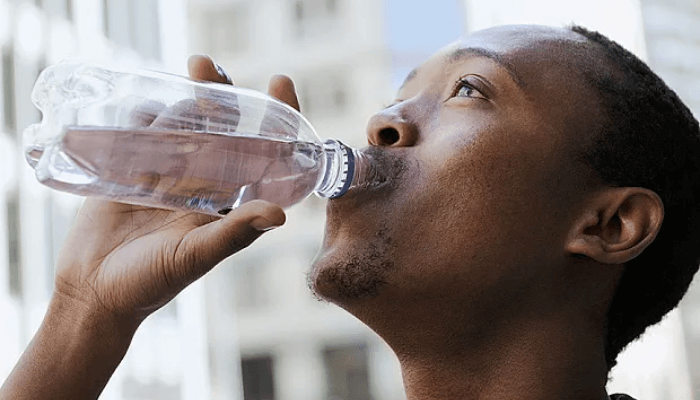
Drinking a healthy amount of water daily is vital to your overall health. Water provides numerous health benefits and is proven to decrease symptoms of chronic diseases. At times, we underestimate the role water plays in our body's ability to function daily, but health researchers have proven that water is one of the most essential nutrients the body needs to function properly.
Did you know that the tissues and organs of the body are mainly made up of water? The human body consists of approximately 55% to 79% water, depending on the size of a person. The muscles in our body consist of approximately 75% water; the brain consists of approximately 90% water; bones consist of approximately 22% water; and the blood consists of approximately 83% water.
Every cell in the body needs water for everyday use; therefore, it is important to drink enough water daily. For example, if the brain consists of 90% water and you do not supply the body with enough water, the brain cannot function at its full potential, and this can cause headaches or migraines.
Water transports nutrients and oxygen into cells, protects vital organs, regulates body temperature, detoxifies, protects and moisturizes bones and joints, and aids with metabolism.
Consuming eight 8oz glasses of water a day is the standard requirement by health educators to keep our bodies healthy, happy, and detoxified. Though water is vital in a variety of bodily functions, we often tend to ignore the advice of health experts.
You will be amazed by the benefits of drinking water versus sugary drinks as follows:
- Natural Remedy for Headache and Other Body Aches: Drinking water frequently helps to relieve symptoms of headaches and other body aches due to dehydration. Dehydration is a common cause of headaches and migraines.
- Promotes Healthier Skin, Hair, and Appearance: Hydrating the body improves the look of the skin, hair, and nails by replenishing skin and hair tissues and moisture. The result is a natural glow and a younger look.
- Helps in Digestion: Drinking water increases metabolism and promotes regular digestion. Drinking a healthy amount of water may also reduce the risks of bladder and colon diseases by flushing out toxins and waste products from the body. Water flushes out the organs in the body and hydrates them for better function.
- Relieves Fatigue and Promotes a Good Mood: Drinking water helps the body hydrate and feel good. The body uses water to detox properly, and if the body lacks water, the human organs work excessively, causing exhaustion.
- Less Sick Days: Drinking plenty of water helps fight against flu and other ailments like kidney stones, constipation, heart attack, and sprains and cramps. Drinking water improves the immune system and decreases the risks of respiratory diseases, intestinal issues, and joint problems.
To help you get your daily dose of hydration, here are a few tips to drink more water daily:
- Drink a glass with each meal. This trick also helps you eat less.
- Keep a bottle with you at all times to encourage consistent sips throughout the day.
- Set a goal and keep track of when you consume water in a given day.
- Flavor your water with fresh fruits and veggies such as lemon, apples, celery, cucumber, oranges, basil, kiwi, and pineapple. Drinking plain water can become boring to take in; flavoring your water gives it a different taste and makes it easier to drink more.
- Eat more fruits and vegetables high in water content such as celery, watermelon, cucumber, lettuce, green pepper, oranges, strawberries, grapes, baby carrots, cantaloupe, and broccoli.
- Substitute half of your daily sugary drinks with water. Choose water over a bottle of Pepsi or processed fruit juices. Most sugary drinks contain high amounts of sugar that can increase chronic diseases such as diabetes and obesity.
To sum it up, drink water throughout your day to keep you hydrated. One can easily confuse thirst with hunger, so it is important for us to listen to our bodies and choose water before food. During intense sweating, drink enough water to compensate for lost fluids.
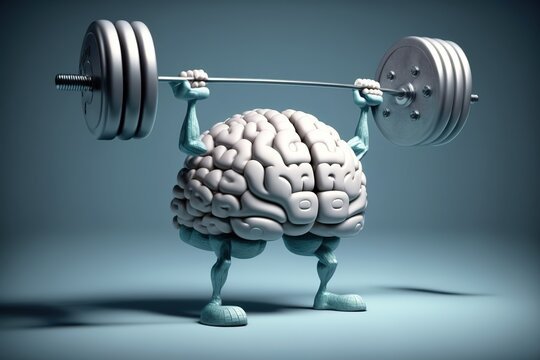
Compiled by: Kwame Sargon
“Uh Dad, Green Bay isn’t even a city on this map.”
“Don’t worry, when I’m done with that team, it will be.”
That's what the legendary coach, Vince Lombardi, told his daughter when he and his family were about to move from New York to the tiny town of Green Bay, Wisconsin. Lombardi was widely regarded in the league as one of the best offensive coaches in the game of football. But until that point, he had only had a chance to prove himself as an assistant coach.
So, although he had to relocate his family to Green Bay, he was excited to get his first shot at being a Head Coach. So excited, in fact, that his first words to his team upon arrival were:
“Gentlemen, we are going to relentlessly chase perfection. Knowing full well we will not catch it because nothing is perfect. But we are going to relentlessly chase it. Because in the process we will catch excellence. I'm not even remotely interested in being just good.”
This speech captivated the team, especially the starting quarterback, Bart Starr, who said, “I couldn’t even sit in my chair, I was so excited.”
This was a team that had little to believe in. Before Lombardi, they had not had a winning record in over a decade. So they knew that in order to achieve the success that their coach expected, they had an uphill battle. So, they worked and never stopped.
The coach demanded great effort from each of his players all the time. He personally would work from 7 in the morning until 11 at night—relentlessly chasing perfection. This relentless work created a powerhouse in Green Bay. Lombardi won so many championships with this team that Green Bay soon became known as "Title-Town."
If you've ever had a goal, you know how exciting it can be at first. You can see the perfect "after photo" of your life when the goal is achieved, and you love what you see. You imagine all of the great things about the "new you" and you can't wait to get started working towards that goal.
Then it's time to actually do the work. And whether that work is putting pen to paper or putting foot to treadmill, you get a sudden rush of being completely overwhelmed. You see just how much work it's going to take to get from where you are to where you want to be. Then you get paralyzed by the fact that you don't know where to begin.
So, you procrastinate. You see that you are so far from achieving the perfect body. You are so far from getting that degree. You are even so far from having a personal relationship with God. And right now, doesn’t feel like the "perfect time" to get started. So why bother? Why not wait for a time that does feel right?
This perfectionism is one of the key de-motivators in achieving our goals. After our initial enthusiasm wears off, we hit the middle of the journey, and the perfect body seems so far out of our grasp. So, we think, "What's the point? We'll never get there."
Chasing perfection does not have to be like this. Lombardi and the Green Bay Packers are proof! They used perfection to motivate them to create a team of excellence. So, what can we do to become motivated by perfection, rather than paralyzed? Here are three proven ways to use perfection to your advantage:
The biggest reason that we become demotivated by perfection is because we get the feeling of being overwhelmed. When our brain takes a look at how much work we need to do in order to reach perfection, it believes that it is hopelessly out of reach. Chunking is the process of shifting your focus from that larger goal into smaller chunks that are easier for your brain to comprehend. If your goal is to follow a 12-week exercise plan, it can be overwhelming when you're tired on day 4 and thinking about the fact that you have 80 more days of this. But if you shift your focus to simply accomplishing the workout plan today, you are far less likely to become overwhelmed. Then, before you know it, 20, 40, 60 days have passed, and you are more confident than ever that you can make it to the end. So, break up your idea of perfection into small chunks. Use the larger goal to set your direction, but then focus only on what you need to do next in order to achieve it.
“Doing is better than perfect.” — Facebook company motto
When I first started writing, I had a huge problem with perfectionism. I would have spurts of inspiration where I would write like crazy, and then I would have other days when I didn’t feel inspired, so I would procrastinate. I would wait until the "right inspiration struck" to start writing again. This led to one month of writing 10 articles, then the next month writing just one. I wasn’t able to build an audience because the audience didn’t know what to expect from me. And during those "down times," I felt hopelessly frustrated that I couldn’t find inspiration.
Then I read the book "On Writing Well" by William Zinsser, in which he advocates for "writing terrible first drafts." Why? The reason is he recognized the fact that the brain becomes overwhelmed when we seek perfection. There is a much clearer path from a blank screen to a terrible first draft than there is from a blank screen to a perfectly written article. Because I knew that whatever I came up with didn’t have to be "perfect," I had the freedom to simply write. Then, once I had a terrible draft written, it would be one step closer to the perfectly written article that I was seeking, leading to more productivity, less procrastination, and less frustration. So just do it. You may not have the perfect workout; the only bad workout is the one that you didn’t do. It may not be the perfect time to start that project, but any progress is better than no progress. You can't improve on something that doesn’t exist in the first place.
Despite his best intention of perfection, Vince Lombardi knew what he was getting himself into. He had a losing team that was far from championship caliber. But he didn’t expect championships out of his team. He didn’t expect perfect results; he expected perfect effort. Results are ultimately out of our control. You could follow a strict diet plan and exercise every single day, but you cannot control how your body will respond. You may lose 5 lbs, you may lose 10 lbs, you may lose 20 lbs! Perfection is not found in results. Perfection is found in your effort, making sure that you do the right things to make progress every single day. That is the only thing you can control when working toward your goal. The result is ultimately just a guess. So, shift your idea of perfection from the results to the process that it will take to get there. Always ask yourself, “How can I do this better?”
Perfection is something we all strive for; we want to be a part of creating something truly great, whether that is a great product, a great body, or a great life. This pursuit of perfection has the power to motivate us or to completely paralyze us. Do not become paralyzed by the pursuit of perfection. Break up your huge goals into small chunks, "write terrible first drafts," and focus on your effort, not your results. And find the strength to just do it. You don't need to be great to start, but you do need to start to be great.

Managing natural resources is a critical and complex issue for both developed and developing nations. It is technically thought-provoking and often entails difficult trade-offs for some political and socio-economic considerations. It drives developments and ensures poverty reduction.
Ghana is a nation endowed with rich natural resources. Its land, water, forests and fisheries underpin the sustained productivity on which Africans depend directly for economic growth, poverty reduction and sustainable development. However, strategies to reduce poverty should not lead to further degradation of water resources or ecological service.
Finding a balance between these objectives is key to sustainability. Ghana's current pattern of development puts a lot of stress on the environment. Faced with increasing population density, growing climate change threat and an incessant exploitation of natural resources (including fisheries and timber) to meet the legitimate socio-economic aspirations of the people, Ghana's natural resources are being depleted at an alarming rate. Consequently, many Ghanaians (over the past few decades) have been subjected to the ravages of either droughts or floods-a situation that now threatens the Ghana's economic strides.
Although current policies, institutional efforts and overall environmental awareness in the country are commendable there is still the need to continuously adopt realistic and implementable environmental policies and strategies to safeguard the economy. Proper management of Ghana's economy requires that efforts should be redirected into more environmentally sustainable programs and practices. Assessment of the potential environmental impacts of development projects and planning in advance to mitigate or eliminate these impacts will decrease environmental costs to the economy and make more cost-effective use of the country's resources. Like the benefits of increased education or improved governance, the protection, restoration, and enhancement of our natural resources tends to have multiple and synergistic benefits.


By: Pamela Ofori-Boateng
It is no longer news that braids of all types has been the major trending hair style among Ghanaian women for some
time now. This development has successfully relegated the popular "Brazilian" hair family to the background. Not so long ago, the craze for Brazilian hair was so intense that ladies that one would have never envisaged it taking a nose dive this early. However, that is what we see now. The whole enthusiasm in “Brazilian hair “is gradually declining and more women have cling to braiding, a hairstyle that reinvents over the years.

Although it takes longer hours to have your hair braided with wig depending on the length and size of the braids, most Ghanaian women now prefer braiding to other hair styles because it is cost saving, stands all weather and easier to style.
Not only is the look beautiful, it also takes away the stress of weekly visits to the salon especially in this"Dumsor" era.
However, it's sometimes difficult to spend long hours and sometimes a whole day at the salon which could have been used for something profitable just to get your hair braided. Also, we are in the 21st century with more career women who have kids and school on weekends at the same time with little or no time for themselves so it is not surprising that some enterprising women have thought about it and have finally come up with a solution- Braid caps!!
A braid cap is similar to a weave cap but the only difference is that it is in a braid form. It is easy to fix for all occasions and it gives you the same look of a braided hair in some few minutes.
Braid caps, which are more or less new in the system both as a business and as a fashion trend is increasingly becoming popular among Ghanaian women especially millennials. Rs Jacquelyn Armerley Acheampong, owner of Ora House of Fashion who started braid cap business at her home around Nungua barrier, a suburb of Accra and uses Facebook as a major platform to sell her products said "I started this business a little over three months ago and the response is huge from here in Ghana and worldwide. “I realized there was a market niche for that, since most ladies go through the pain of getting their hair braided and spend a lot of time doing that" She added.
The cap is usually worked on in Ghana by some local salons or ladies who can just braid. She started business at Nungua barrier but other areas like Korle Bu and Spintex are also catching up on the business. The price for the braid caps ranges from GH 200.00 to GH350.00 Lola's braiding center, located at West Legon near Haatso, another suburb in Accra, Ghana also ventured into the braid cap business about four months ago and a visit to their Facebook page indicates booming sales from enquiries people make on line. In an interview with Neighbourhood Gong, a worker at Lola's braiding center, who gave her name only as Benedicta, mentioned that the braid cap is in high demand and people have already started booking for their Christmas caps. A wig Cap from Lola's braiding center ranges from GH300.00 to GH350.00 depending on the length of the braids. But for trust purposes, one would have to deposit some money through mobile money as commitment fee before work on the cap could begin.
Grace, a lady who got her twist braid cap about a month ago, having seen it first on Facebook said "I got it because it's stylish and I do not have the time to frequent the salon especially with this incessant power supply issue the country is facing.
Nana also mentioned her busy schedule and easy to style nature of the braid cap informed her decision to purchase her short box braid cap. Braid cap business, is a new wave serving as both a source of employment for the youth while offering Ghanaian women some form of relief in their beauty routine.

By: Pamela Ofori-Boateng
Bobbi Brown believes that all women are pretty without makeup and can be pretty powerful with the right makeup so it's no surprise that most Ghanaian women have become so interested in makeup.
The makeup industry is barging in Ghana and this development has led some of the industry giants like Maybelline New York, Zaron, and a host of others to launch their makeup brands in Ghana.
Neighbourhood Gong Magazine spoke to Priscilla Nyarko, Creative Director of Glam Faces Makeup Studio on the right way to apply makeup and these are her professional tips for achieving that flawless and seamless look.
1. Ladies, we know you want to line and accentuate those lips but using a black pencil is a no-no. Please stick to the browns or a pencil that is similar to the lipstick you are about to use.
2. Use dark brown pencils or shades of brown depending on your skin color to fill in your eyebrow. Do not use a black pencil.
3. Avoid using a shade or two shades of foundation lighter than your skin in order to achieve the correct look. The right way is to find a color that will easily blend with your skin color.
4. Women should invest in quality makeup products even if it's expensive since using cheap or fake makeup products may cause skin irritation and breakouts.

5. Invest in good makeup tools.
6. The hands are good but they won't give you the seamless look you want to achieve so avoid using your hands for applying makeup.
7. You can only get the correct foundation and loose powder for your skin type by testing them on your skin before buying so buy your makeup products from shops you can test the products.
8. Coming out to see how a tested makeup looks on your skin is ideal since testing in a dark room or a room with too much light may not give you the appropriate shade.
9. It's not advisable to go to bed with your makeup on since this practice may cause skin reactions like breaks, pimples, and rashes.

The world of work, and the related education requirements, is changing in many ways and on many levels. The traditional industries of the past half-century into which our fathers moved to work are no longer the same, while the path in education and the knowledge required to excel in new environments are constantly and dramatically changing.
At the same time, looking at the path designed by our national education policy to mold students to enter the work environment, it appears stagnant. Technology, Science, the Arts, and Engineering programs graduate boatloads of fine students who have little or no impact on 'real' national development.
Educational policymakers, educators, and teachers ought to be eager to engage in the conversation regarding the following:
- An understanding of contemporary [21st Century] skills
- Consider ways in which these skills are critical for all students in our school/district classrooms
- The fit of these skills with our development agenda
- Think about fundamental beliefs and practices for contemporary [21st century] teaching in terms of key elements of differentiation (mindset, curriculum, assessment, instruction, and management)
- Creating students who can reflect on challenges, ask questions, and think ahead
- Encouraging creative and innovative minds who challenge themselves and others
- Core Subjects: English, reading, world languages, arts, history, government, and civics, as well as 21st-century themes such as global awareness, finance/economics, entrepreneurship, civic and health literacy
- Learning and Innovation Skills: Creativity and innovation skills, critical-thinking and problem-solving skills, communication and collaborative skills
Information, Media, and Technology Skills: Information, media, and ICT literacy
Life Skills: Flexibility, initiative and self-direction, social and cross-cultural skills, productivity and accountability, leadership and responsibility
Ghana has to look at itself to identify its natural strengths, classify our national development priority needs relative to those strengths for the next two generations, and then design a path to move the nation effectively to that level. We have the minds to achieve this goal if we truly desire to move and affect every individual.
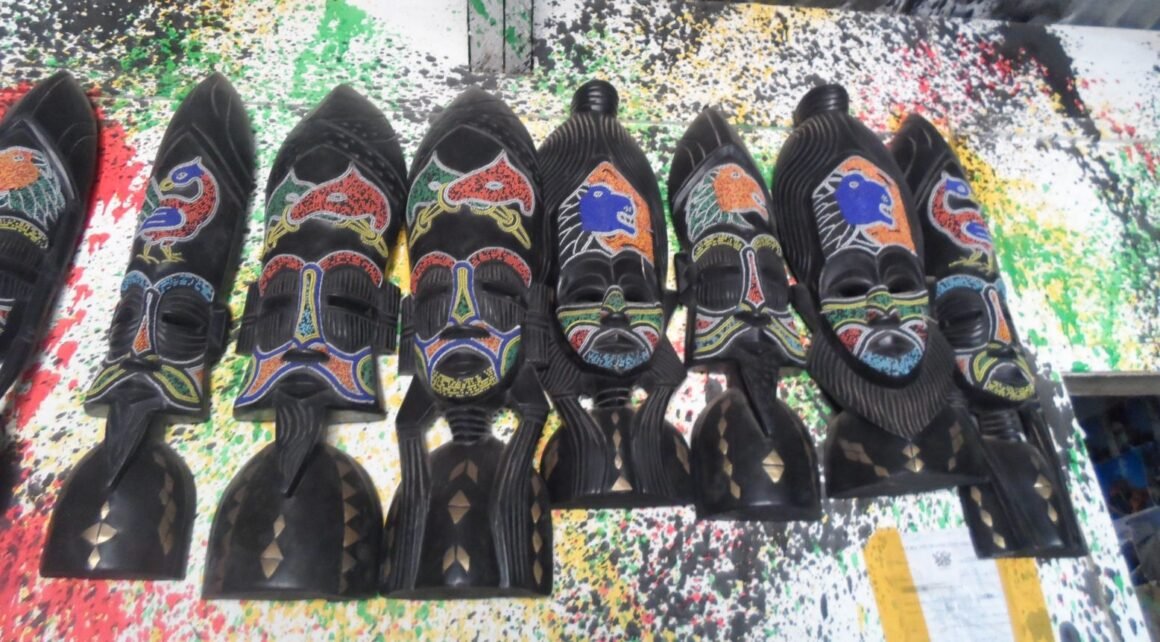
Mohammed Abubakari Ayolga was busy marketing his wood carvings to prospective buyers, so all efforts to get his attention when I got to the Art Centre proved futile. That gave me an opportune time to feast my eyes on the various types of wood carvings and artworks displayed at the Art Centre from diverse groups of artists and wood carvers across the nation.
I must say, the Art Centre is a warehouse for beautifully crafted pieces, from wood carvings to drums, woven handbags, jewelry boxes, necklaces, flower vases, and so much more.
After admiring these beautiful carvings on display, I had to sit for a while since he was still busily attending to prospective buyers. As I quietly sat on that wooden chair between two wooden stalls, my keen desire was just one - I wanted to find out more about wood carvings and how the business is going. After Abubakari had satisfied his customers, he turned to speak to me, and I quickly made my intentions known to him. But before that, he asked if I wanted to buy anything, to which I answered in the affirmative. Though his facial expression dropped, he didn't hesitate to take me around his shop, pointing out each wood carving, its name, and what it is used for.

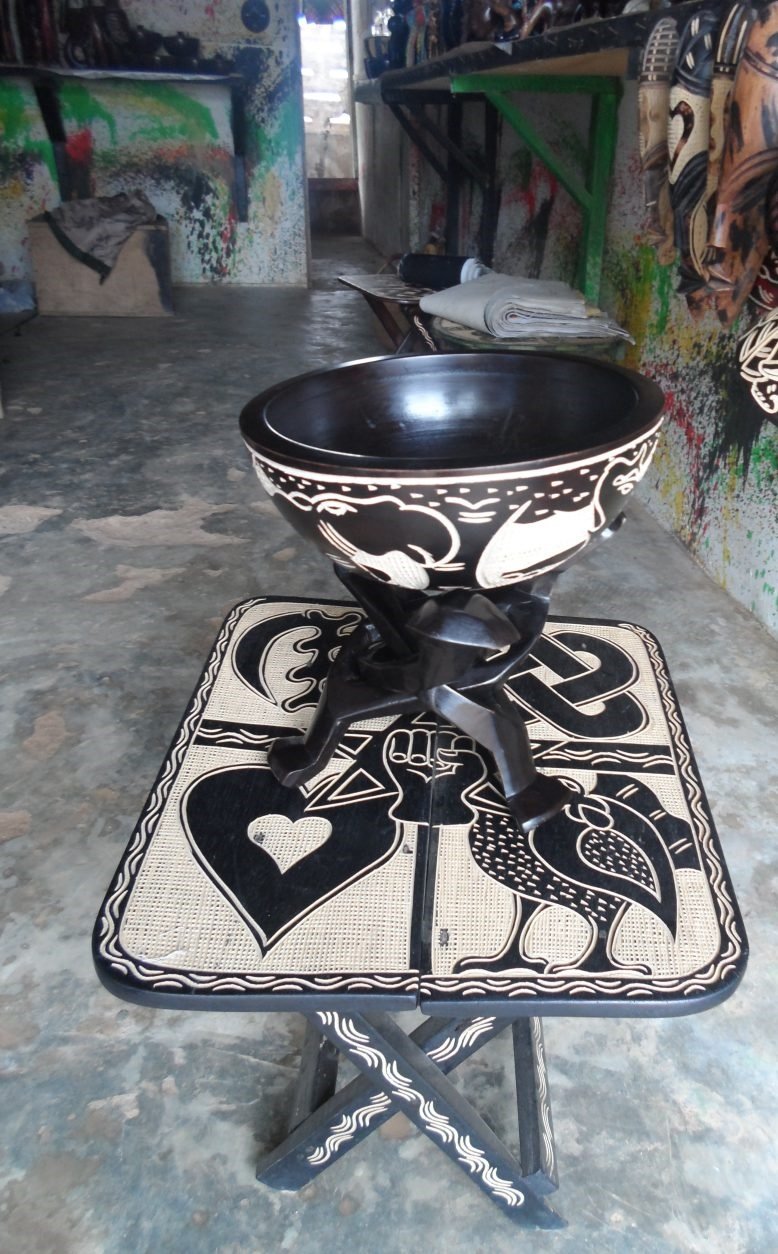
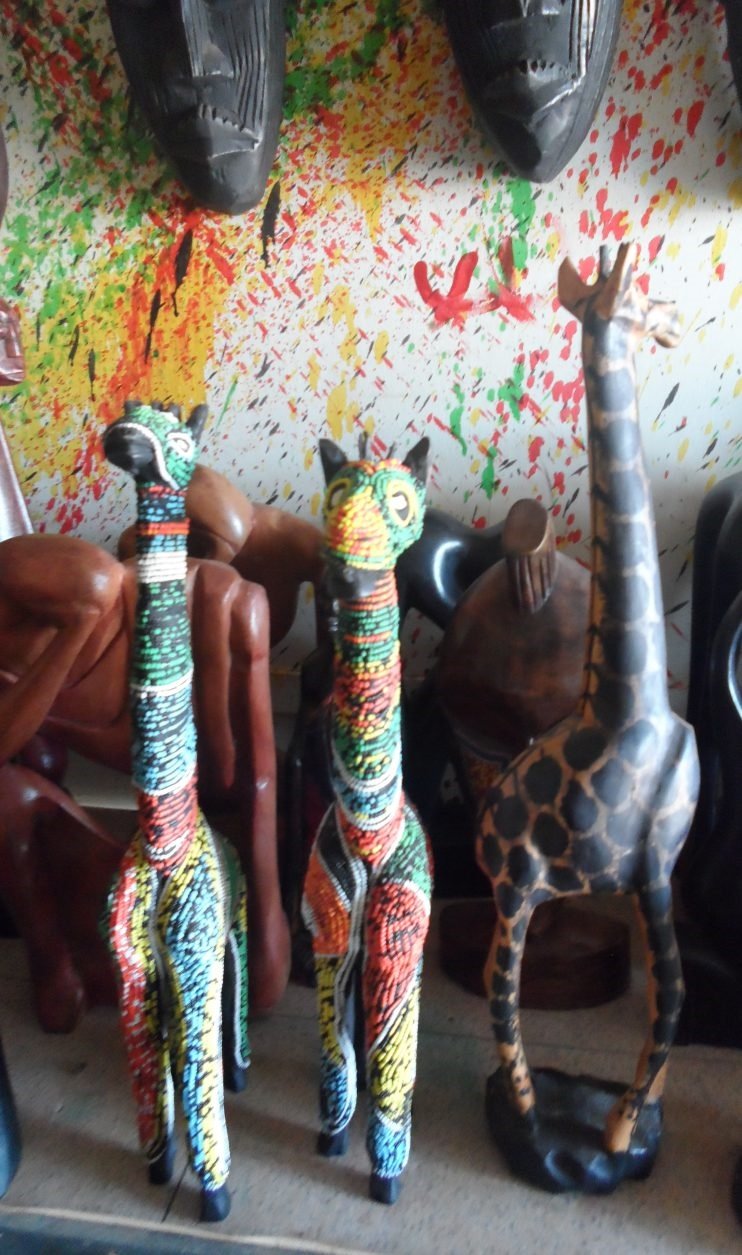
Abubakari wanted me to buy a woven basket that cost GH₵60 as an appreciation for taking time out of his busy schedule to show me around. However, that was impossible because I hadn't budgeted for it, so I promised to come back again and shop for everything wood carving-related.
What emerged from our chat is that their customers are usually foreigners and tourists, meaning locals do not purchase locally made products from the Art Centre, slowing down business. According to him, Ghanaians rather prefer goods from China to products produced in their homeland.
When Ayolga was asked what he thought the reason for locals not purchasing wood carvings and other products from the center was, he said they usually say the products are much more expensive compared to similar ones from China.
Mohammed Abubakari Ayolga, from Bolgatanga in the Upper West region, started wood carving about 10 years ago. He currently has a shop at the Art Centre where he displays his work to prospective buyers. The Art Centre in Accra, Ghana, is a market space full of stalls selling arts and crafts. Mohammed mainly exports his artworks to every part of the world except Australia. Below are some of his beautifully crafted handiworks.
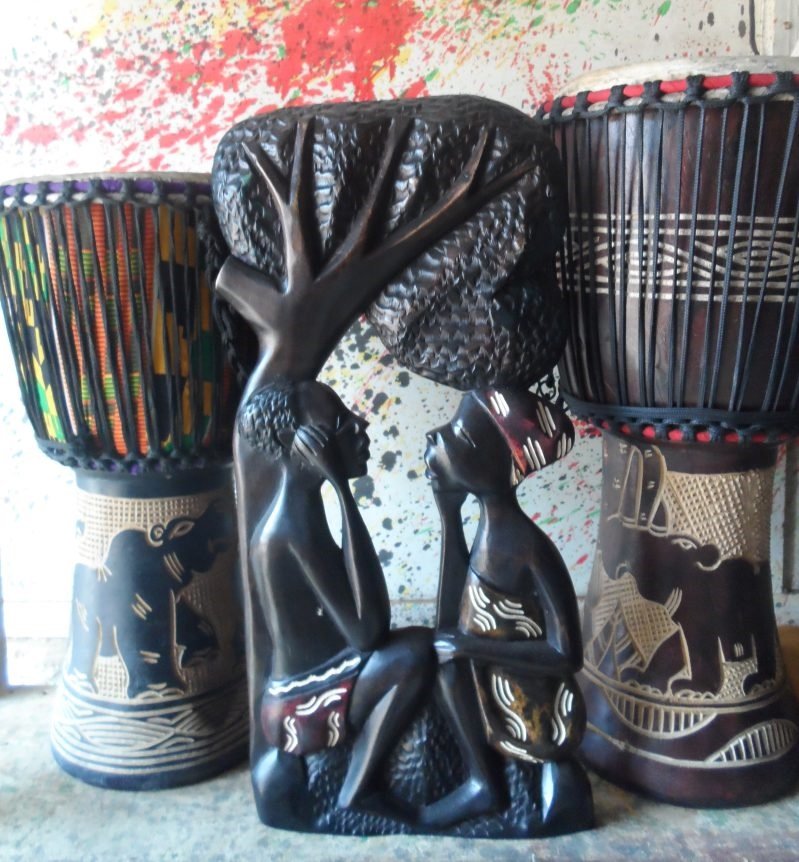
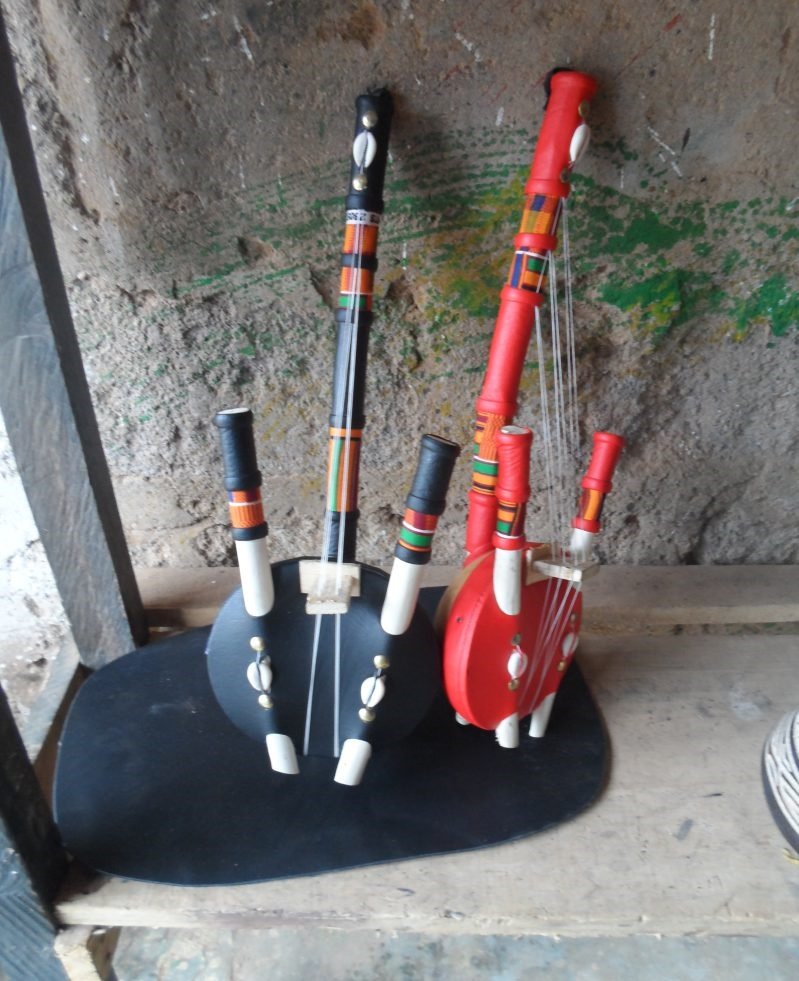
Mohammed Abubakari Ayolgo-0246134191
Subscribe to Neighbourhoodgong magazine; packed with thought-provoking features, and curated picks just for you.